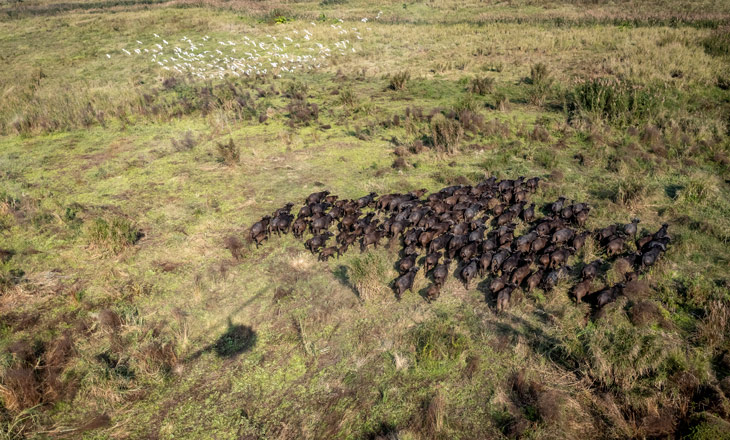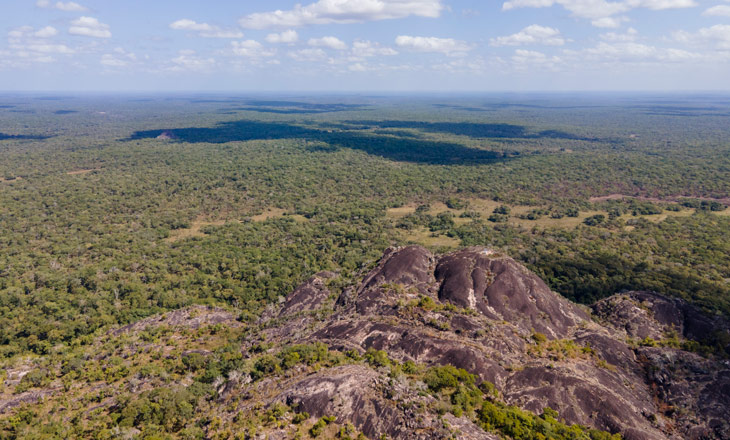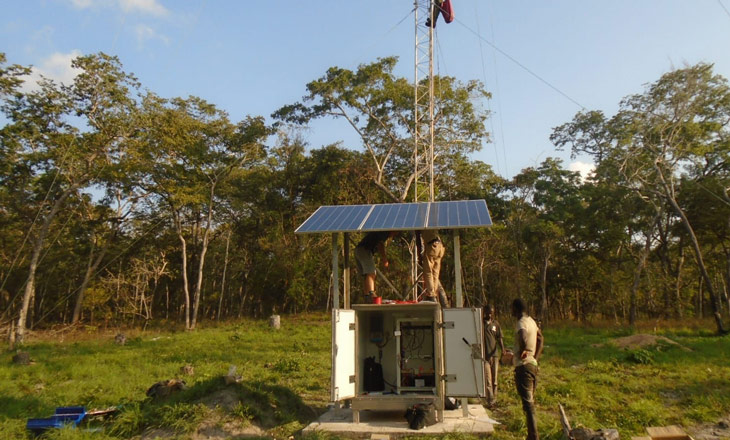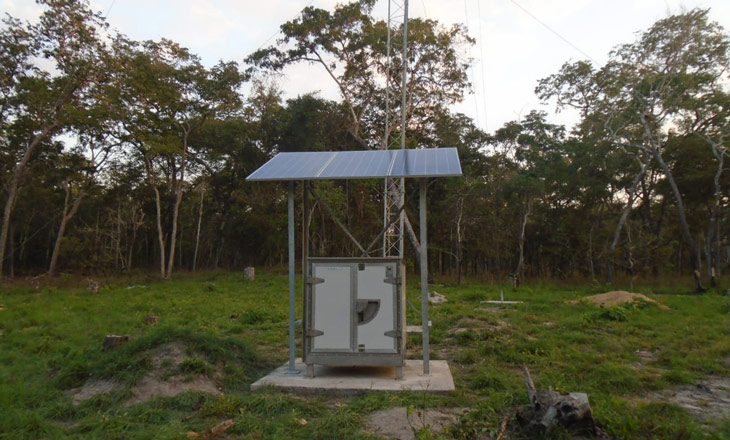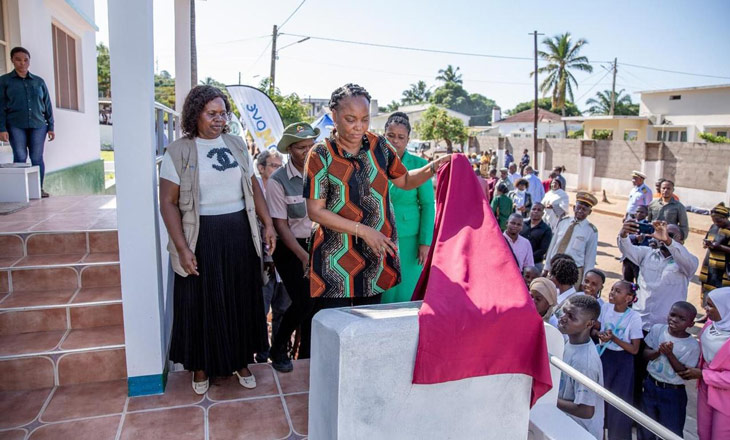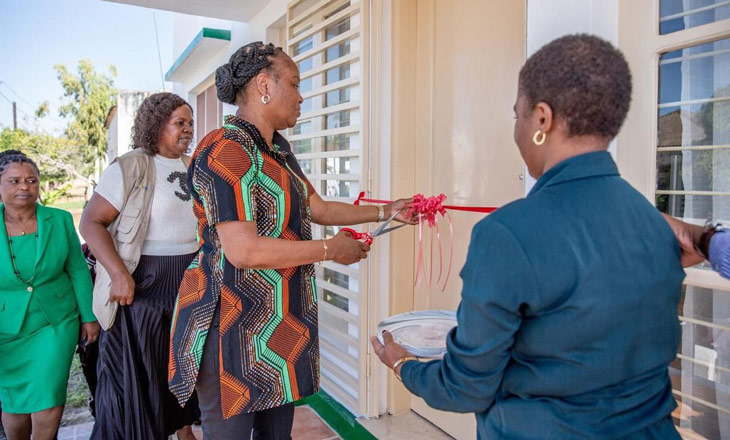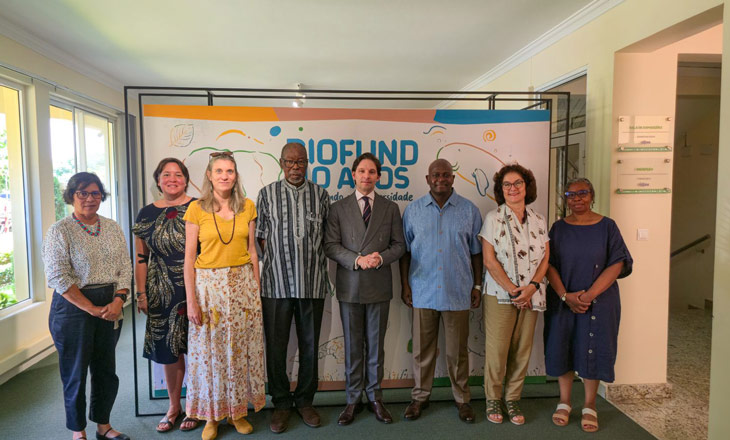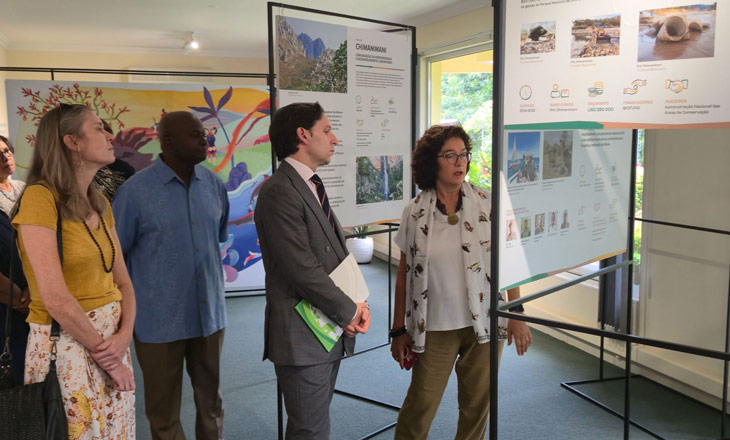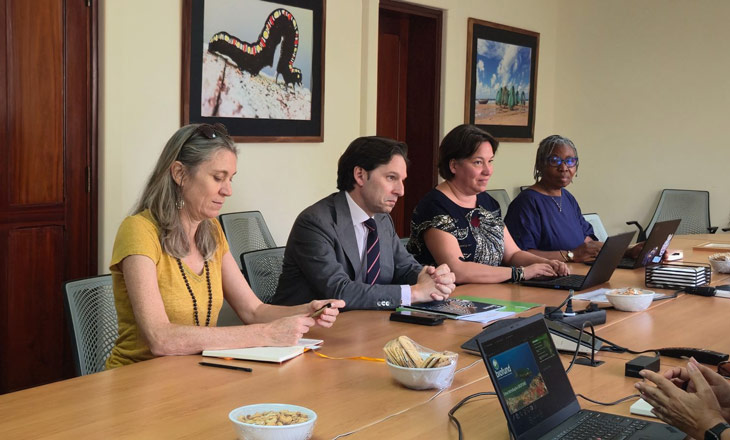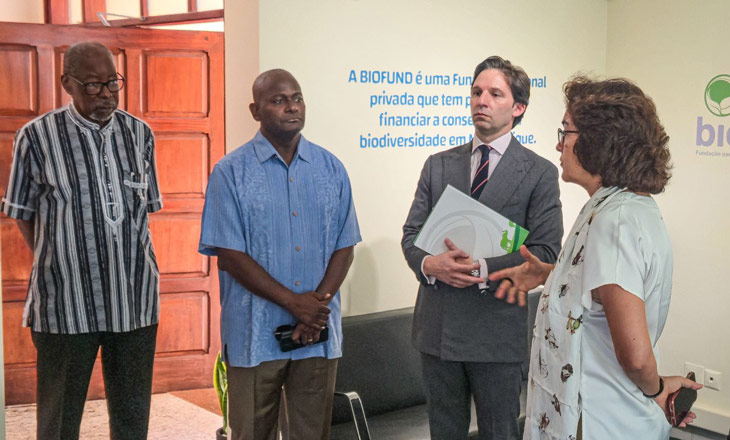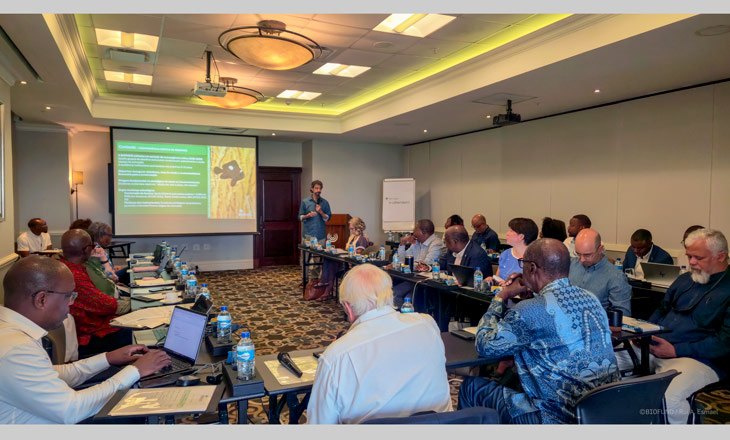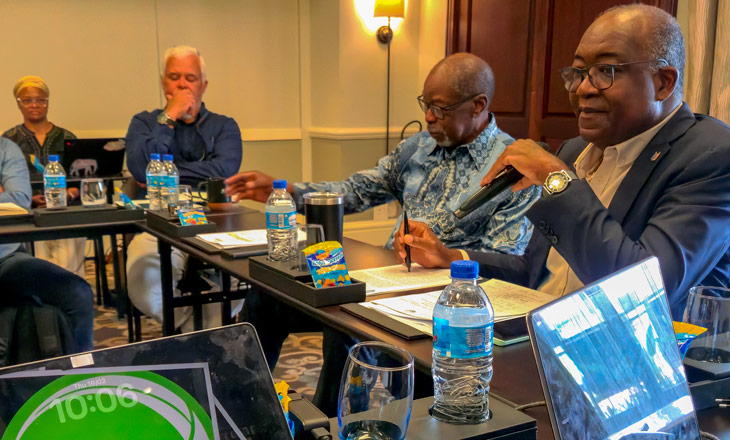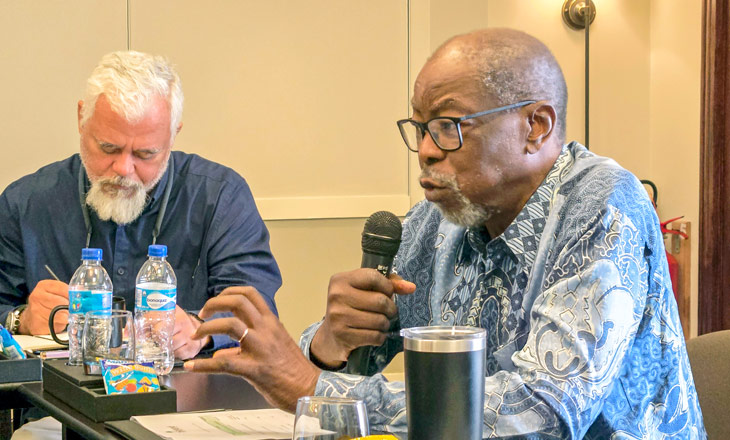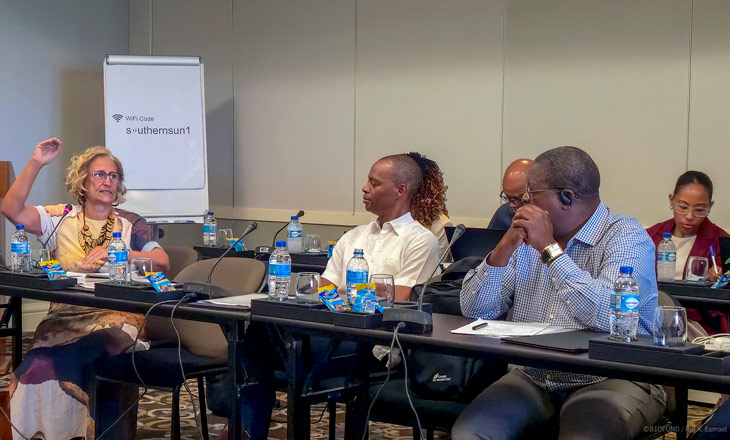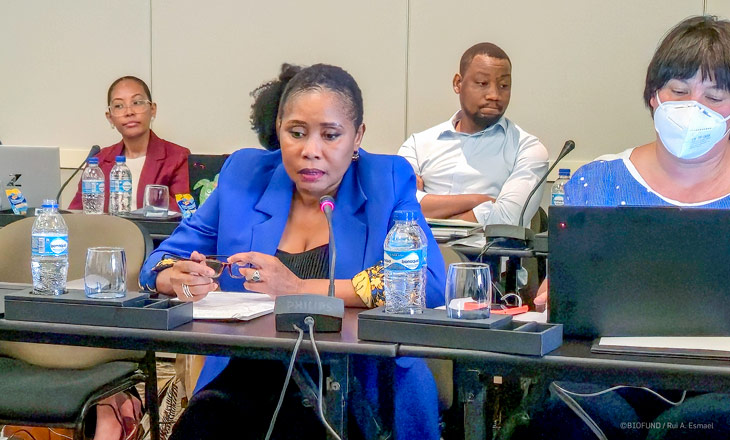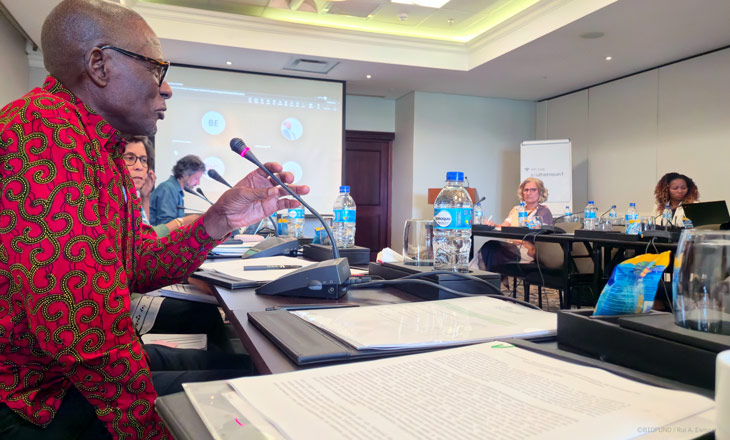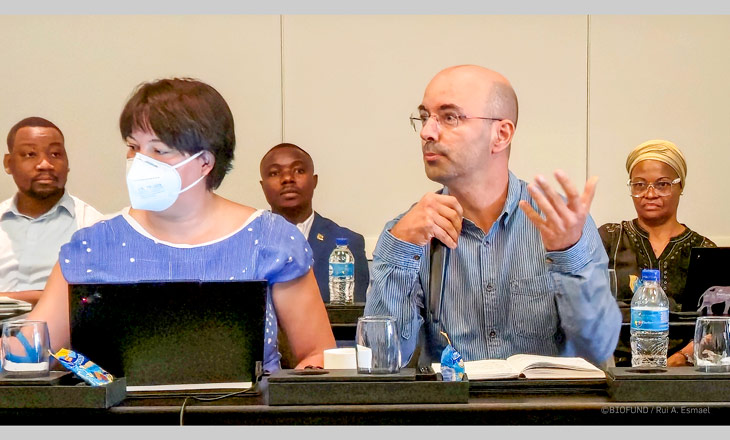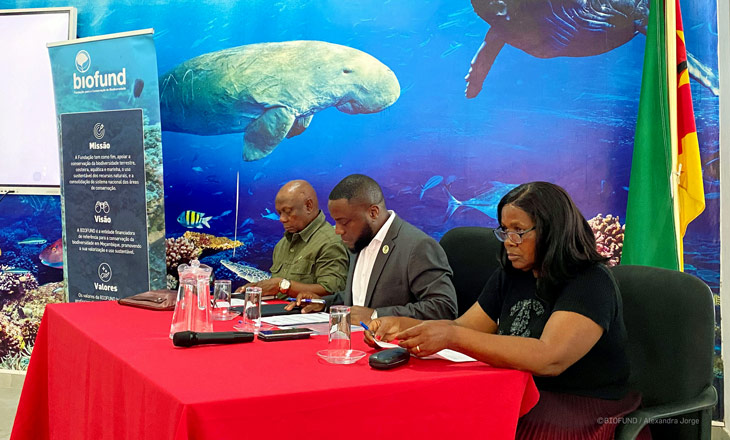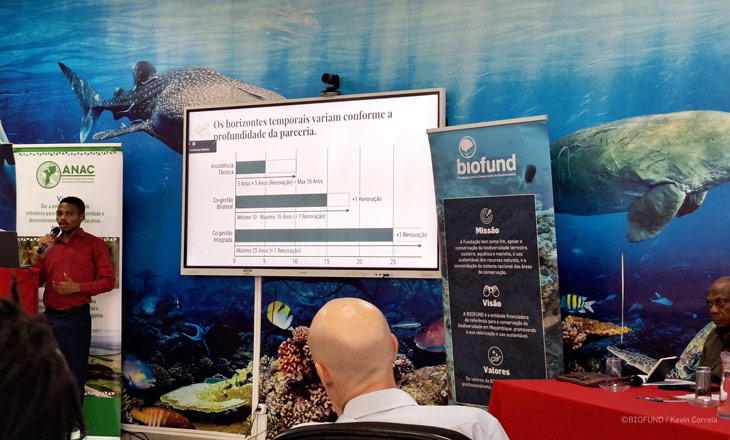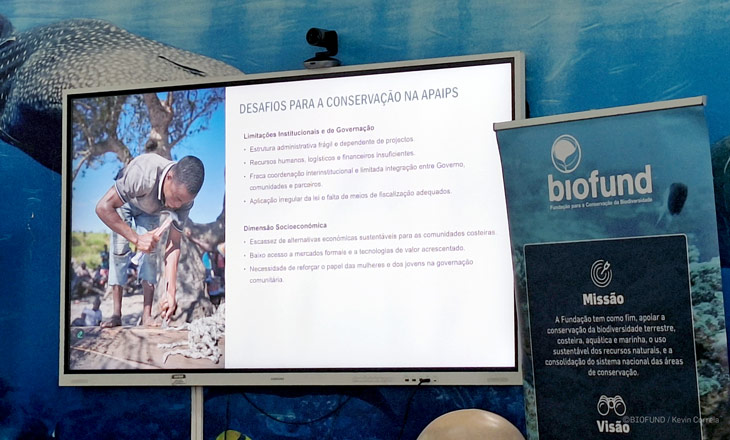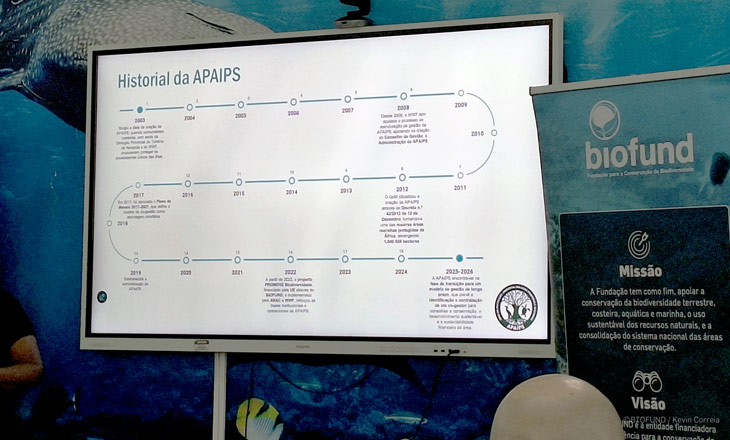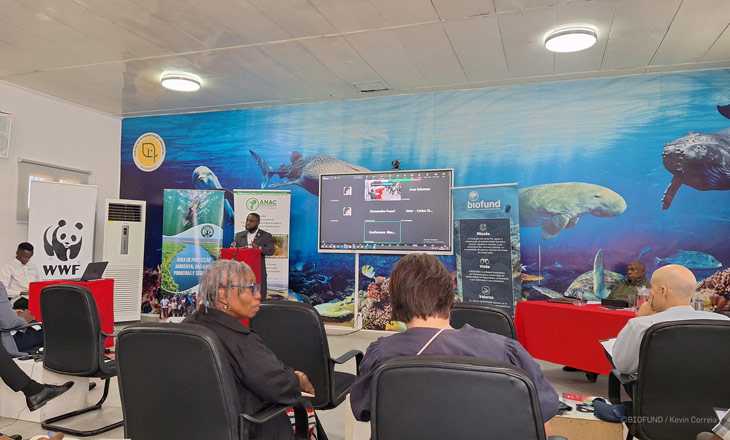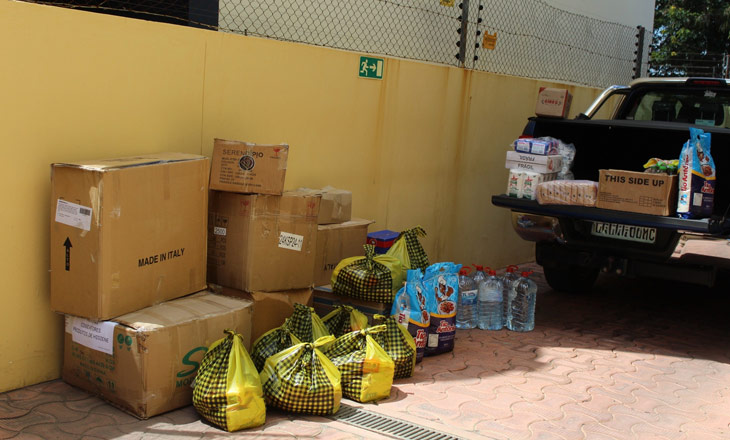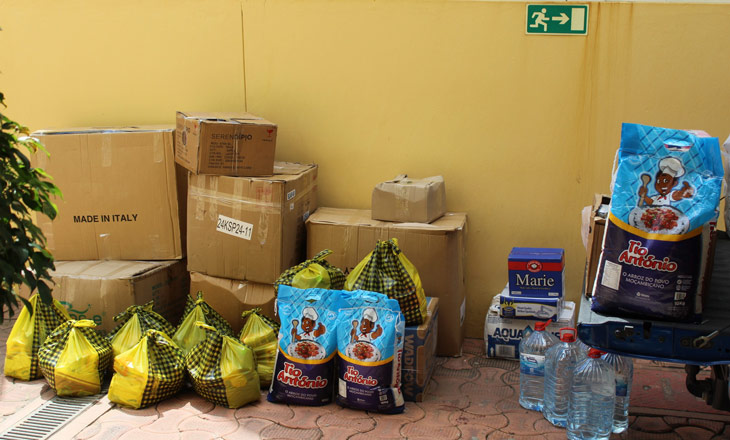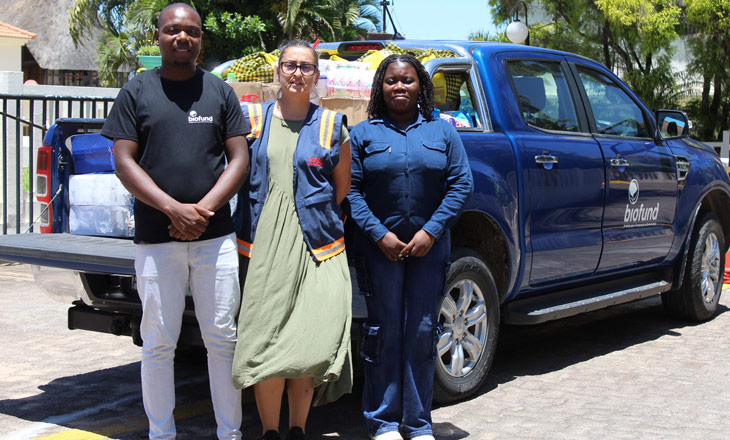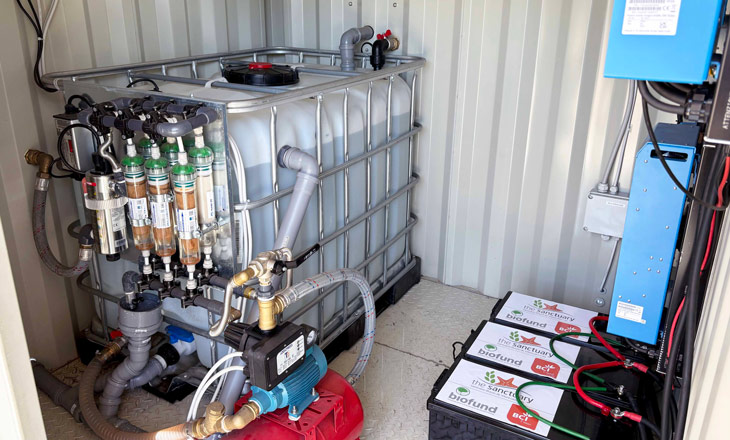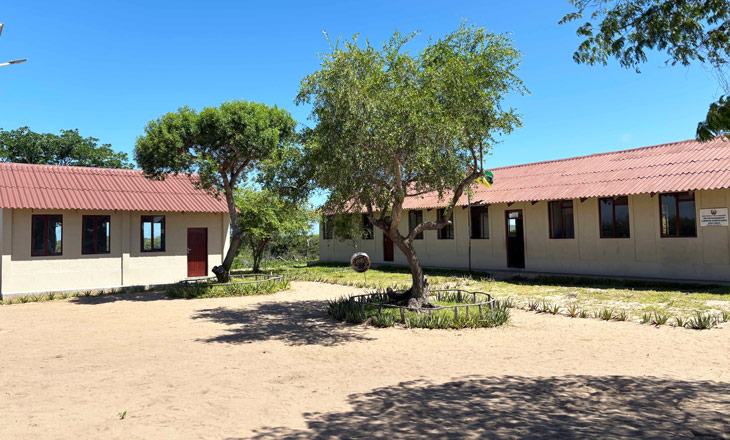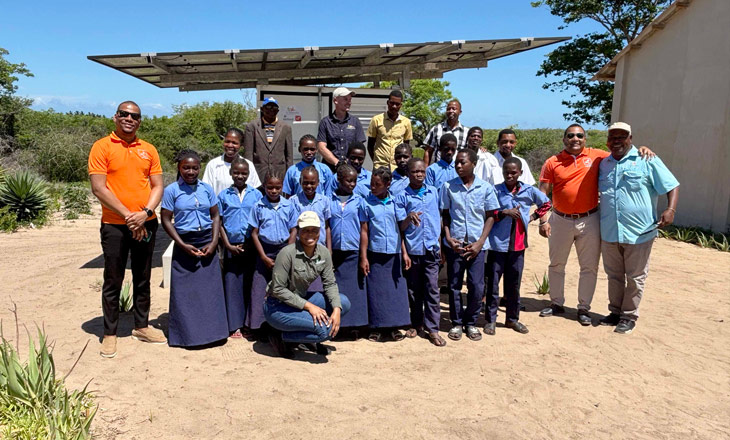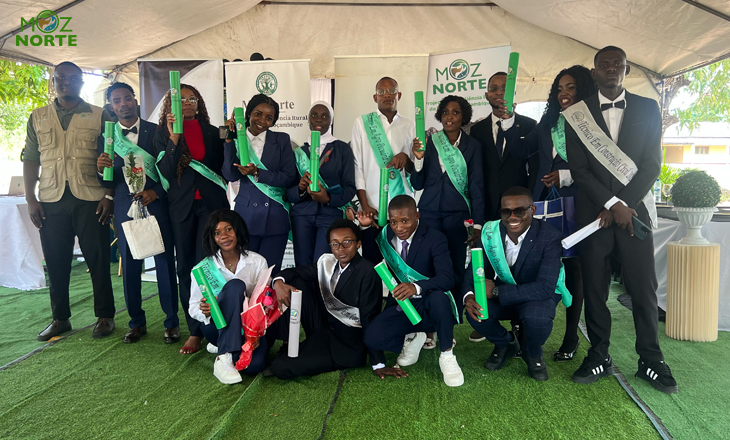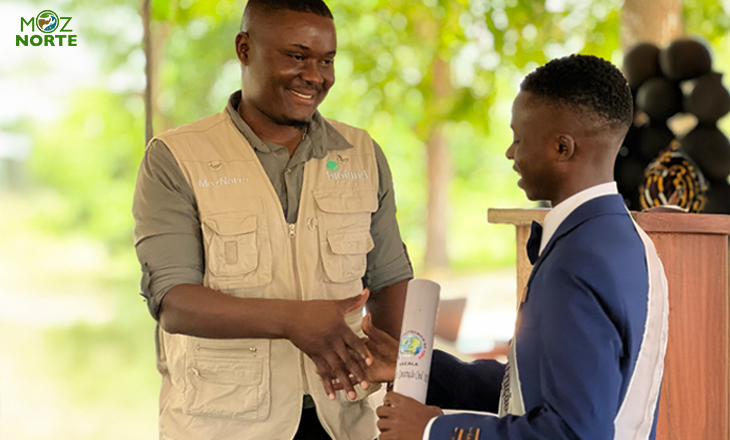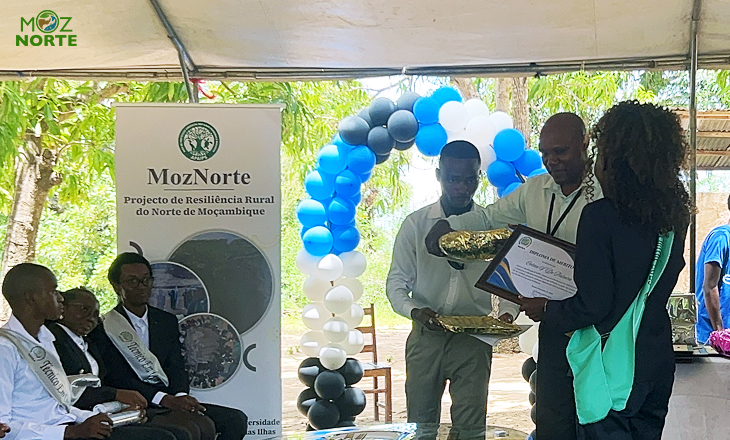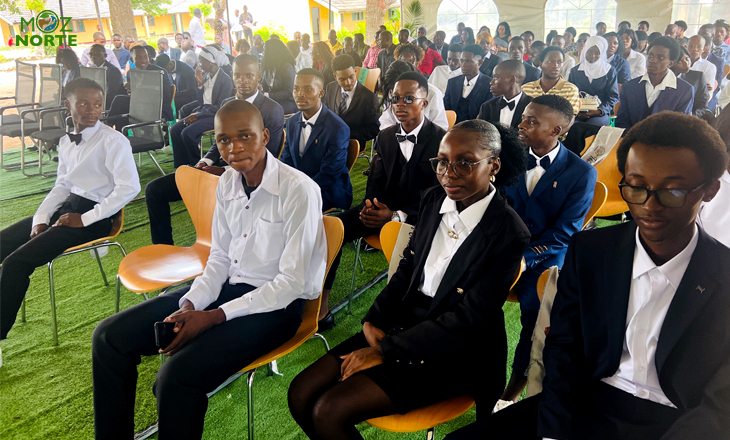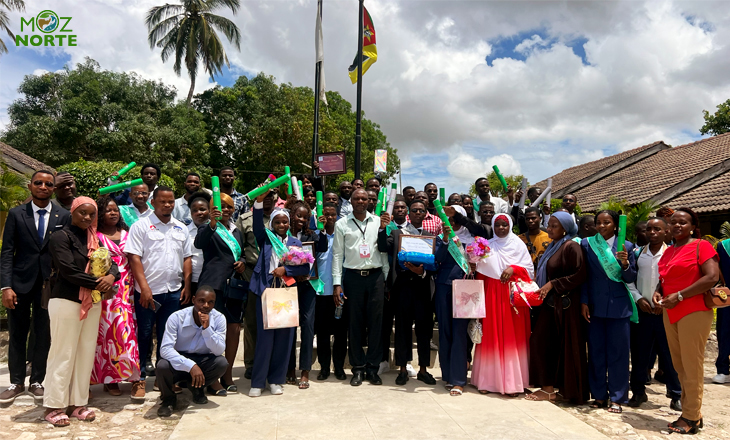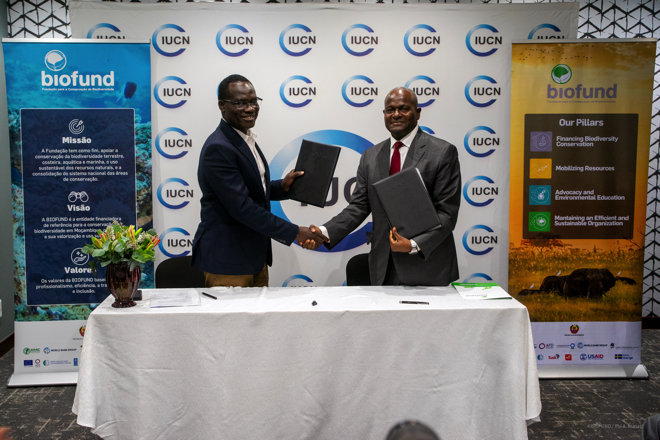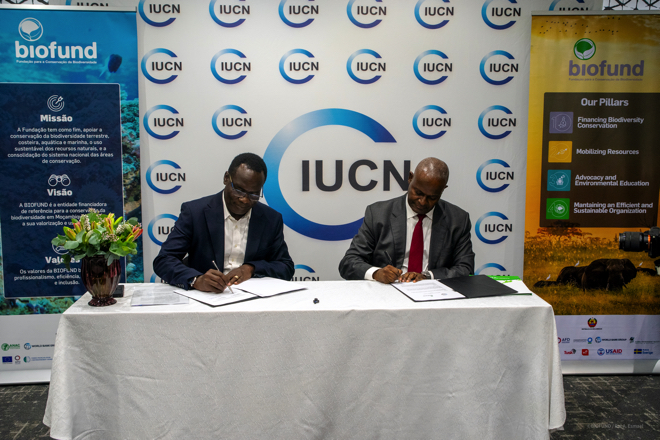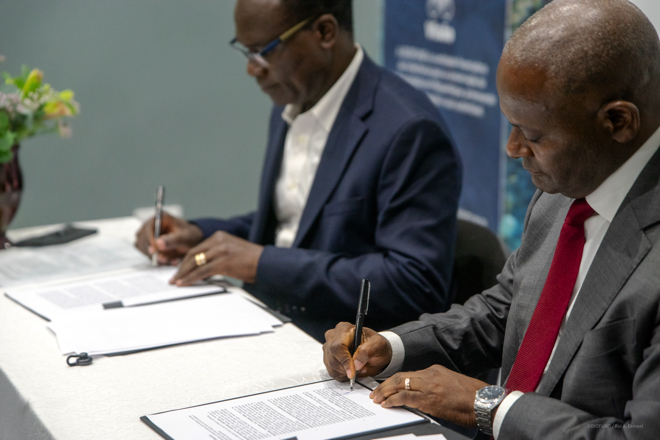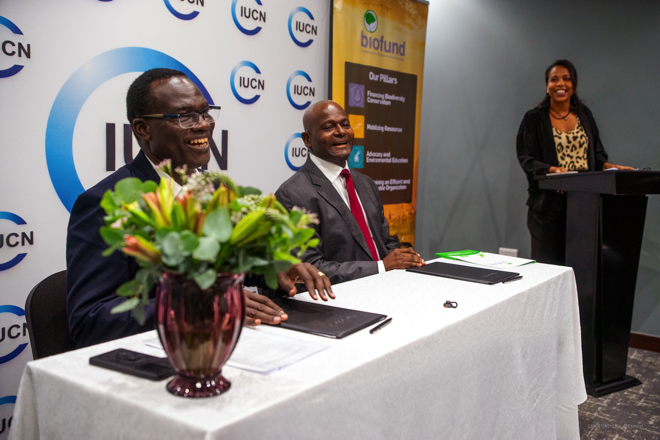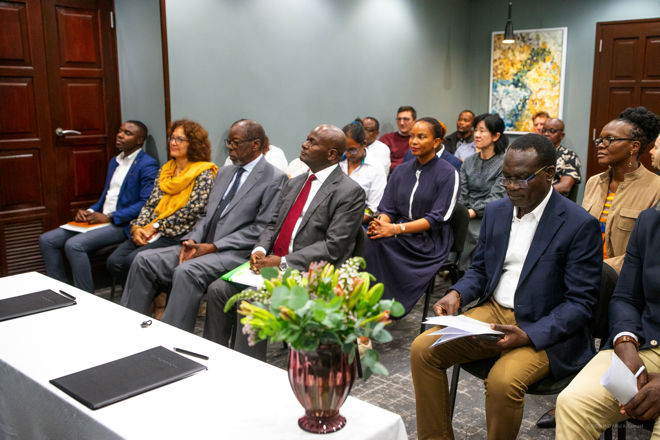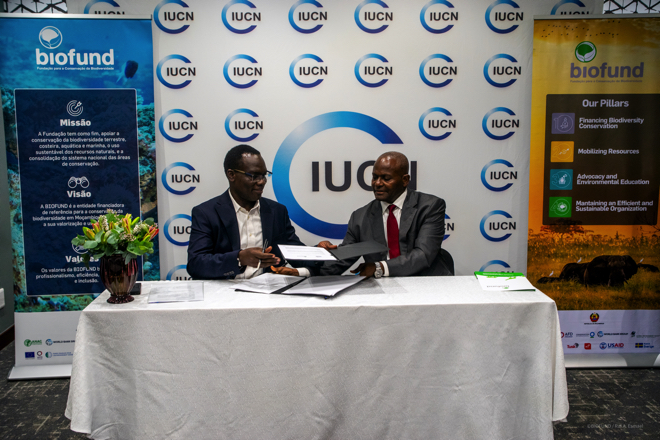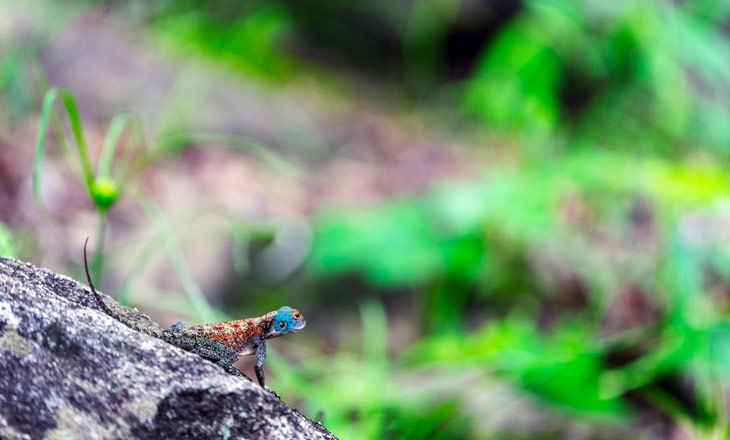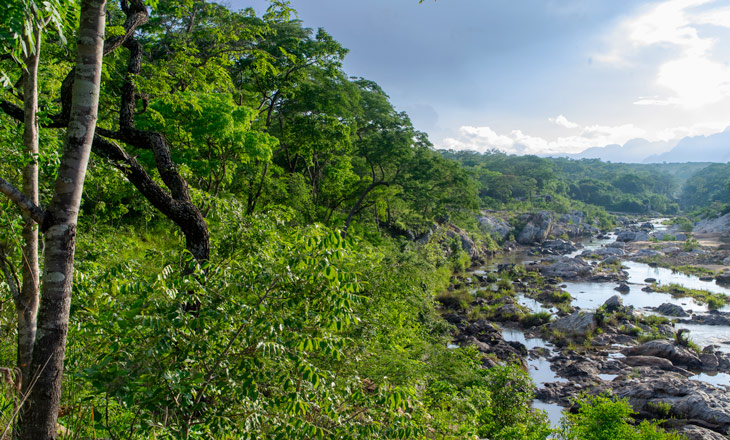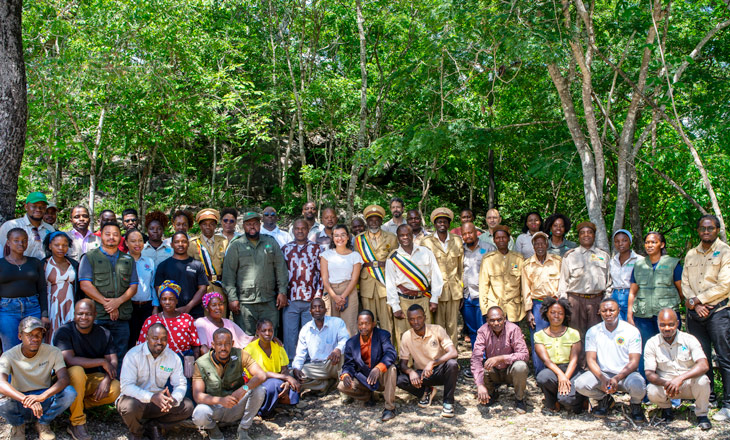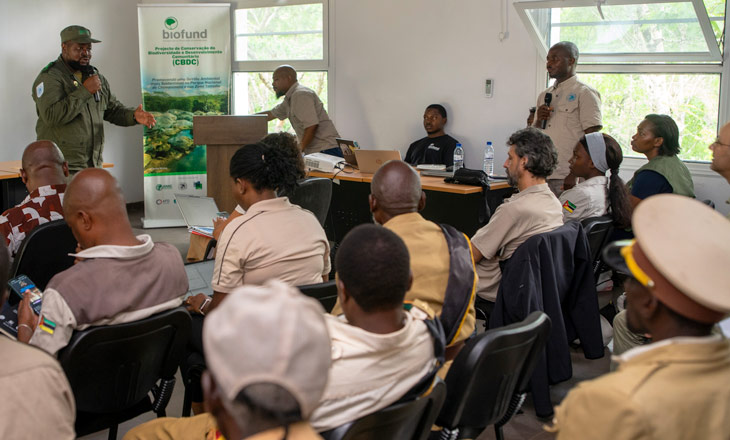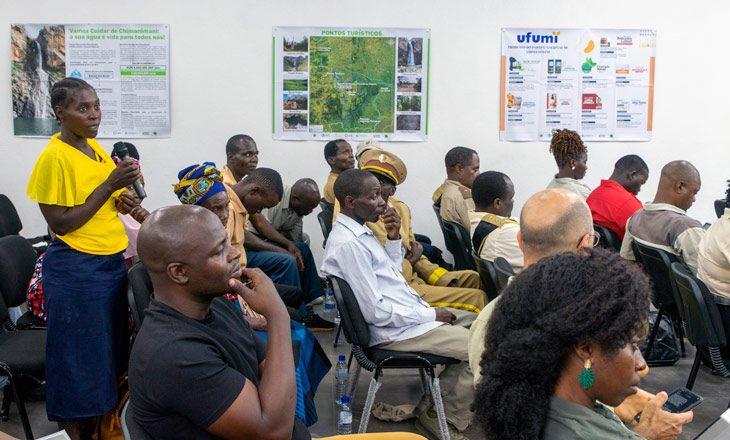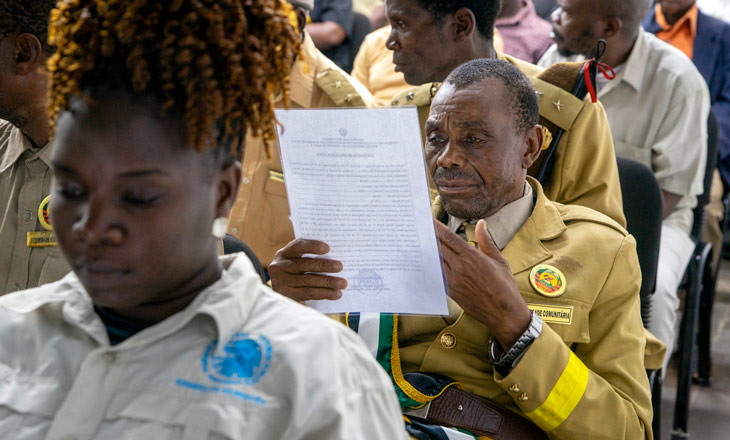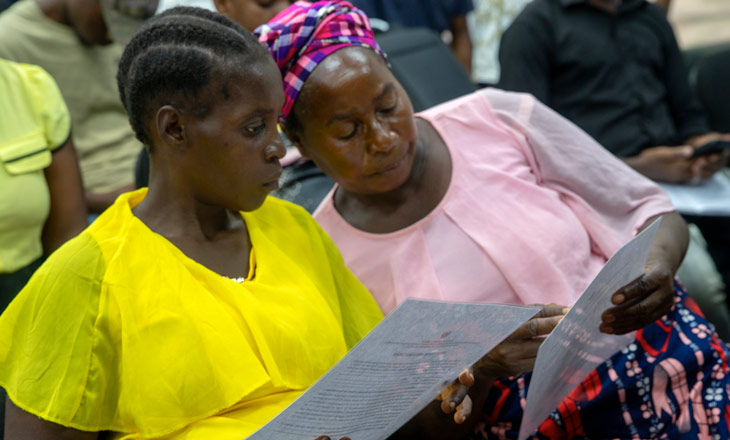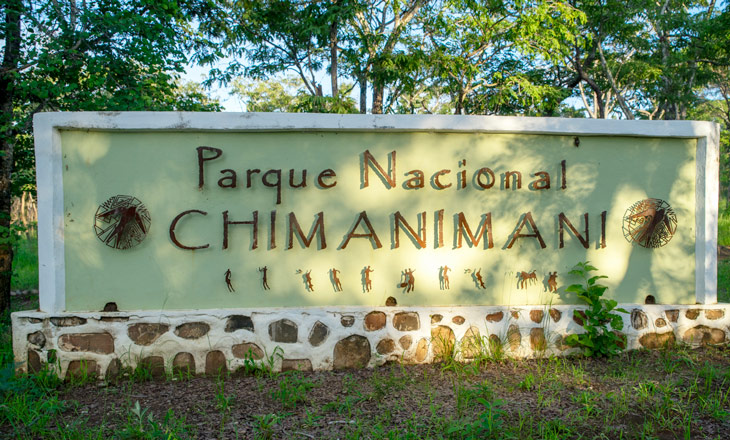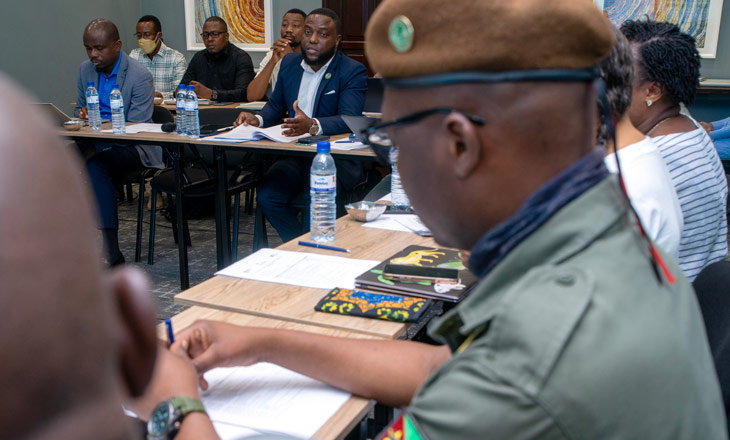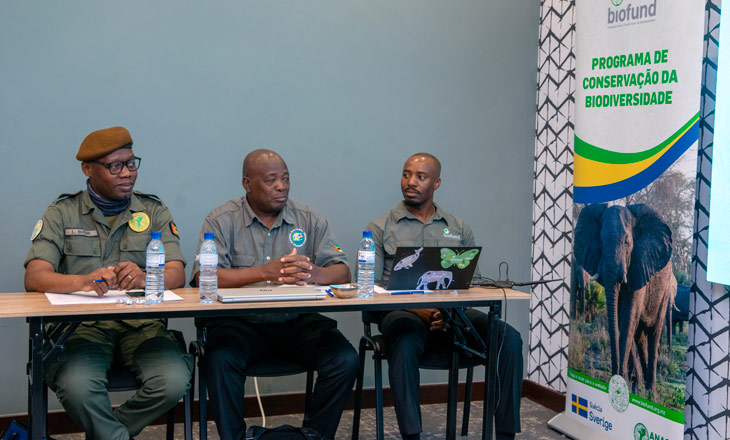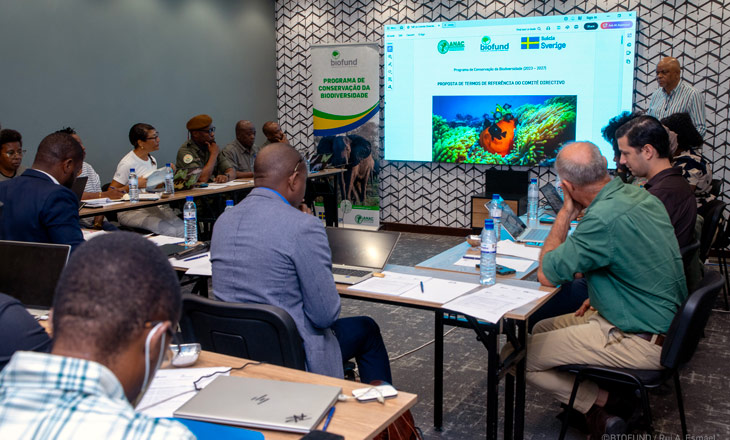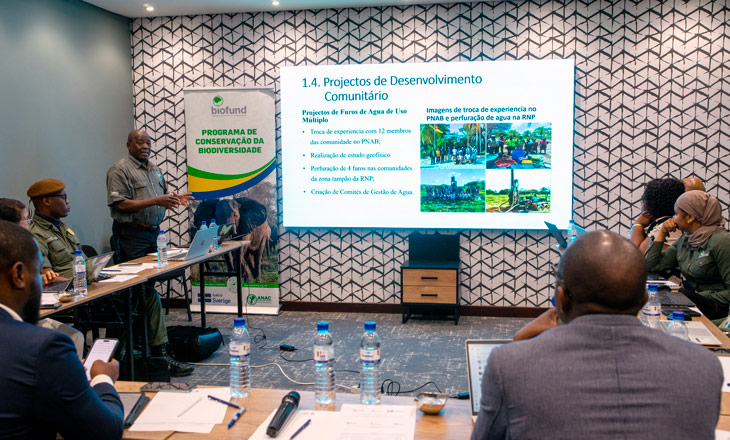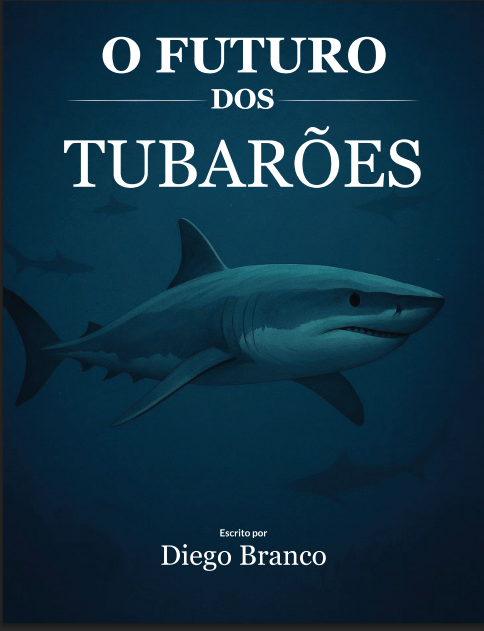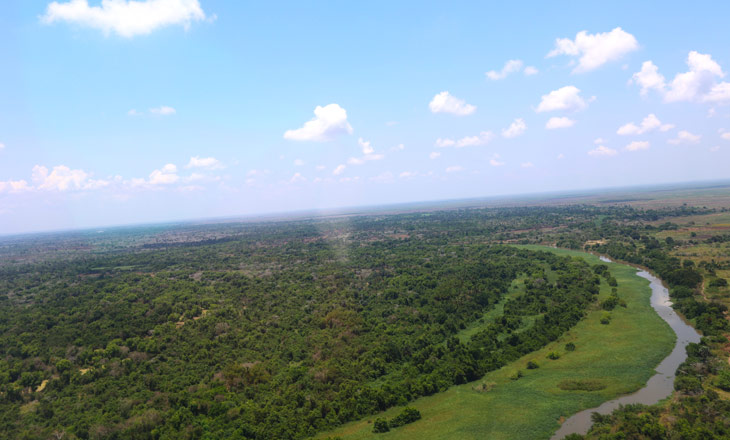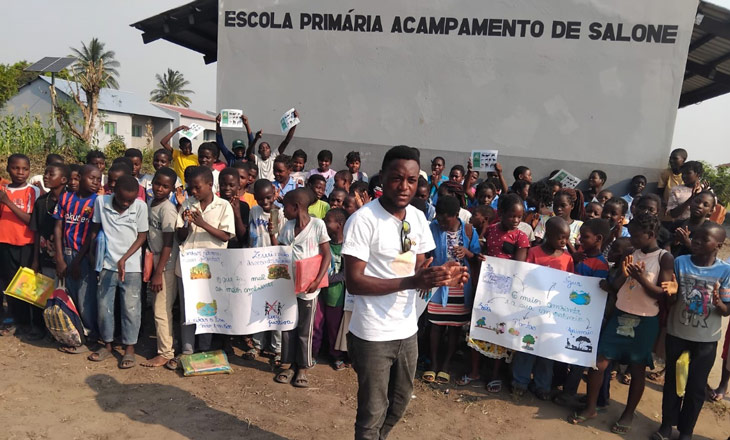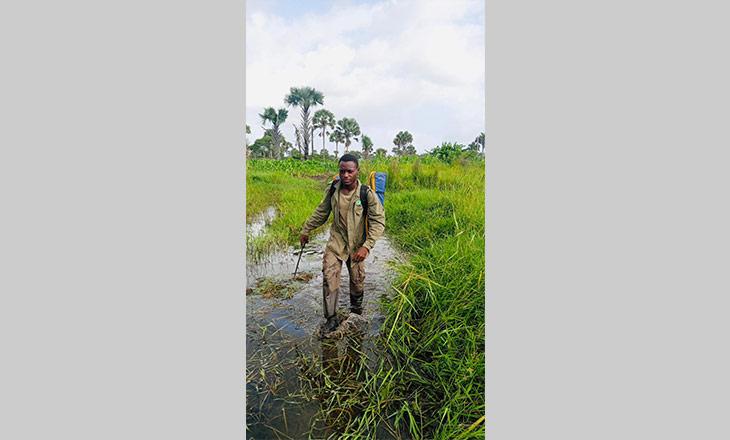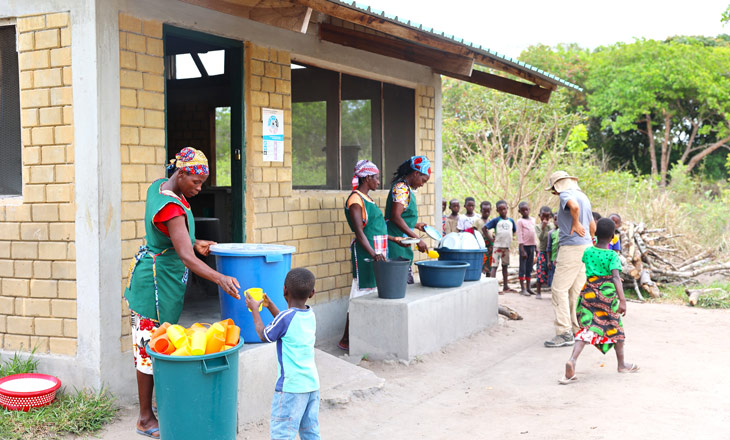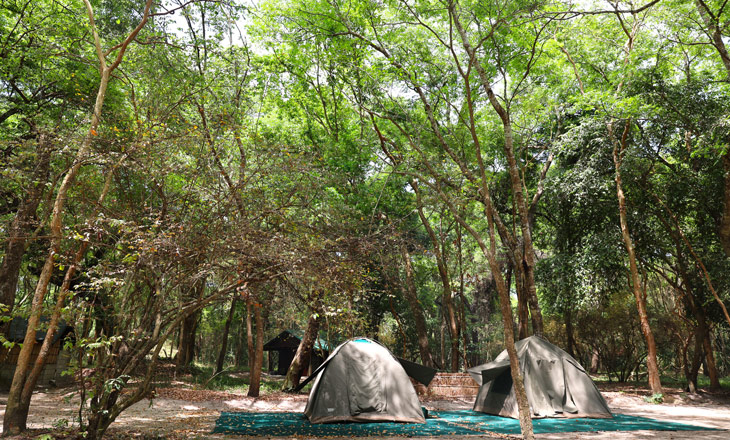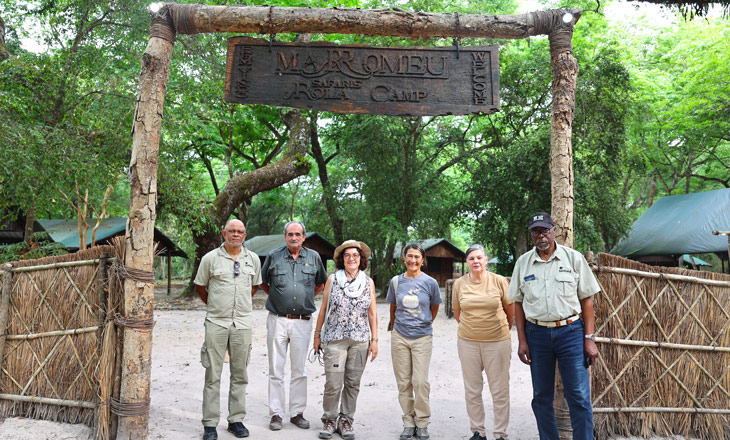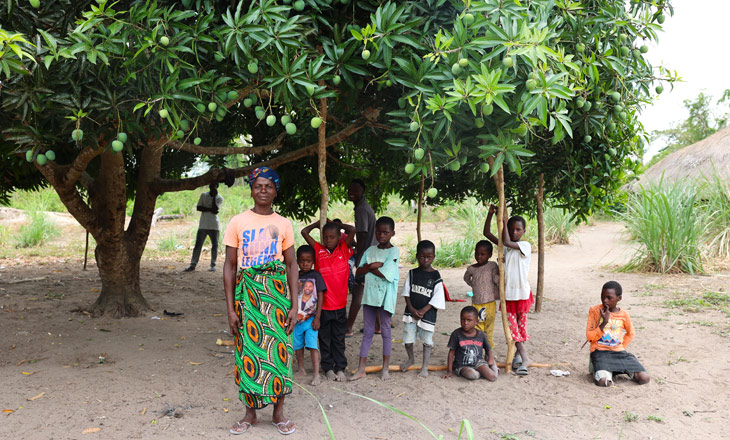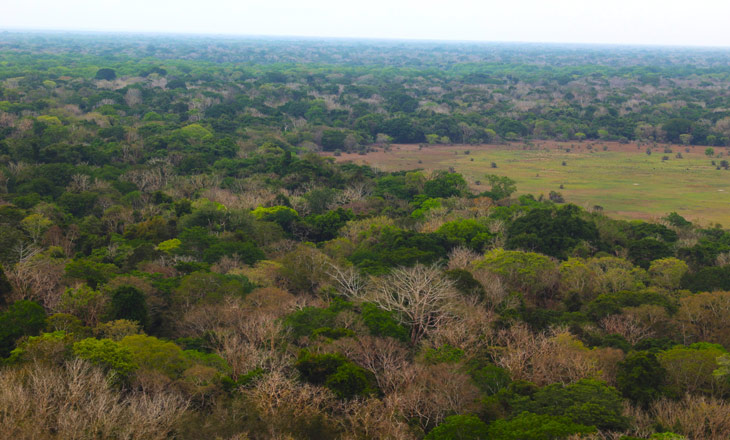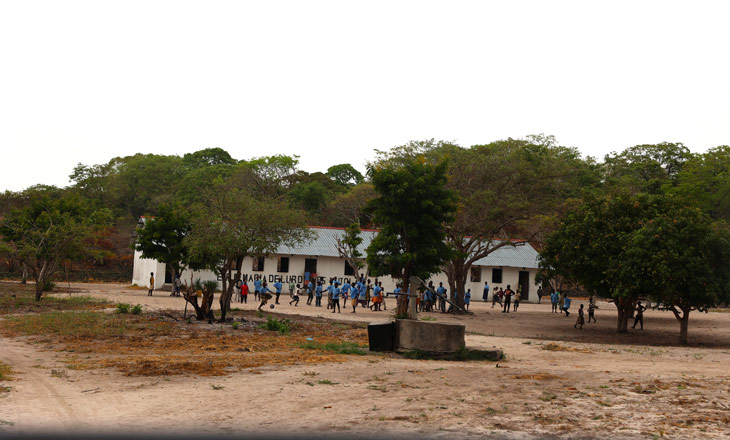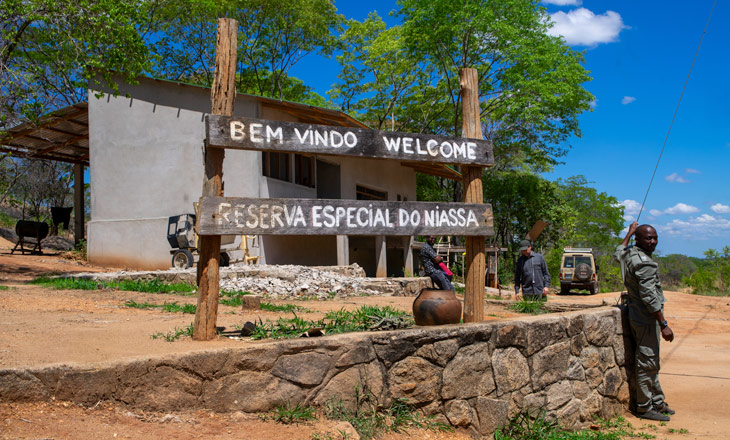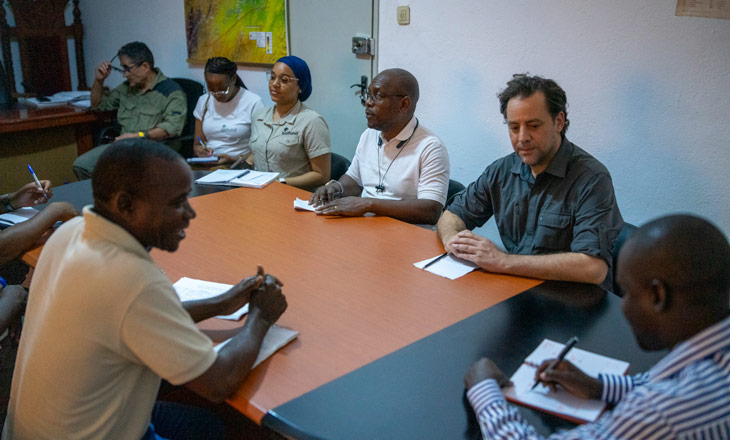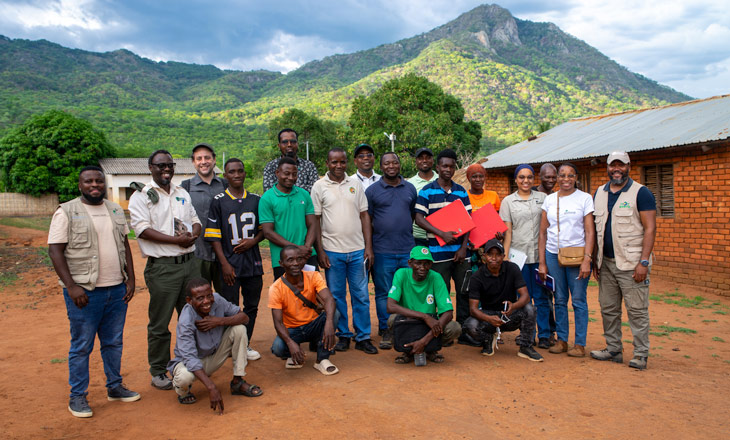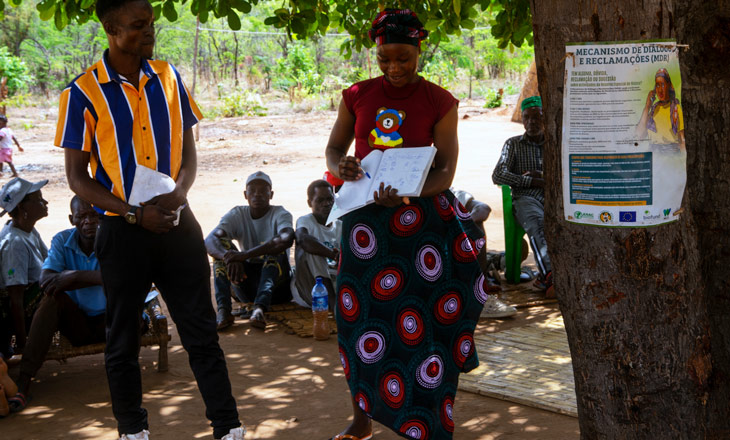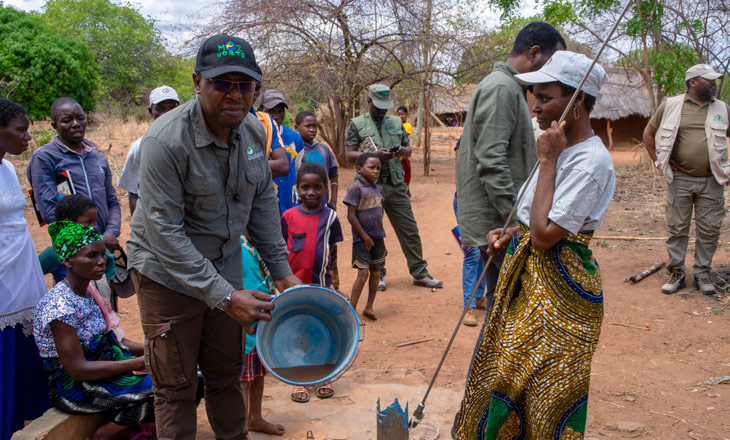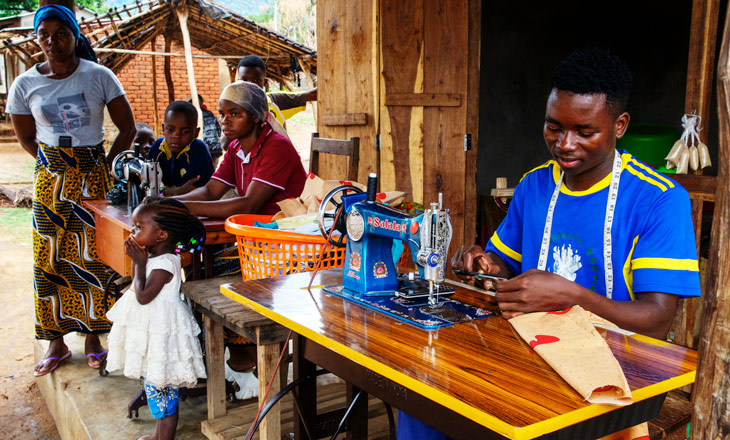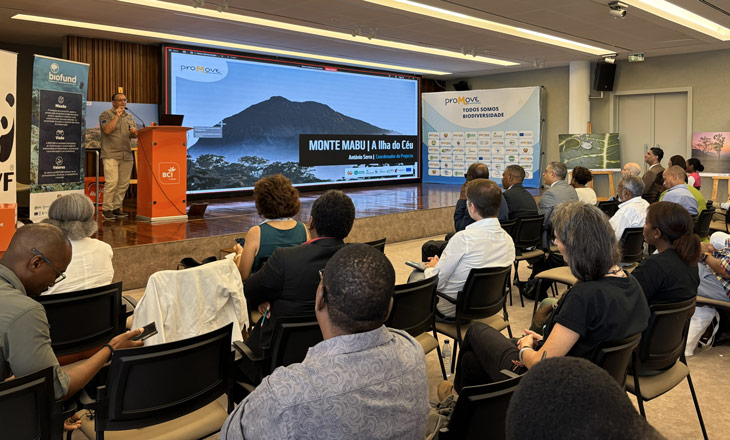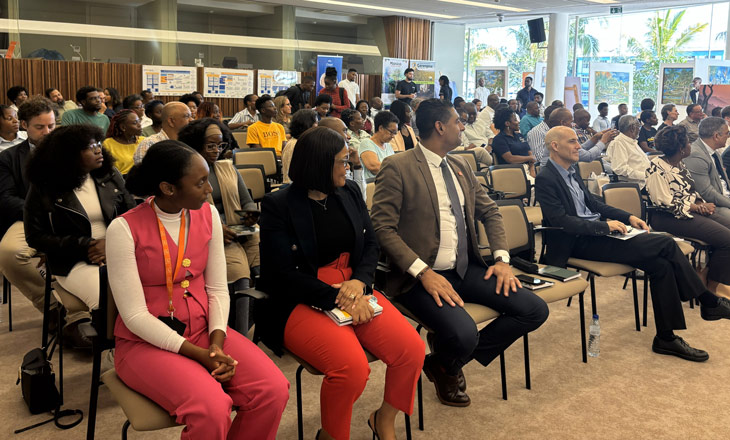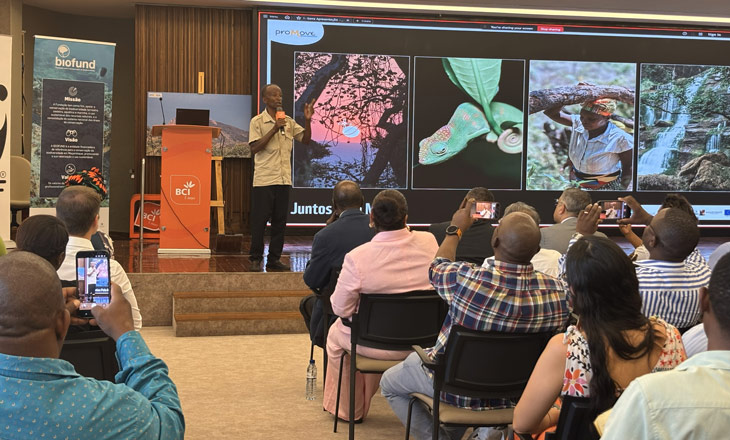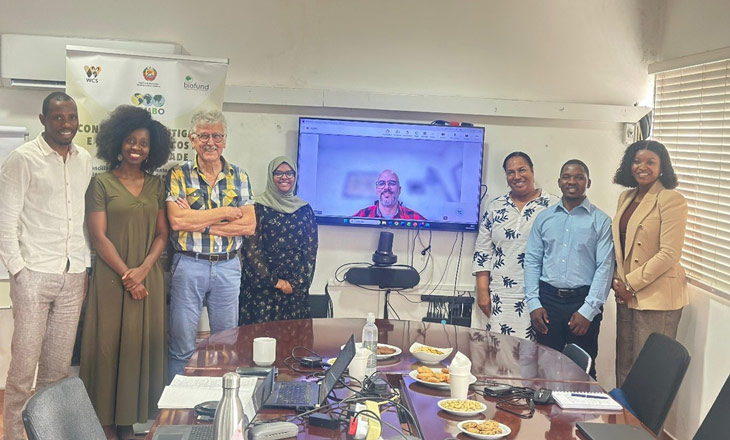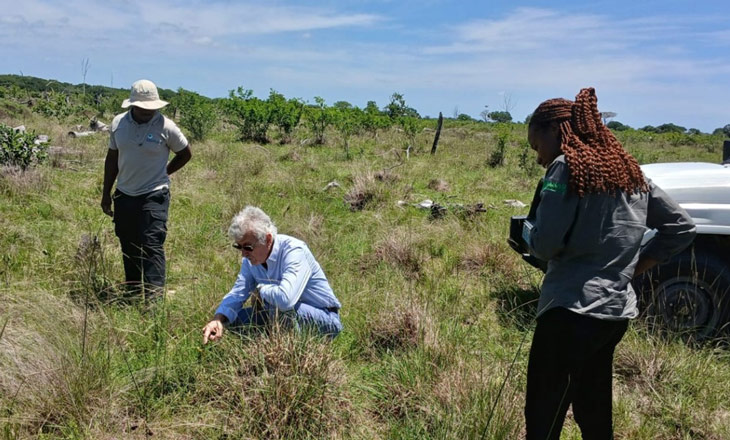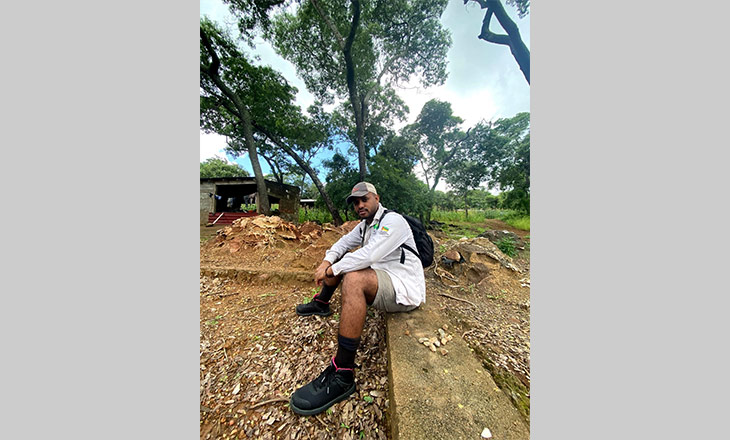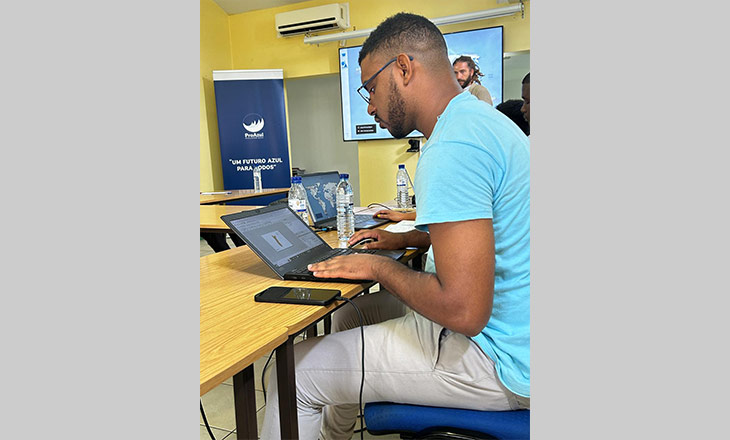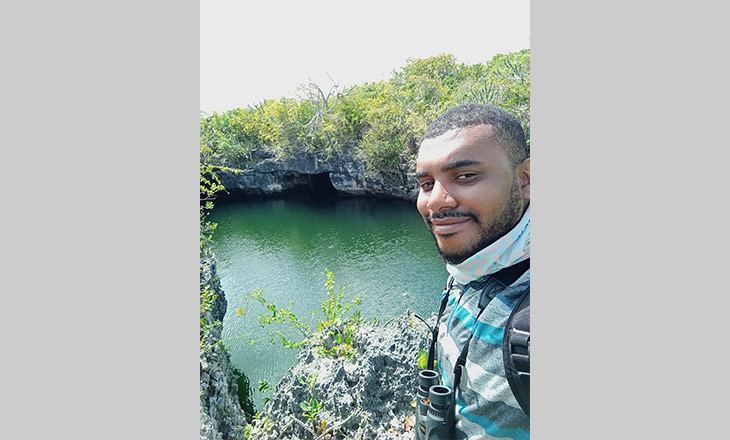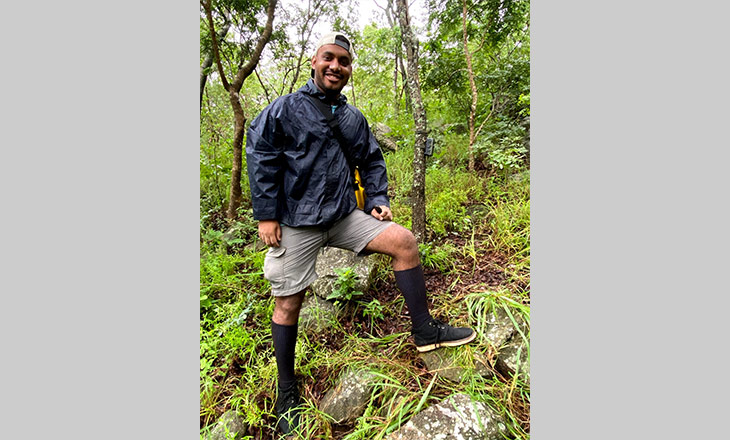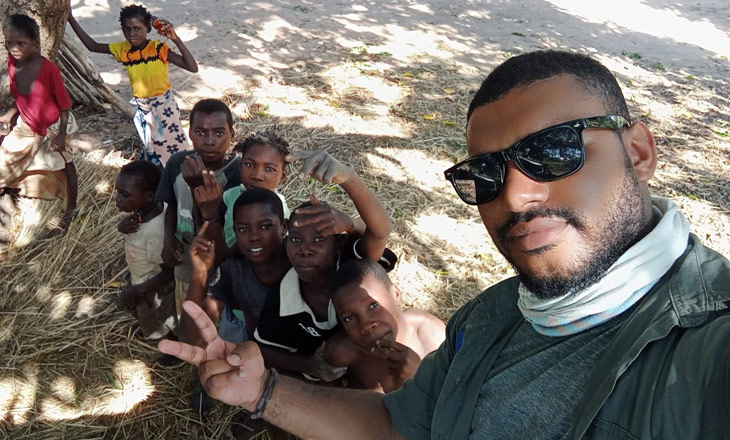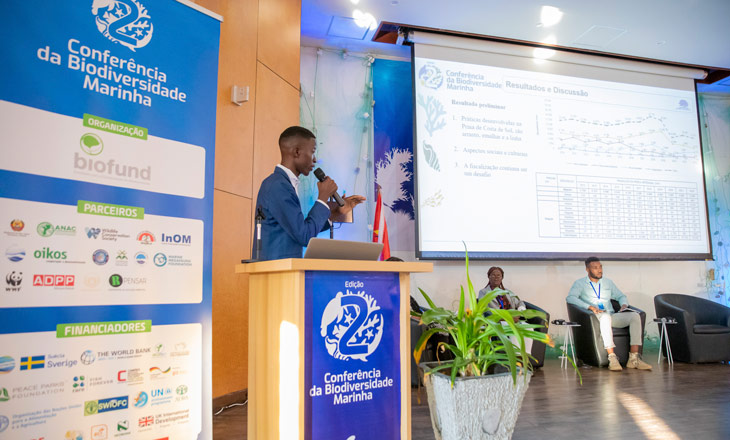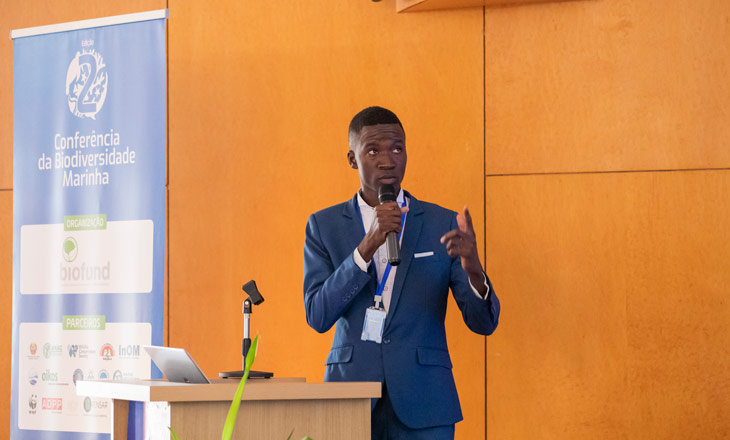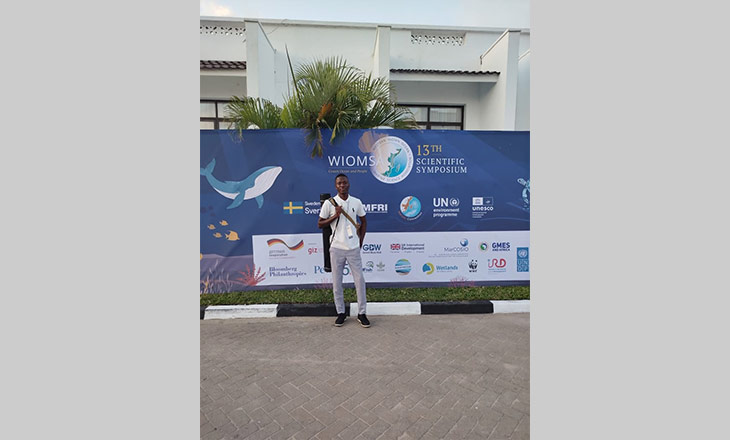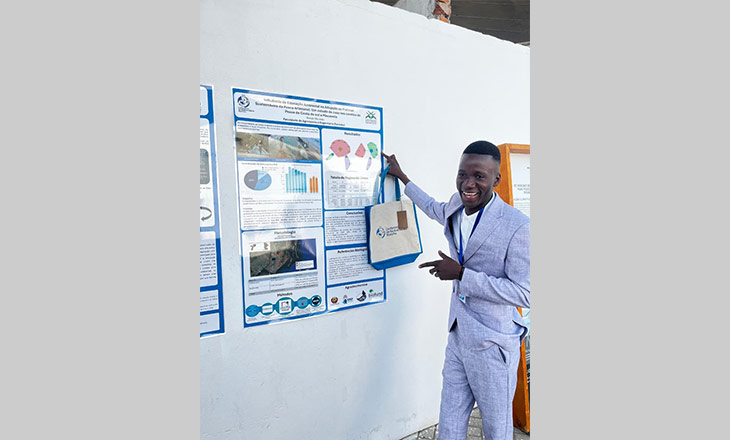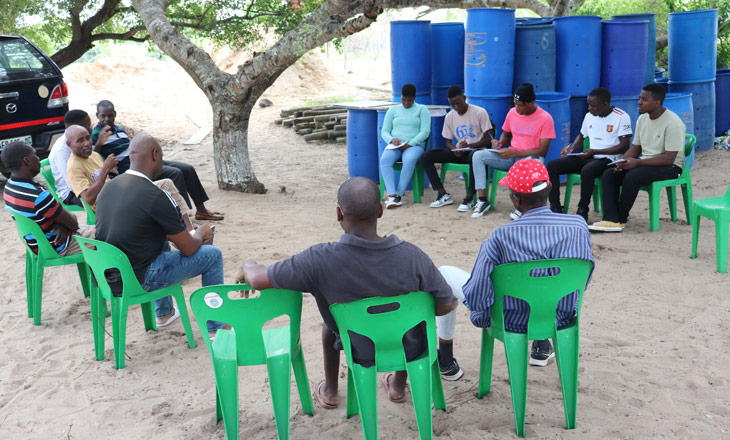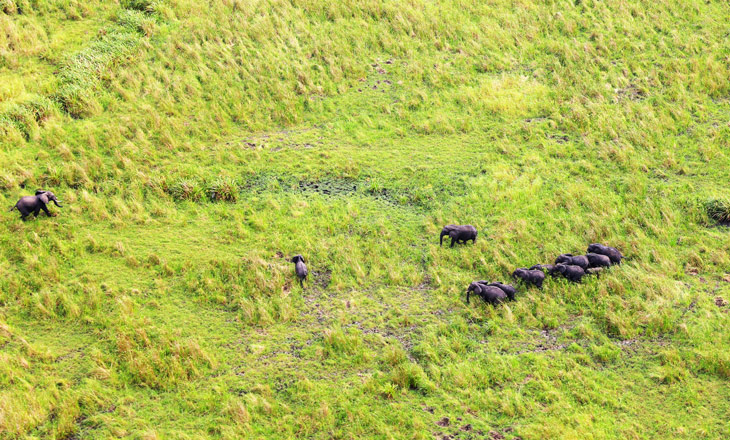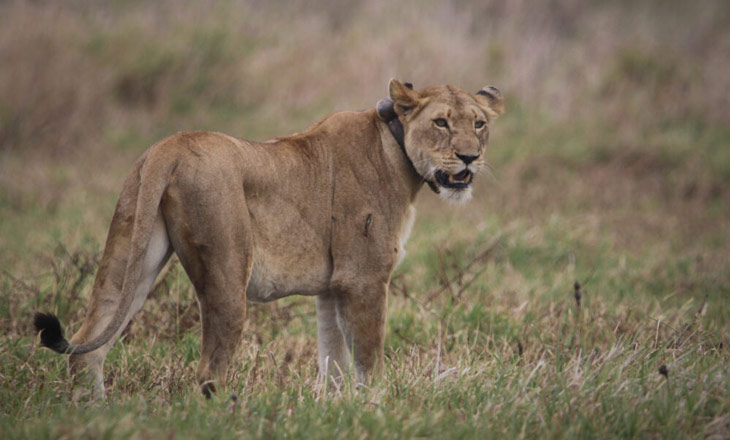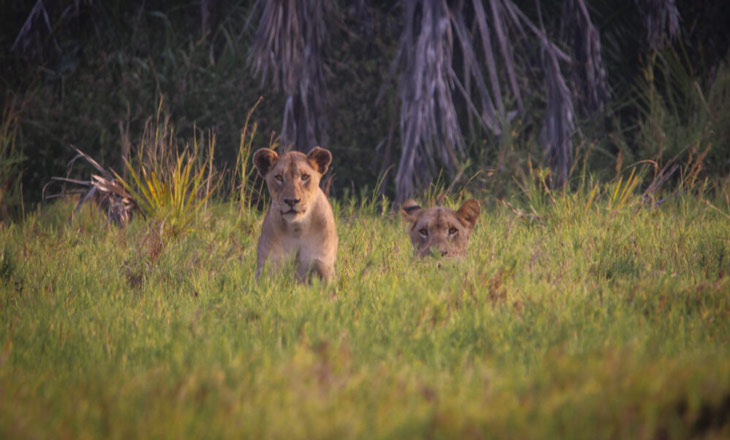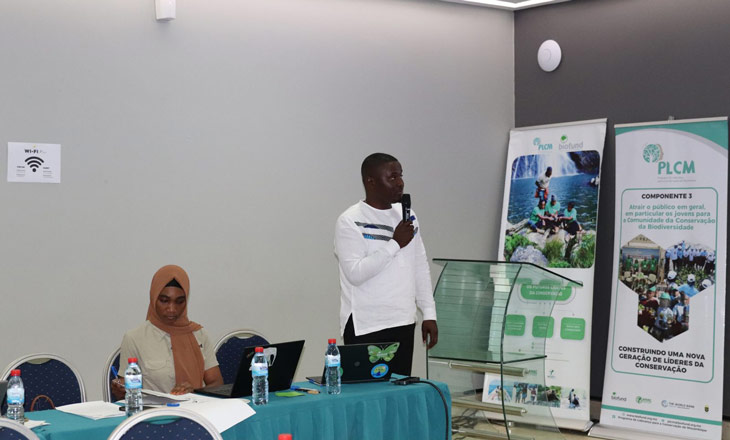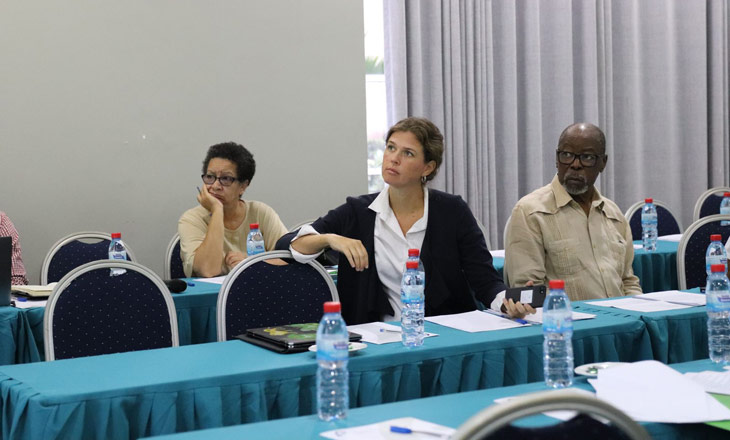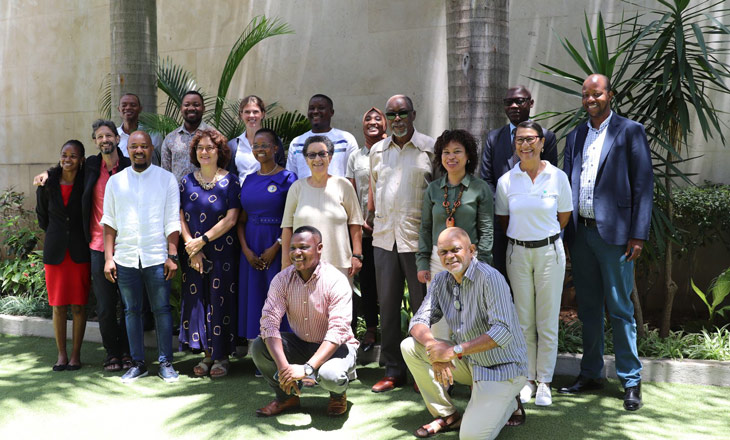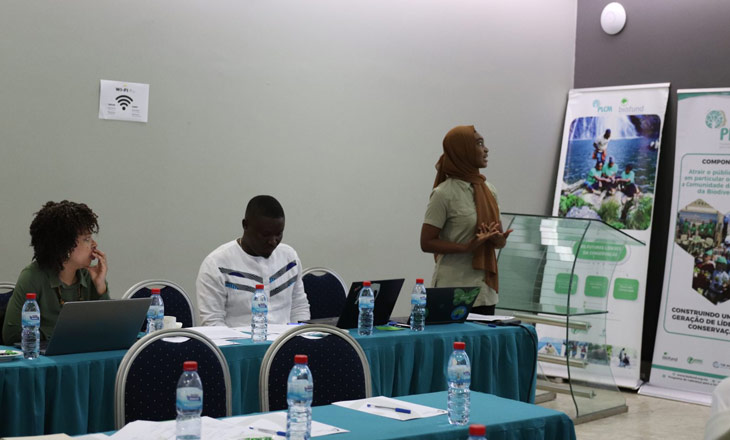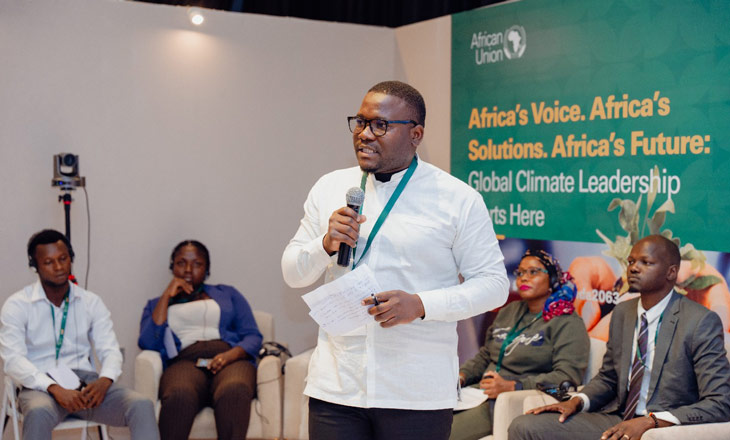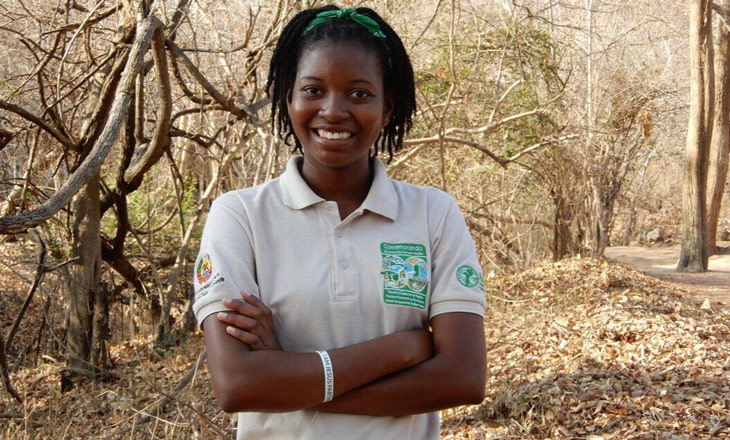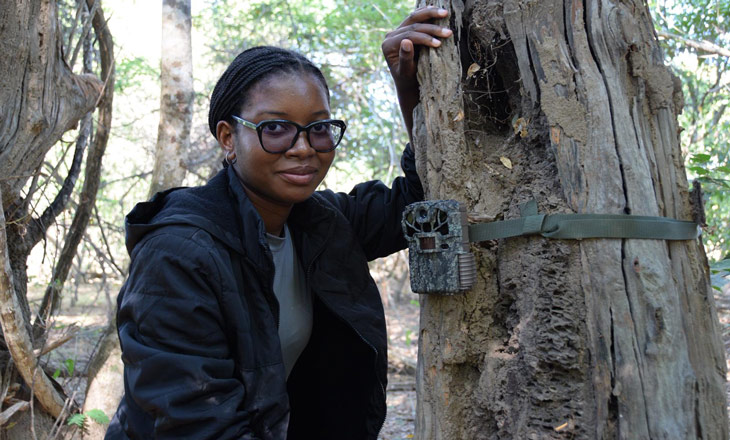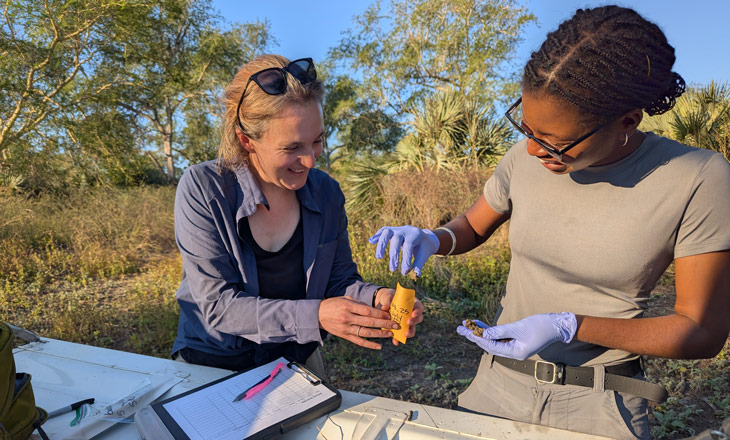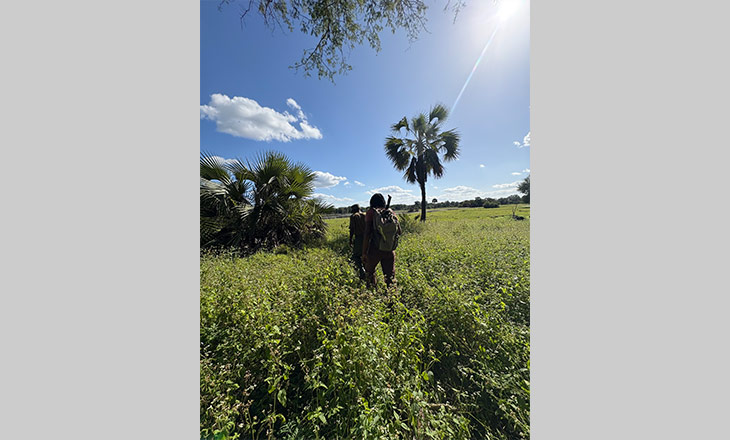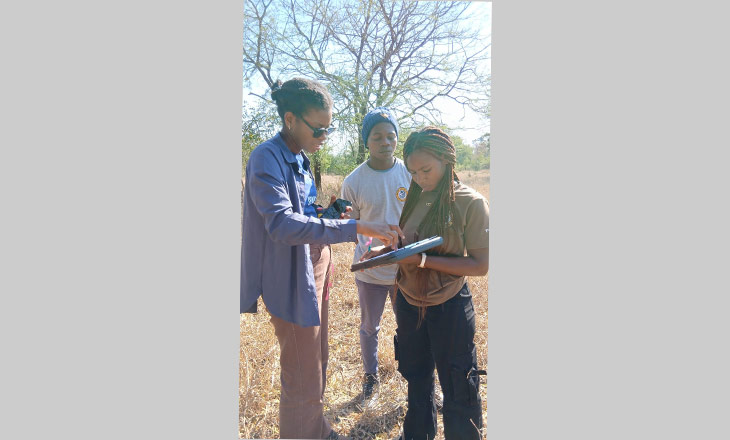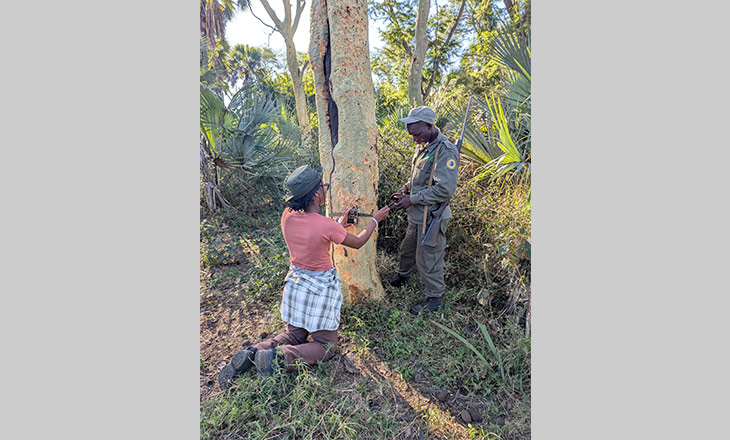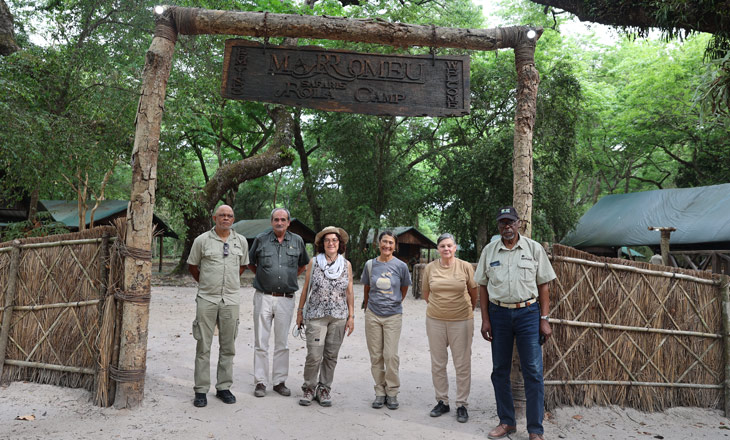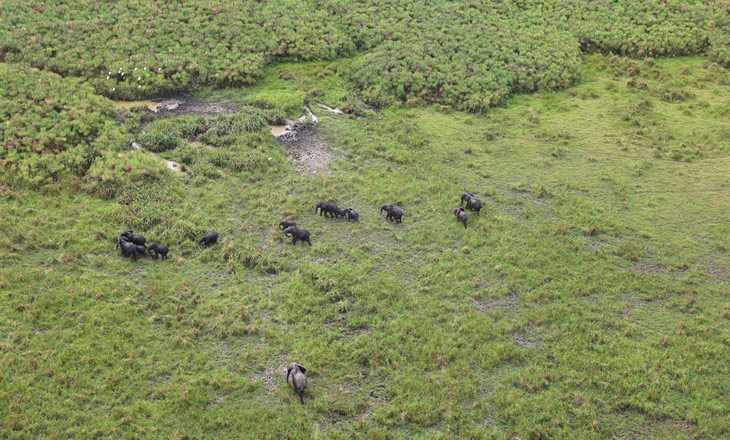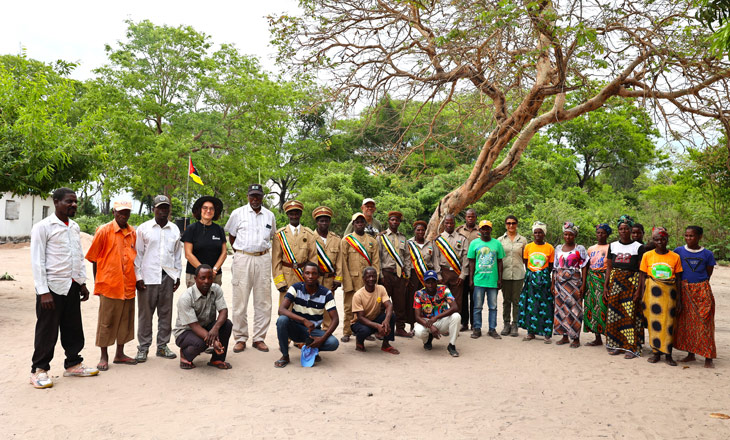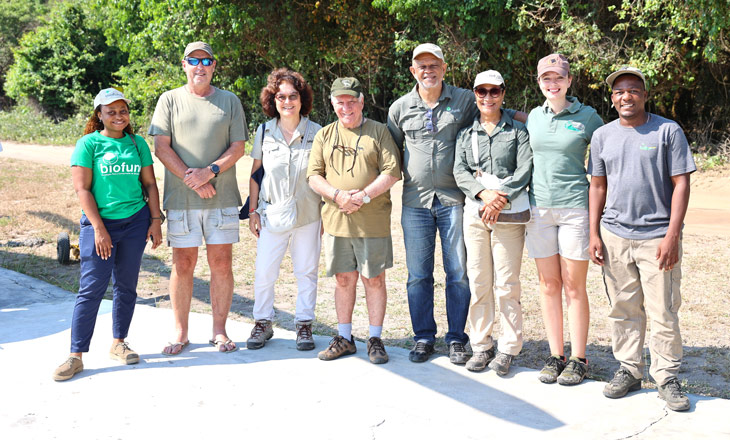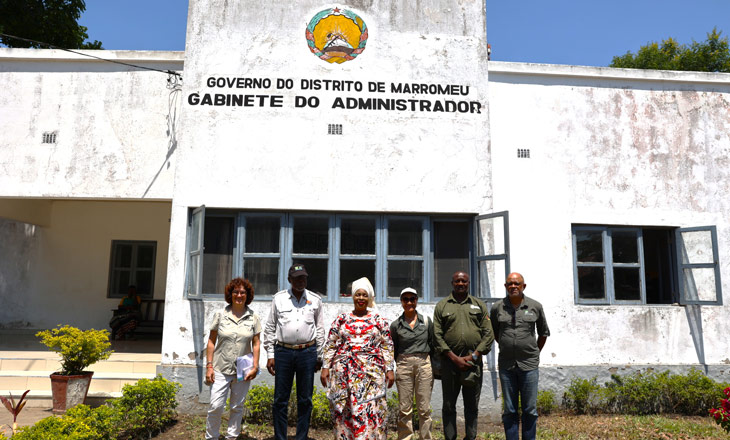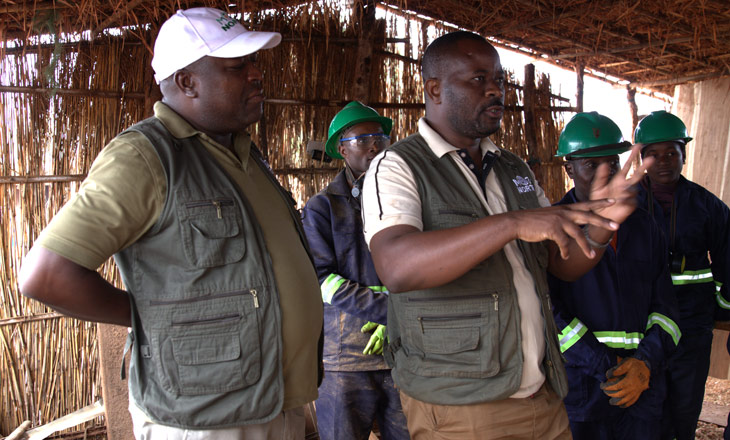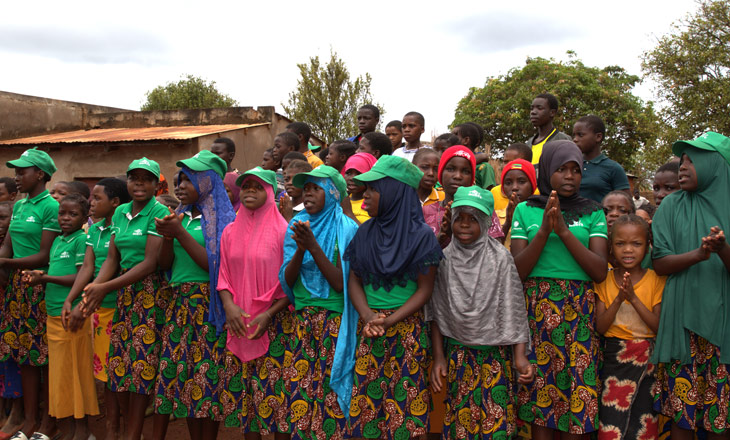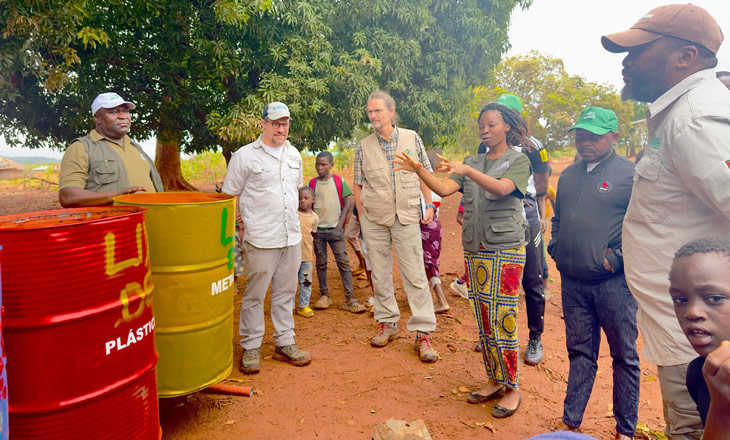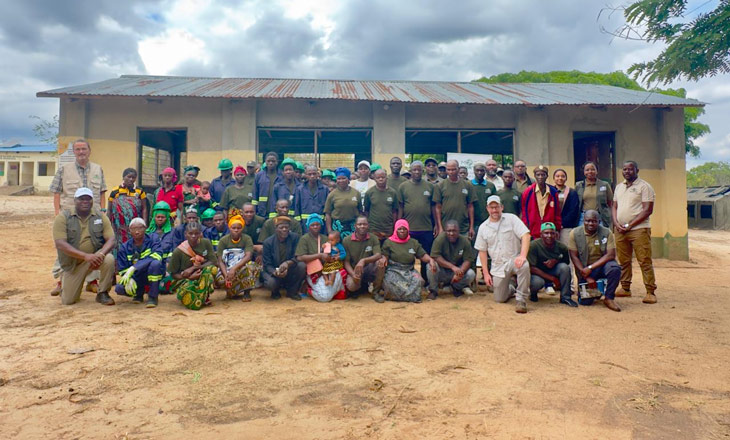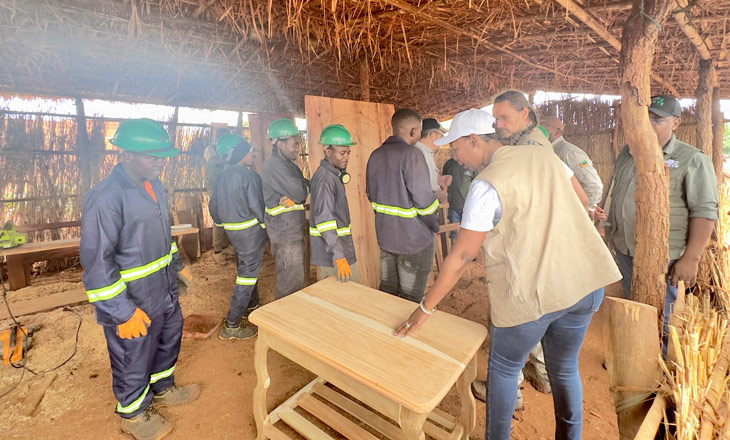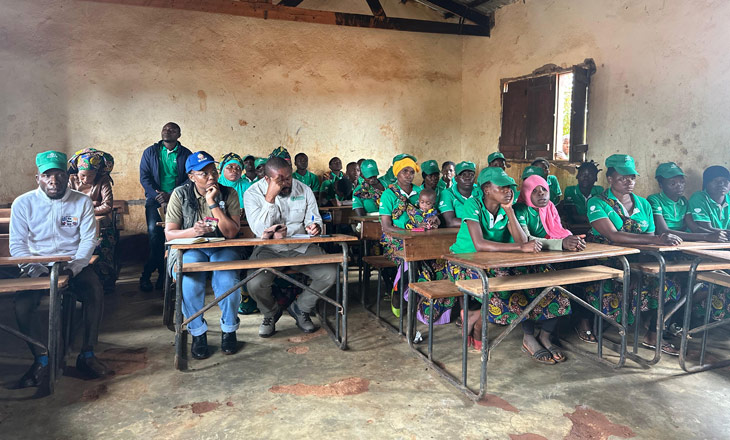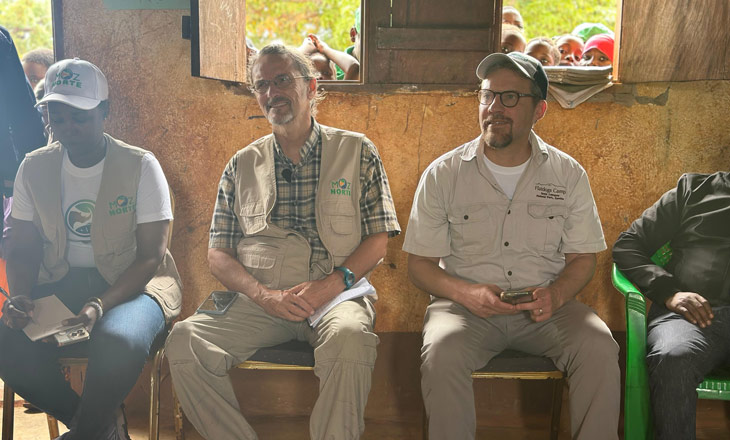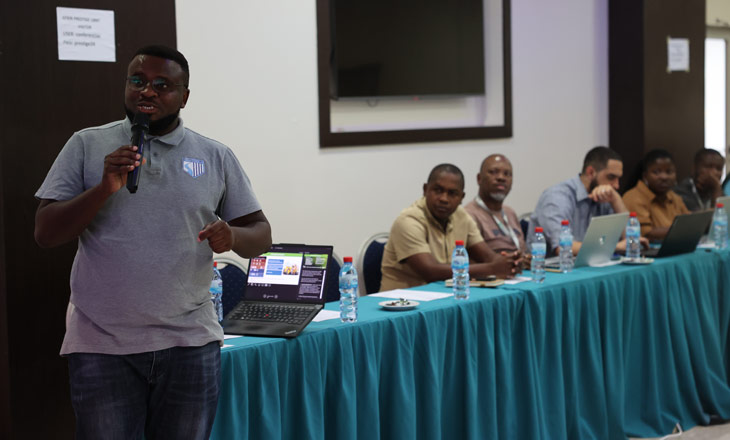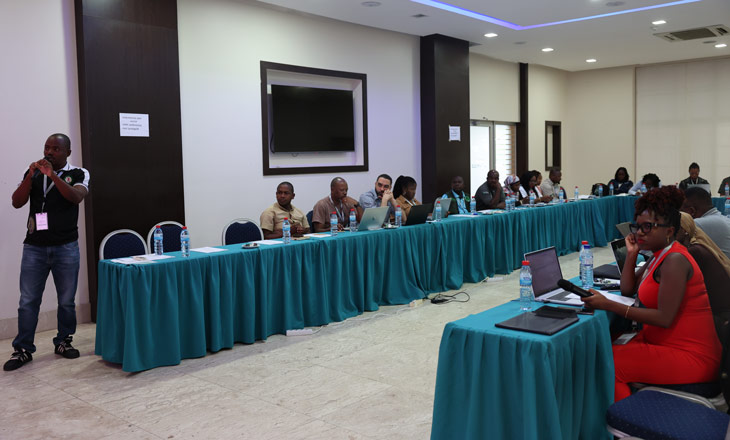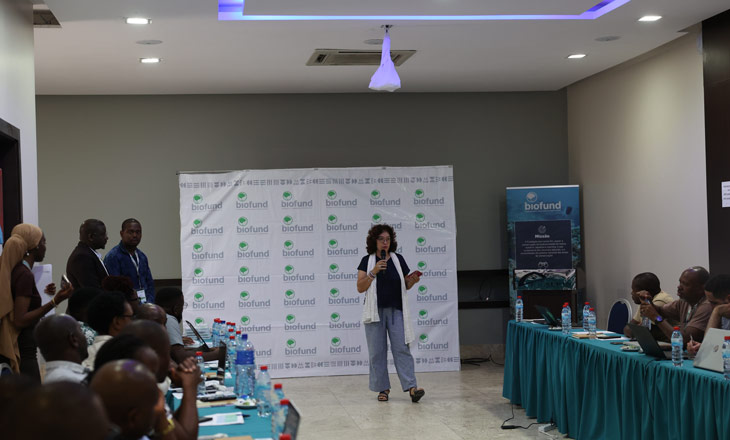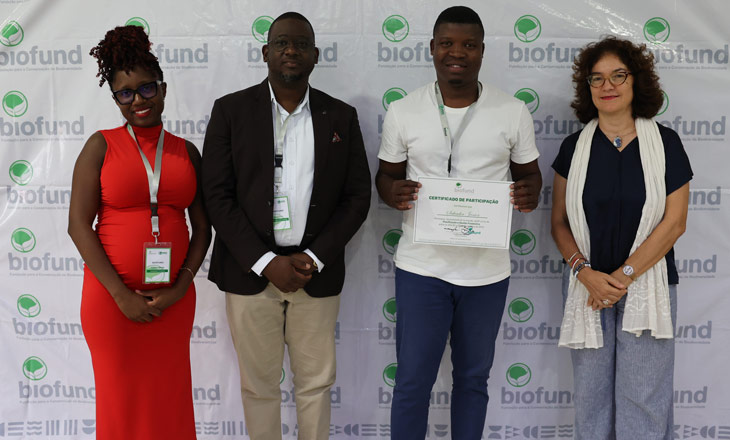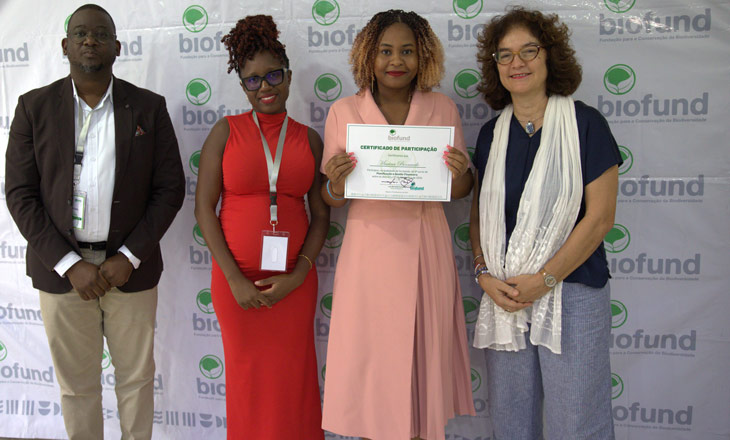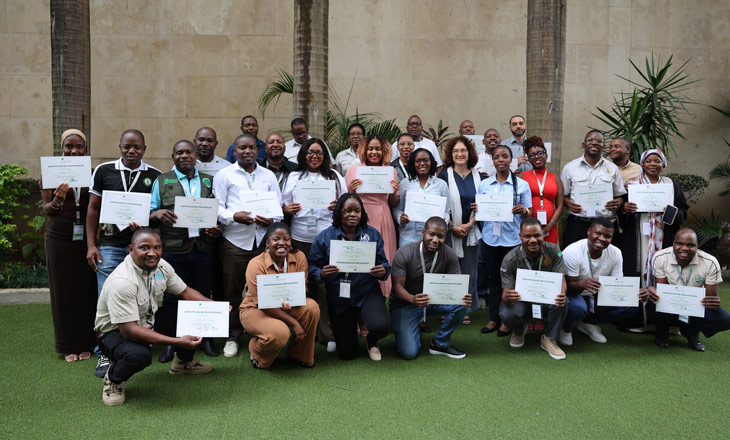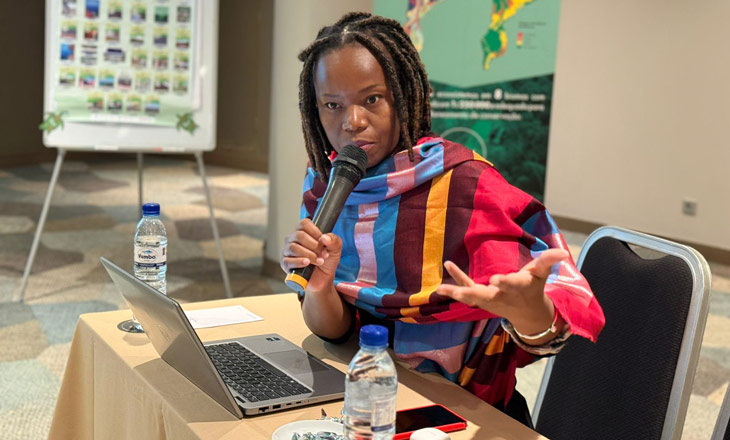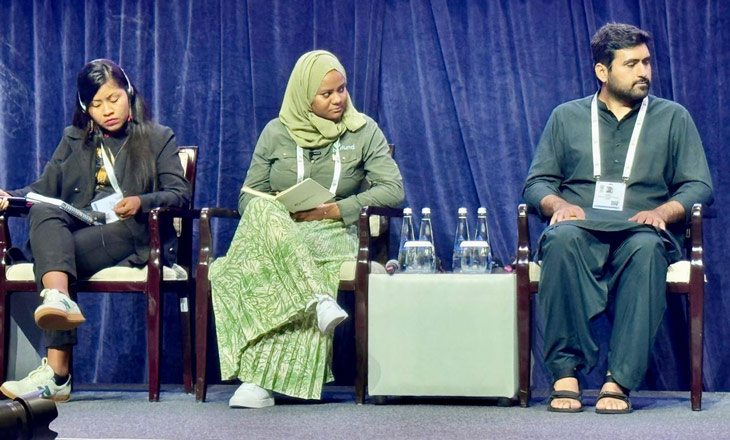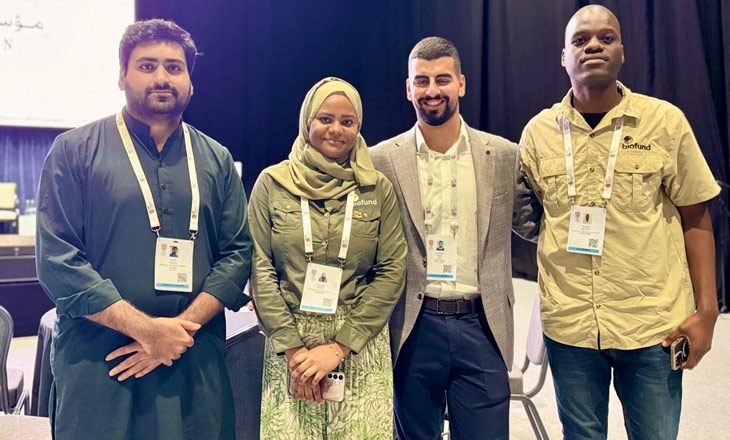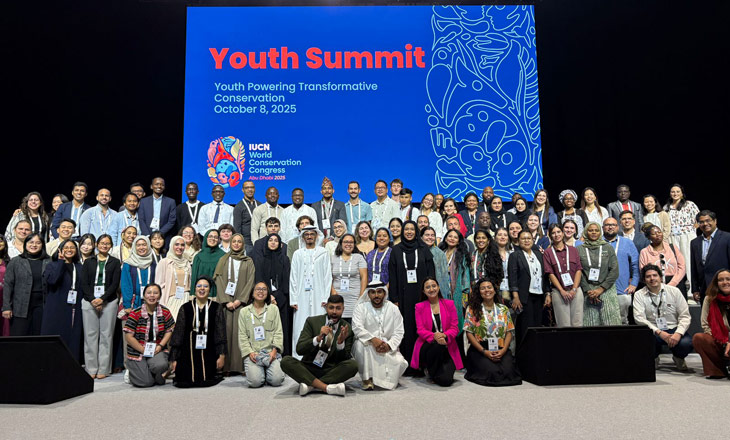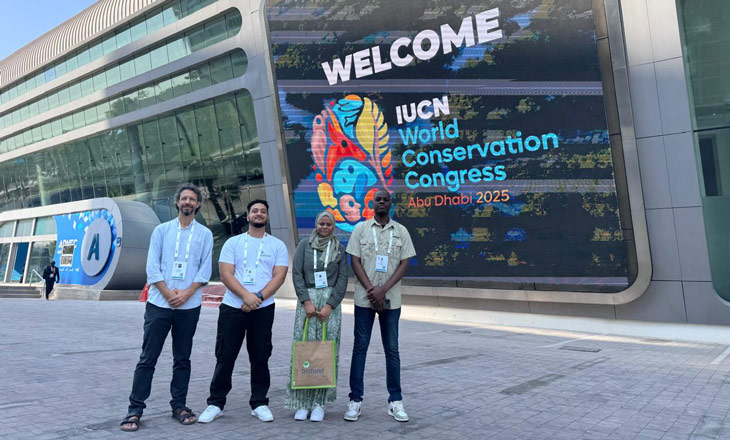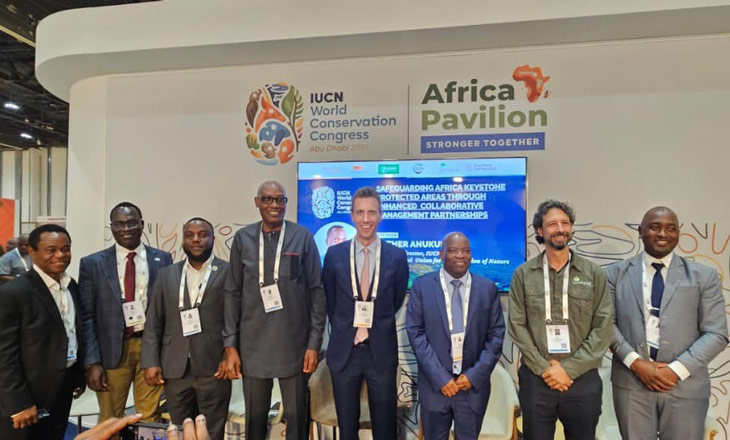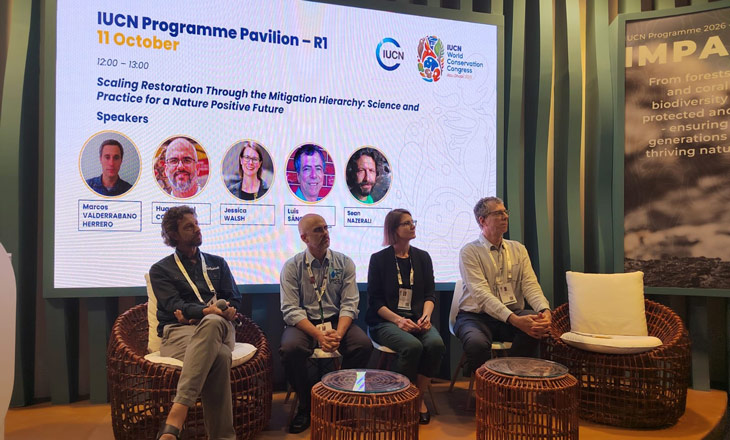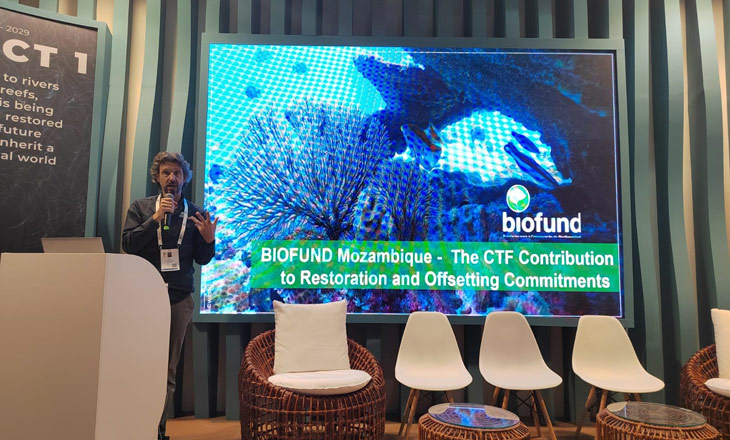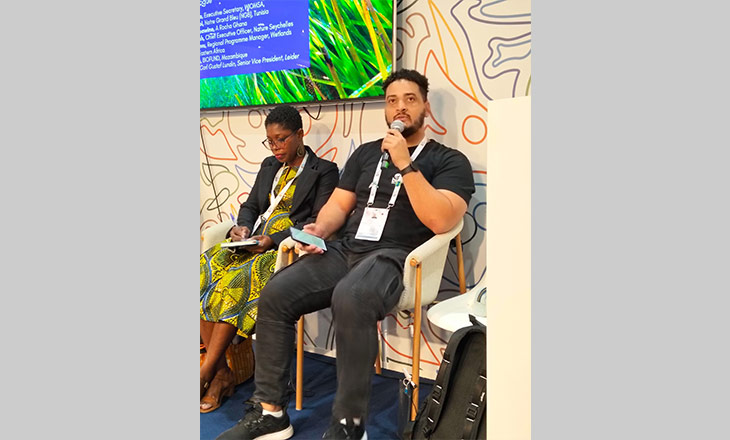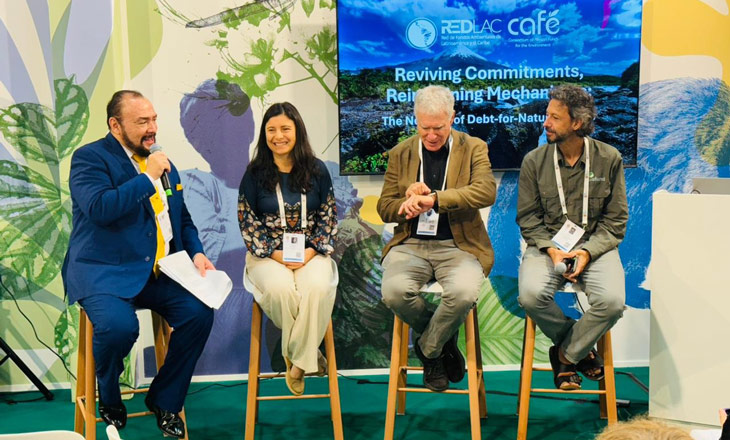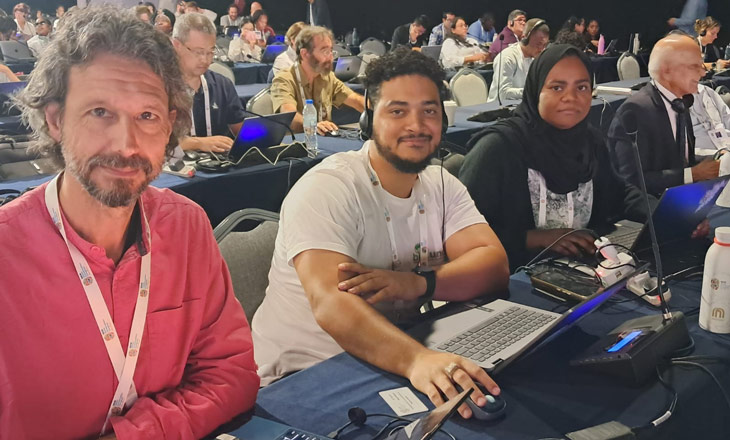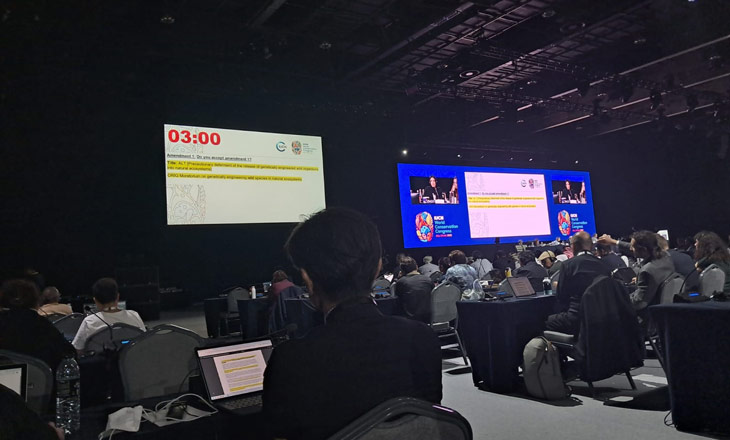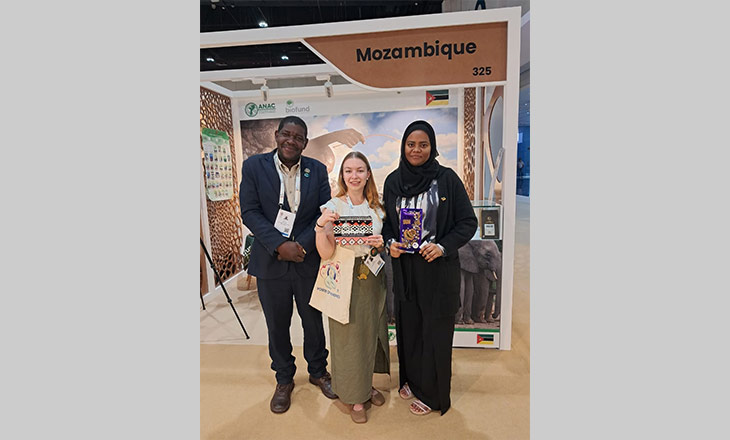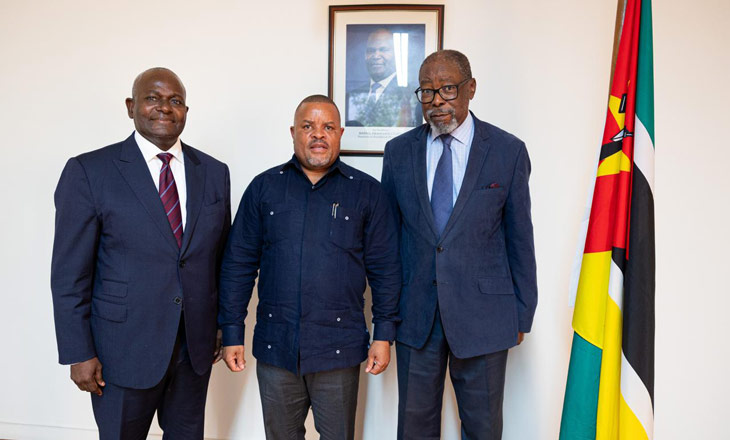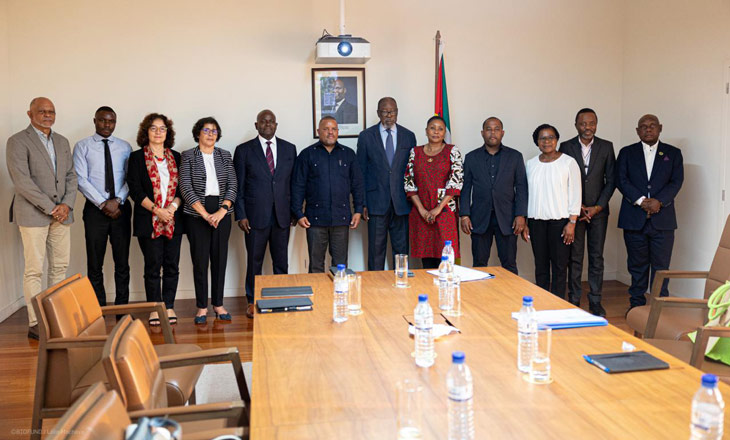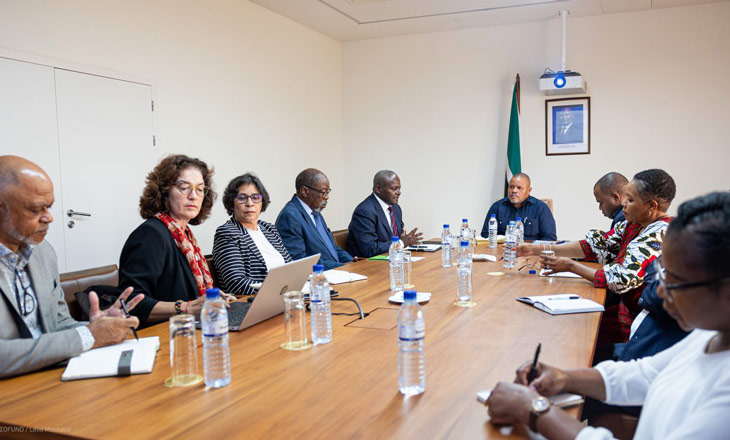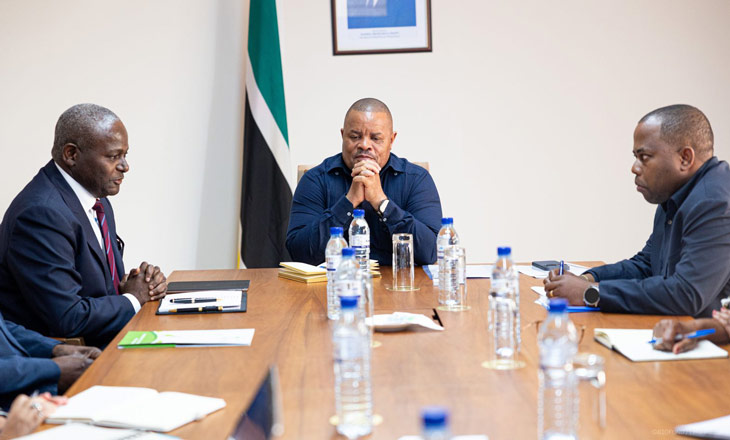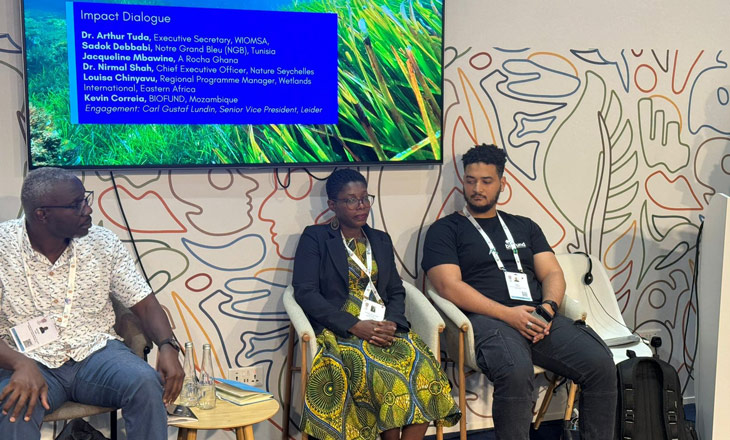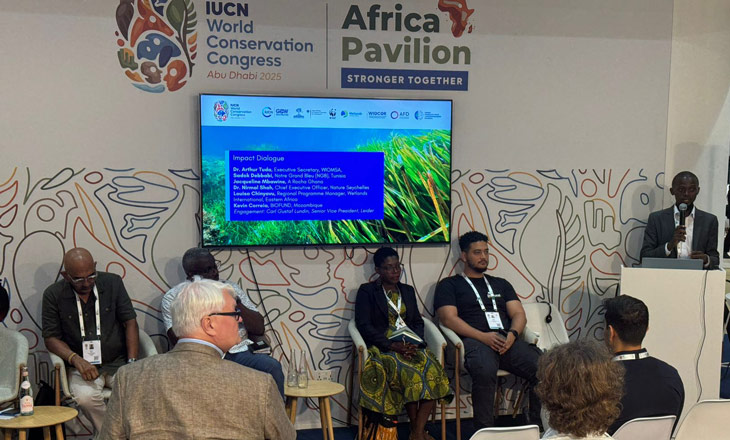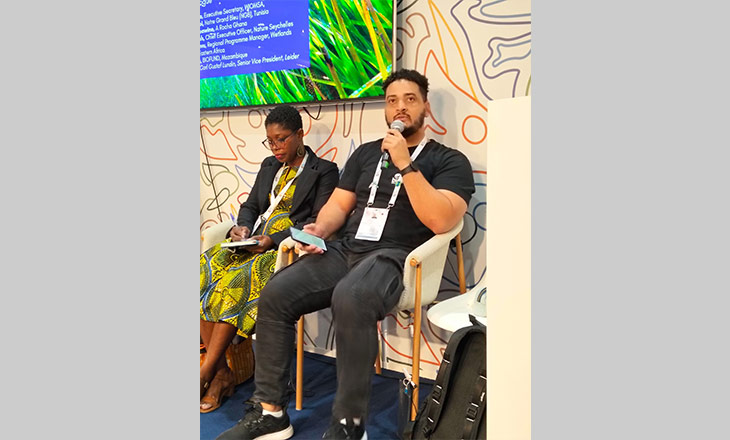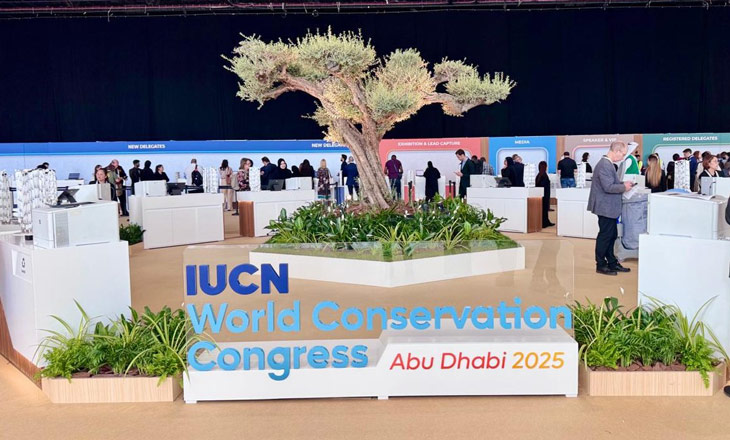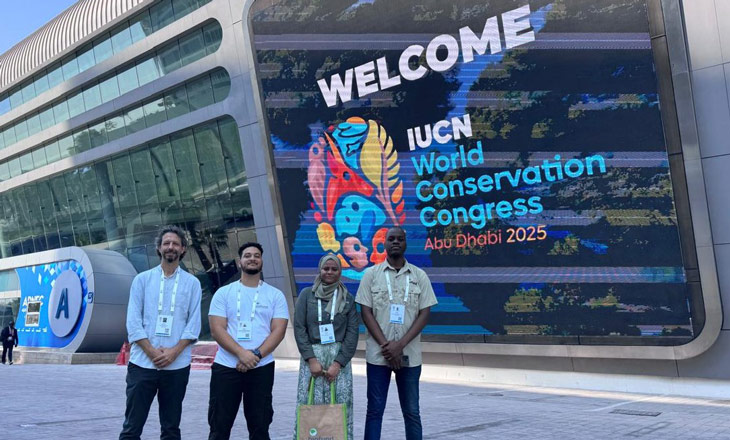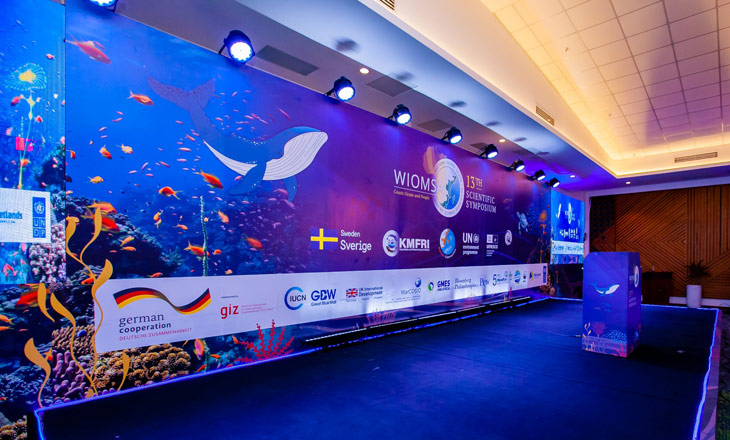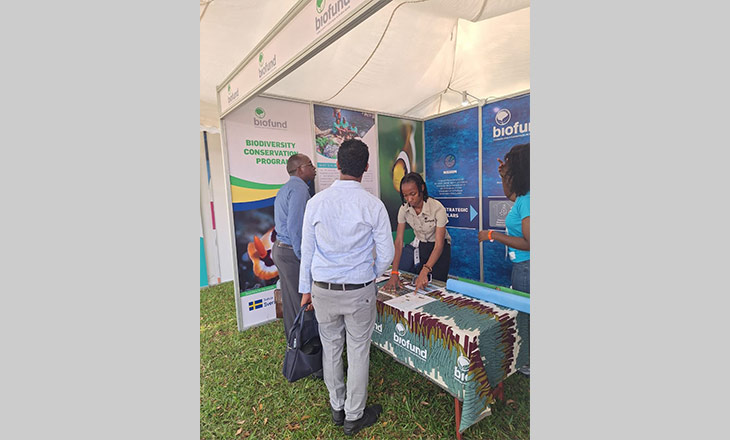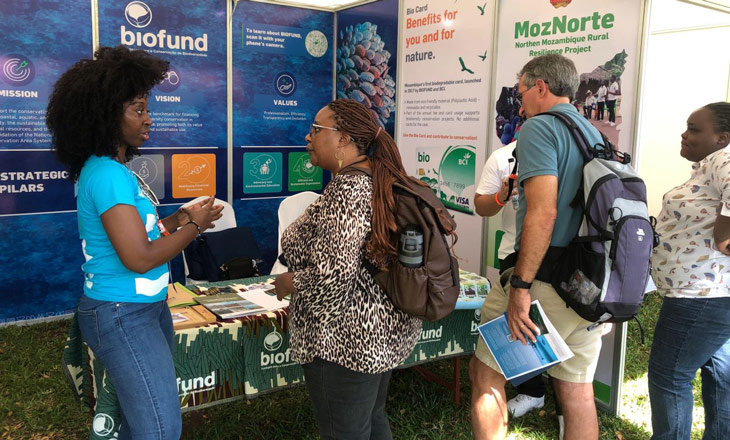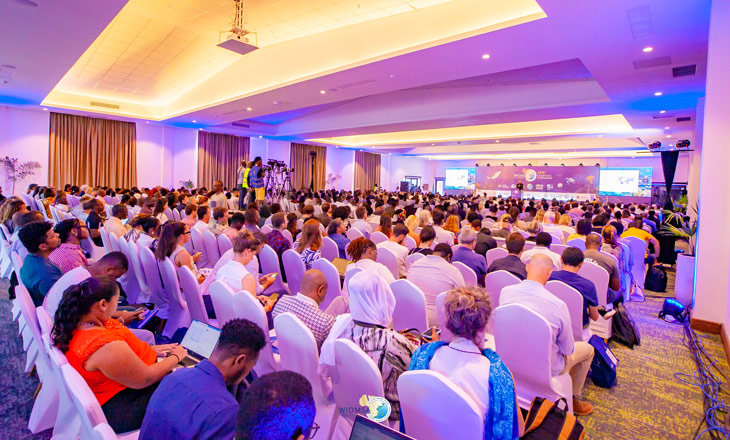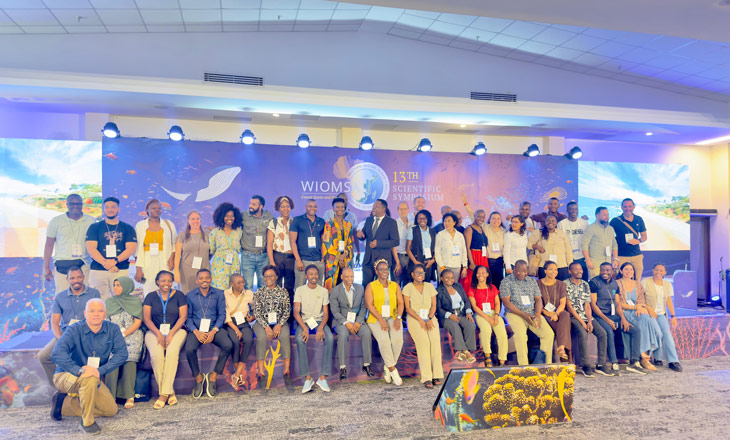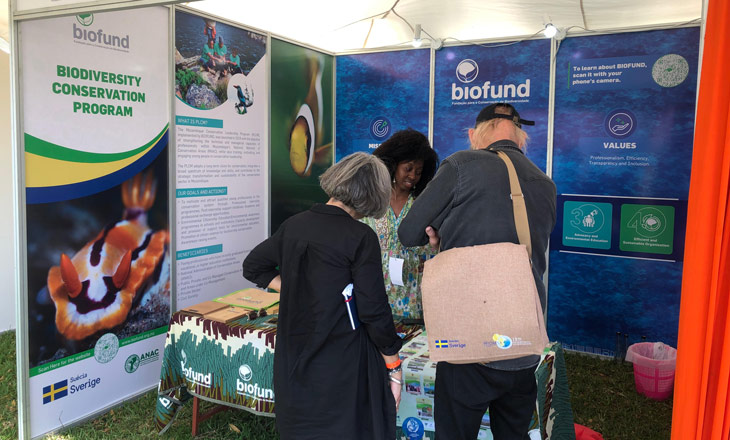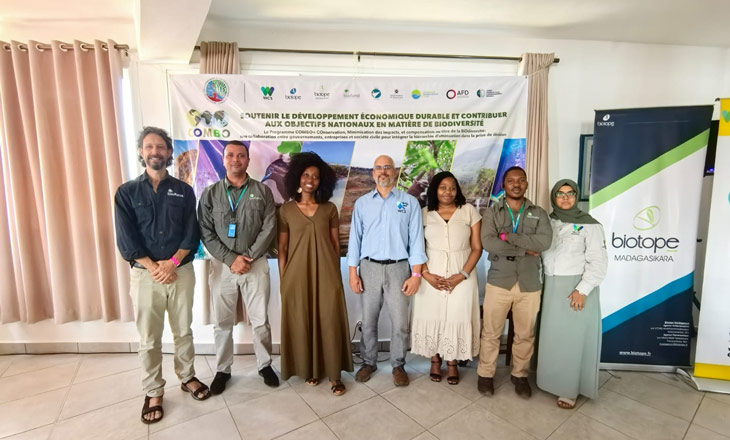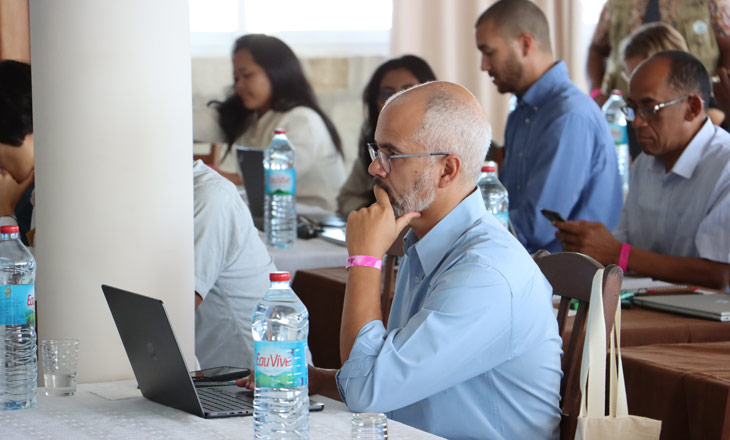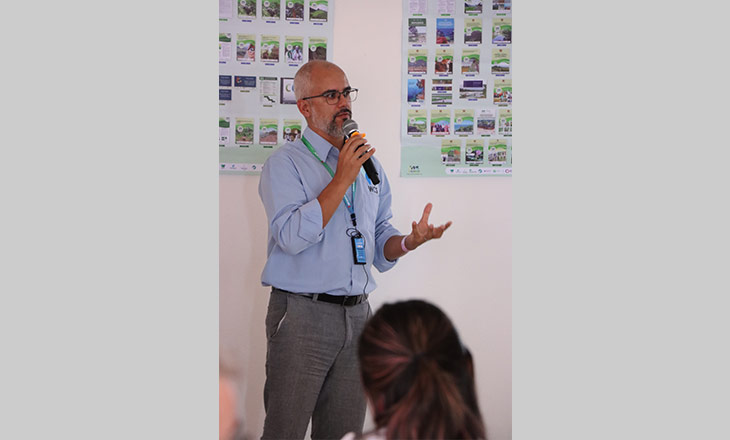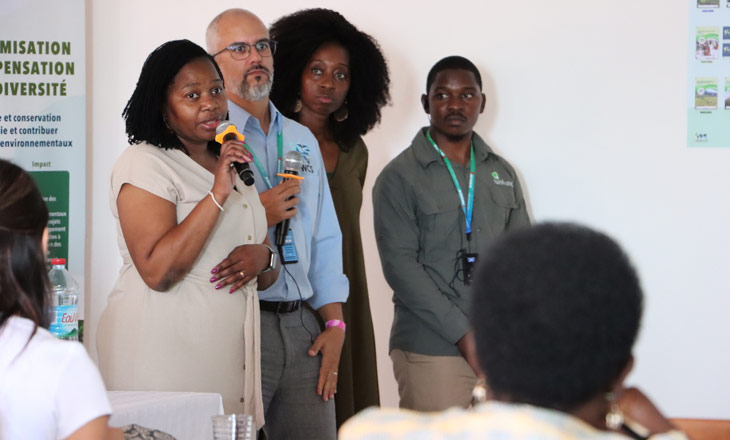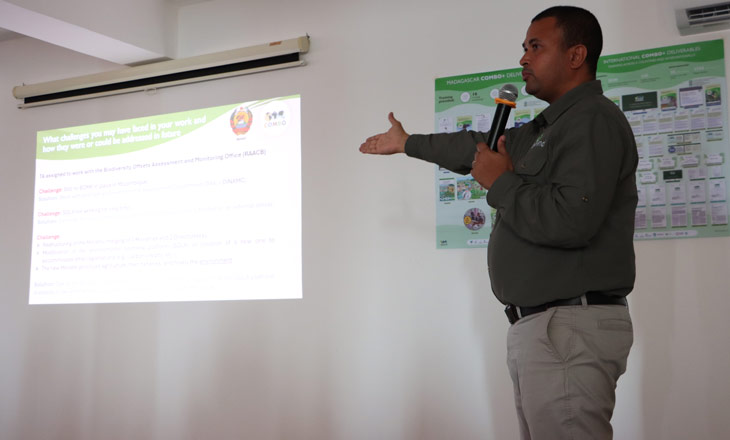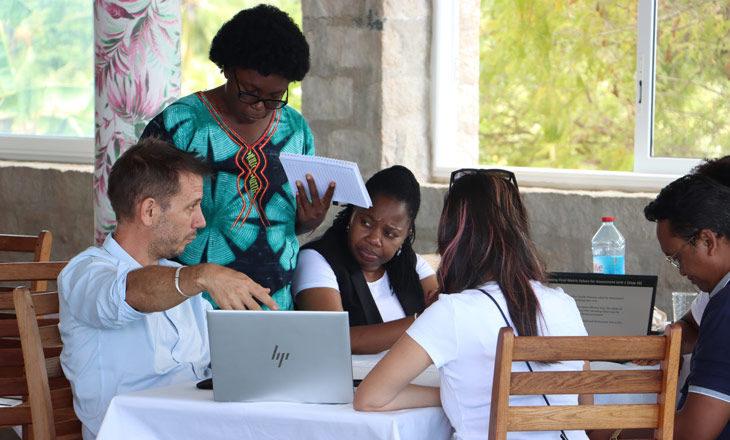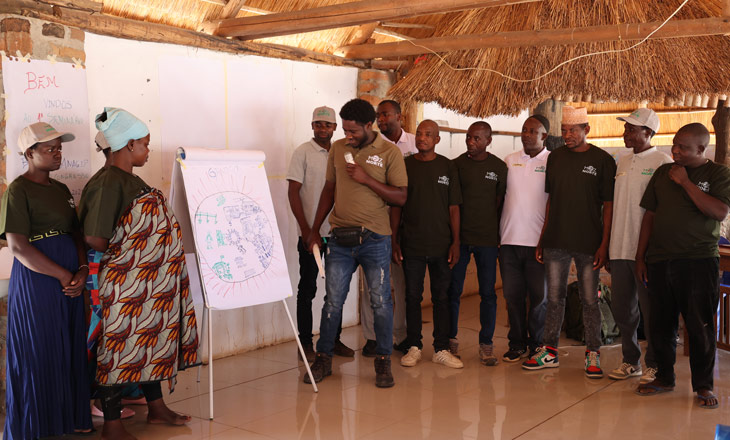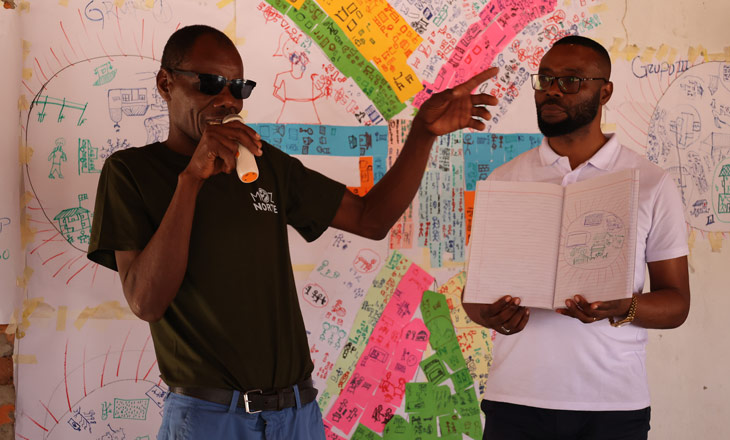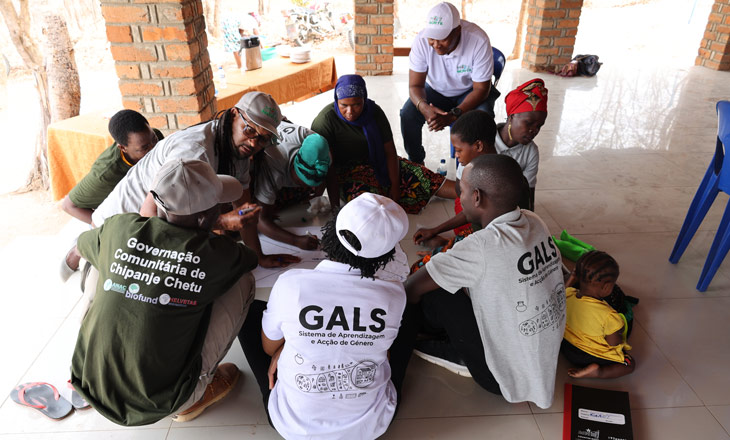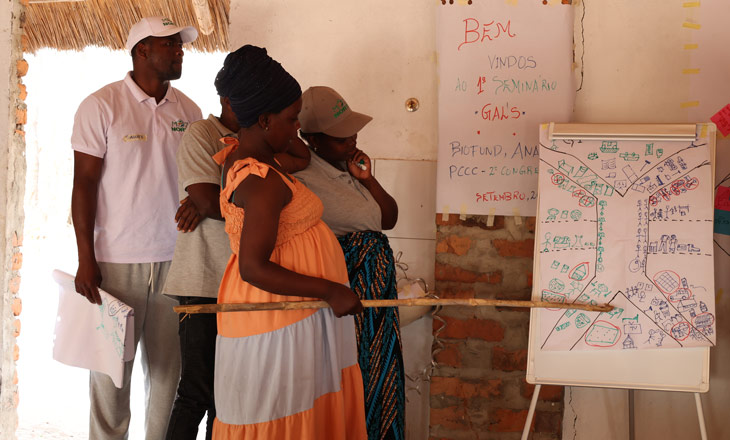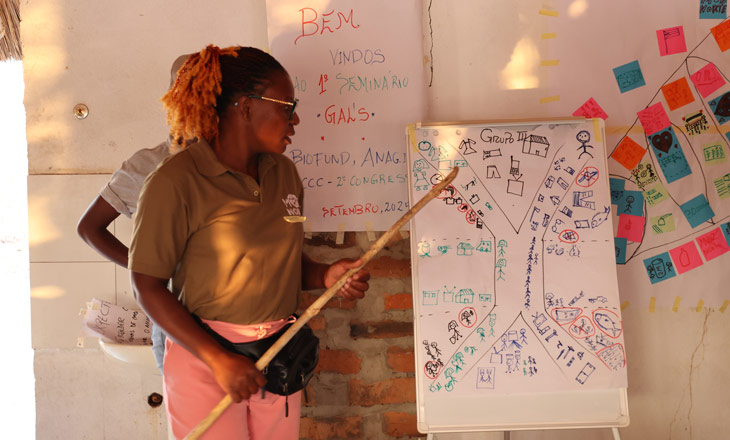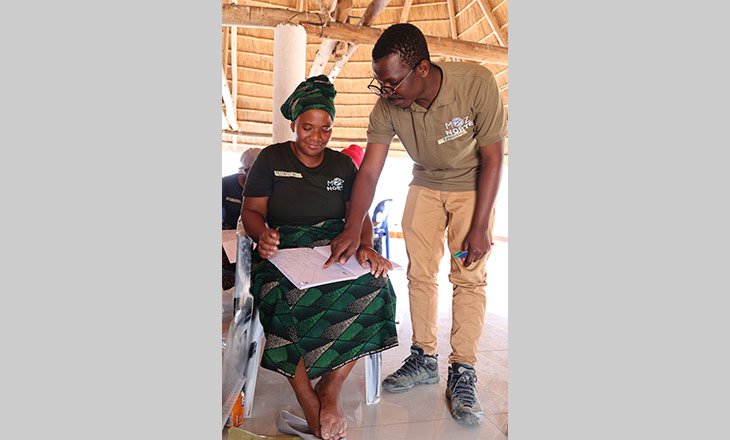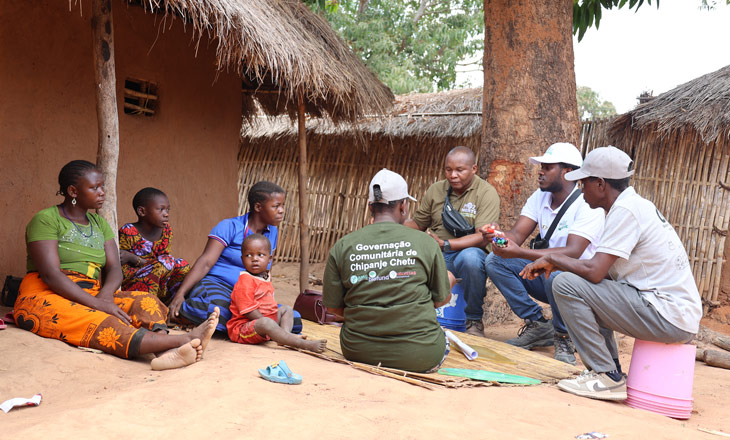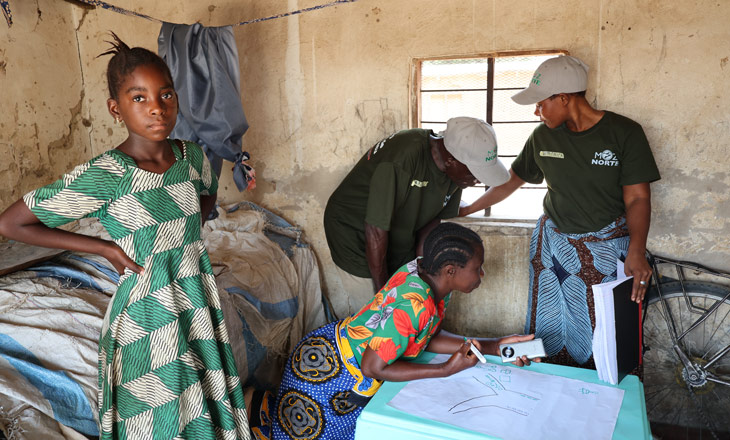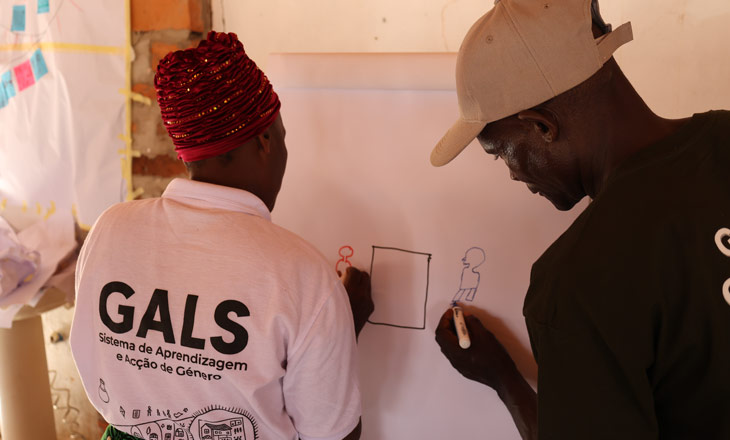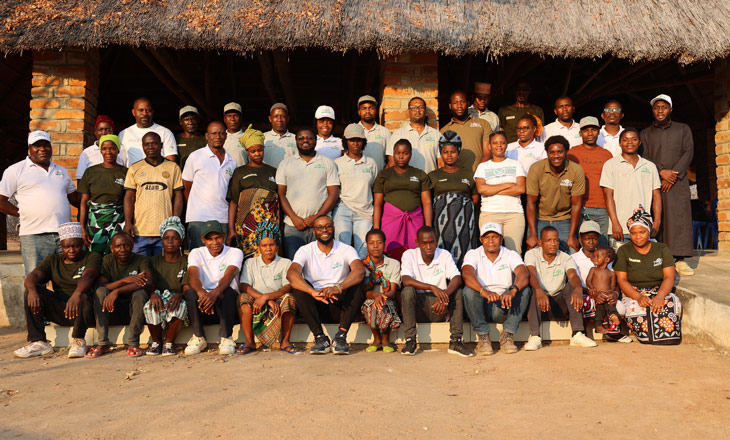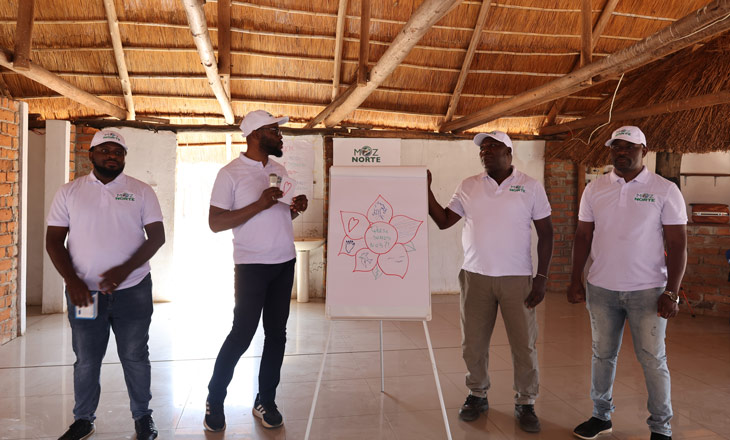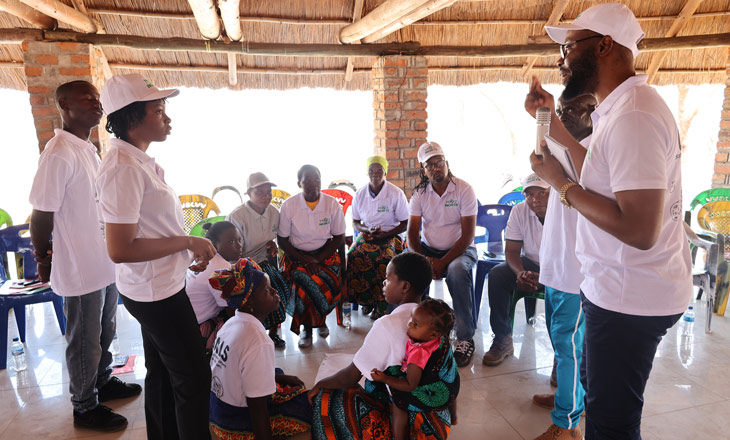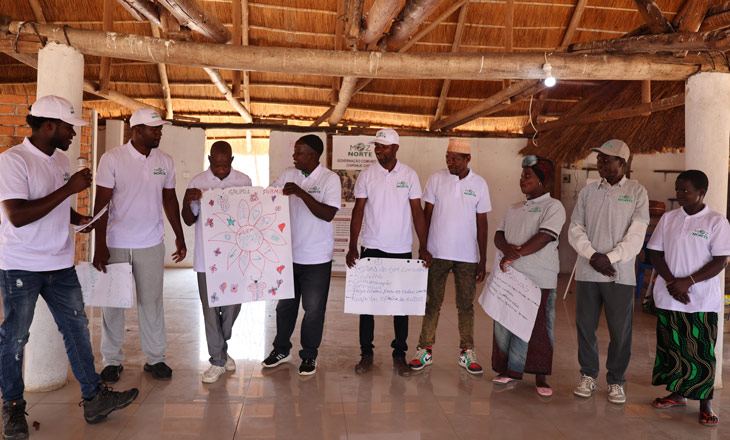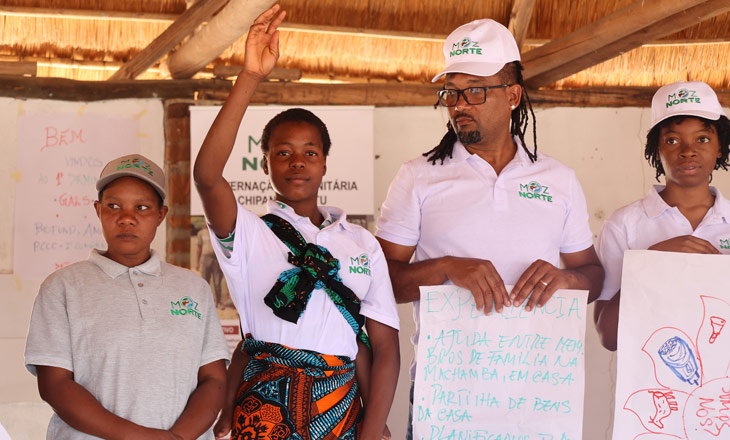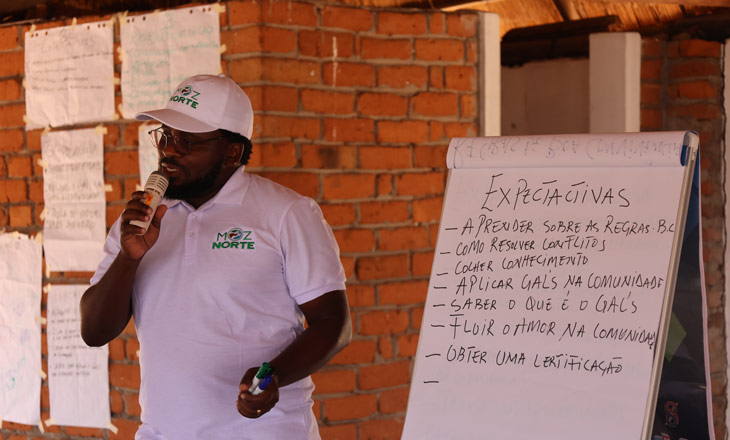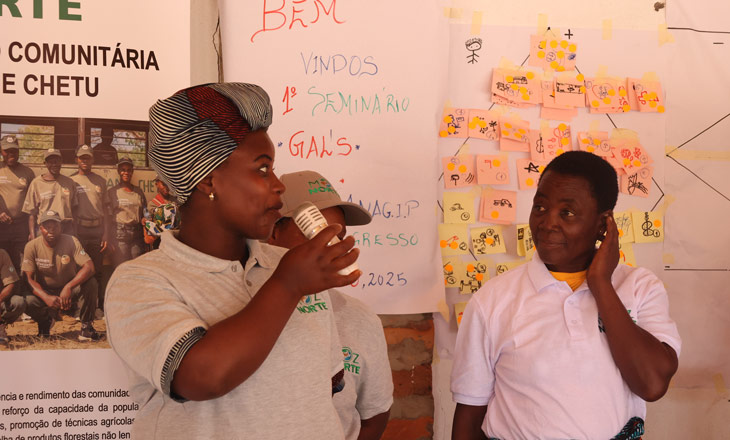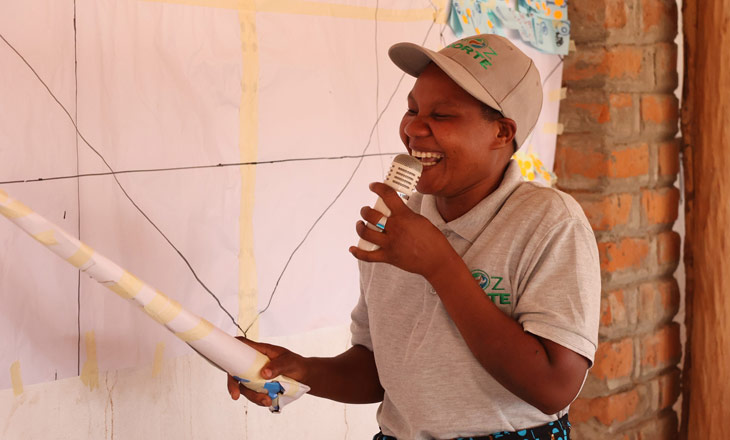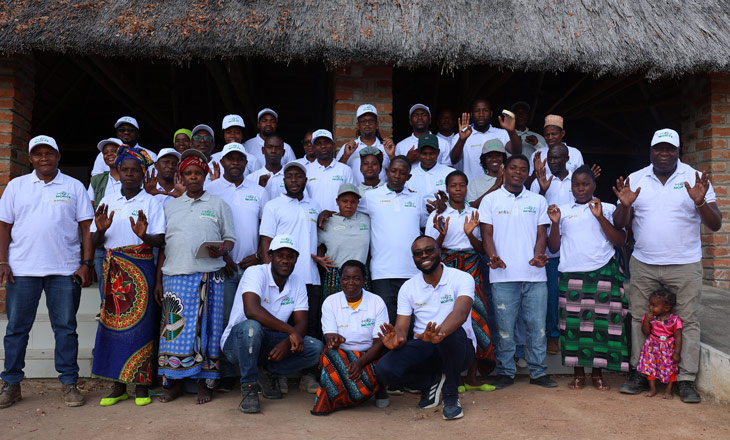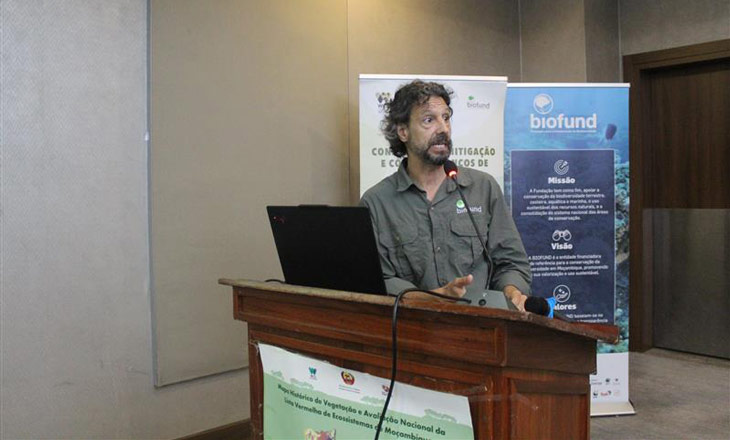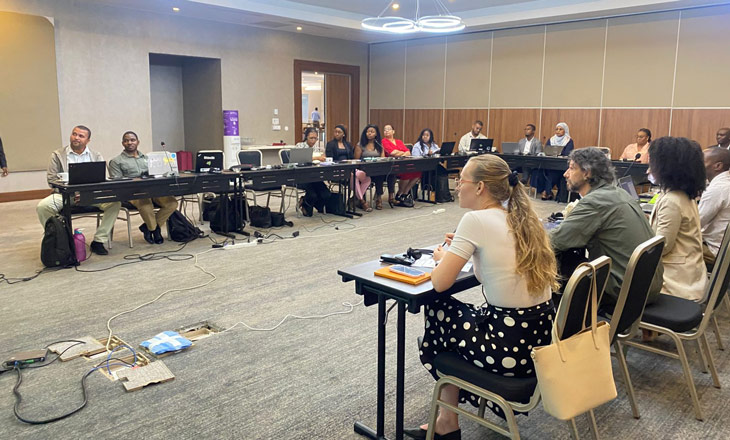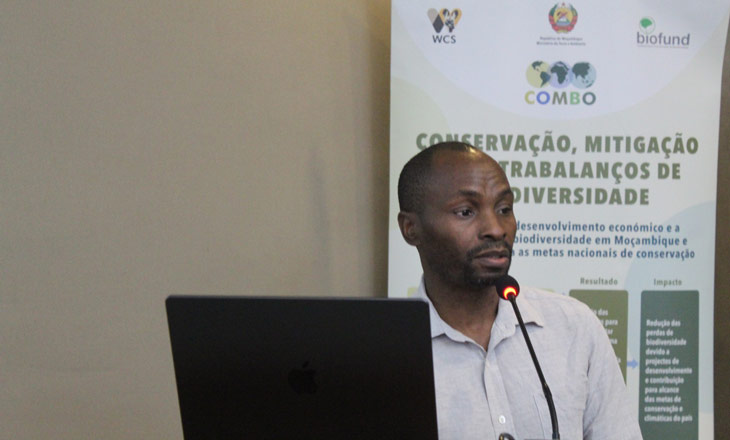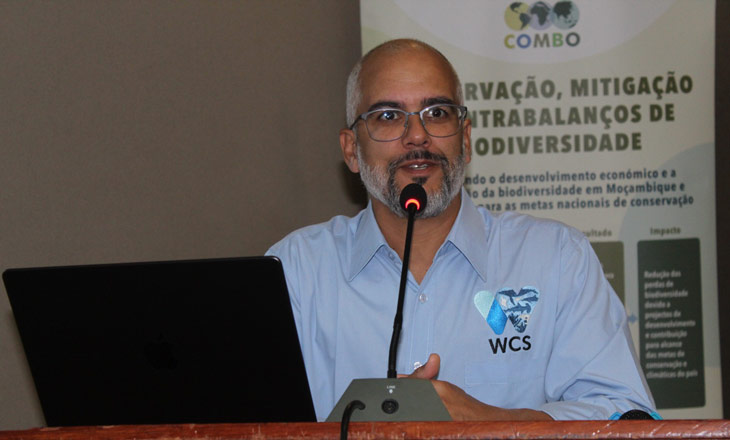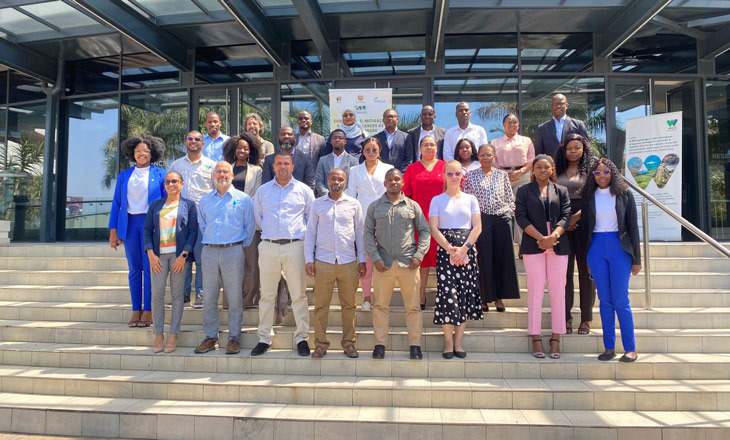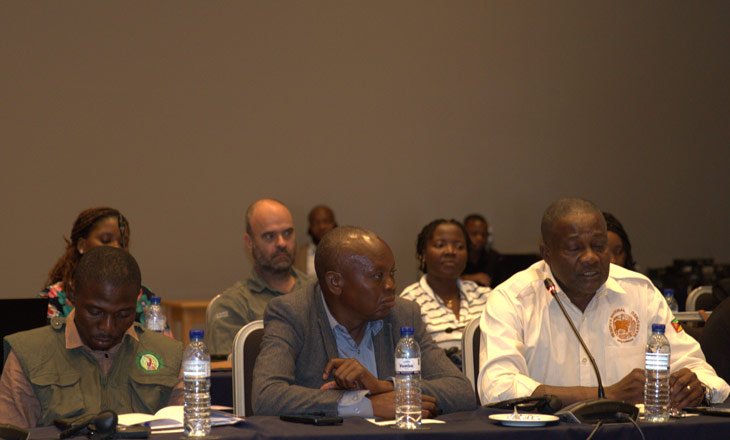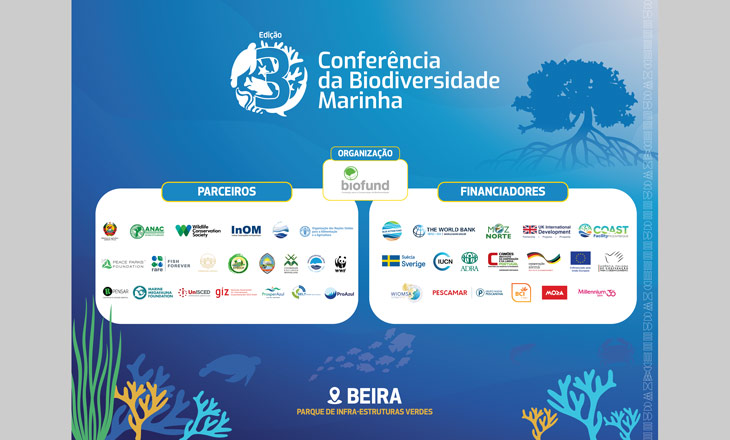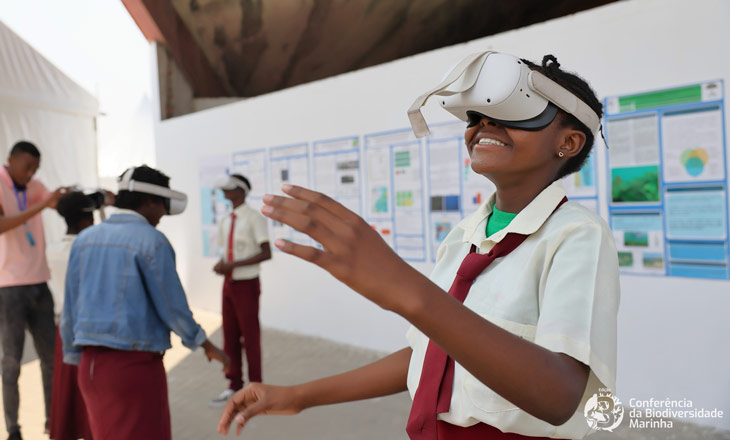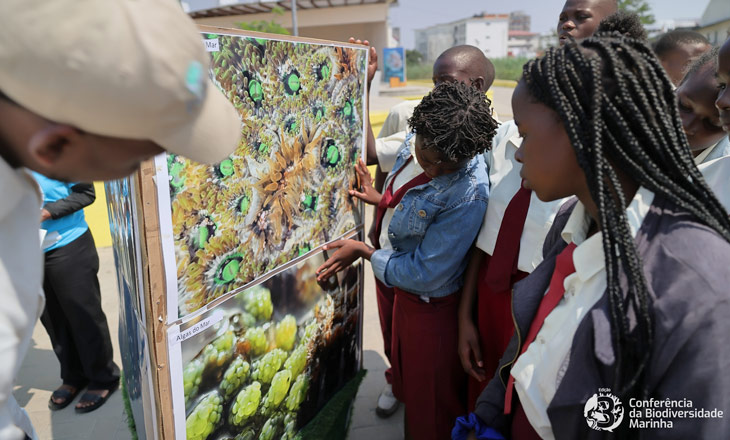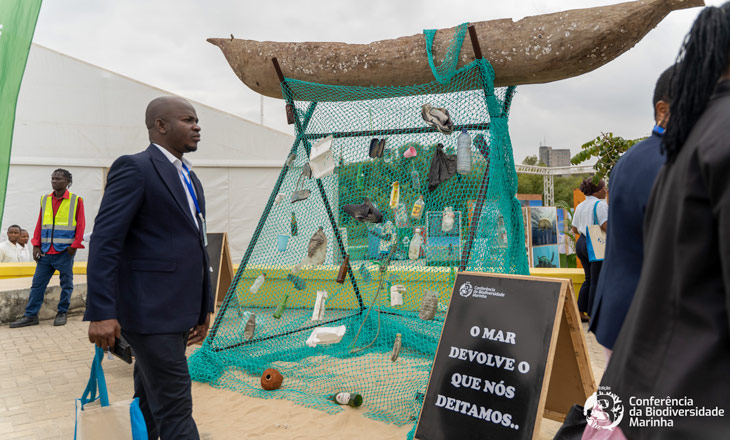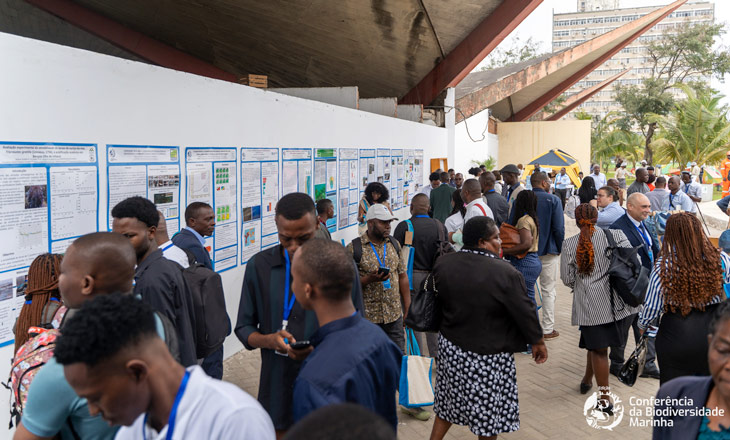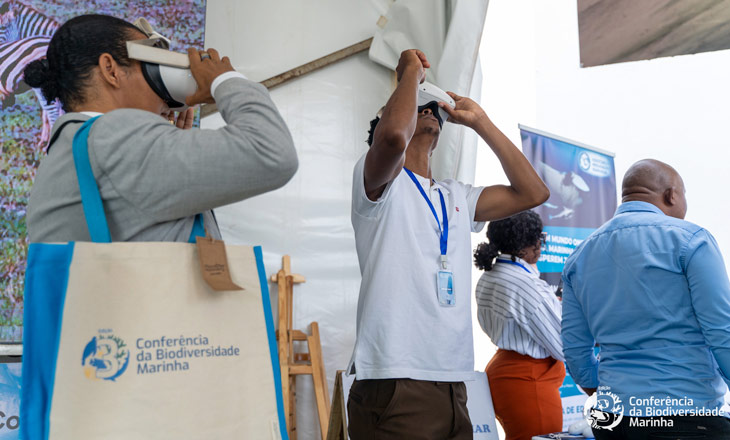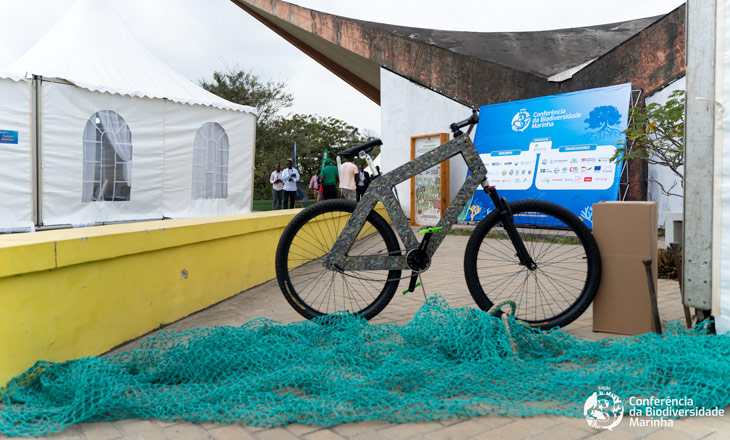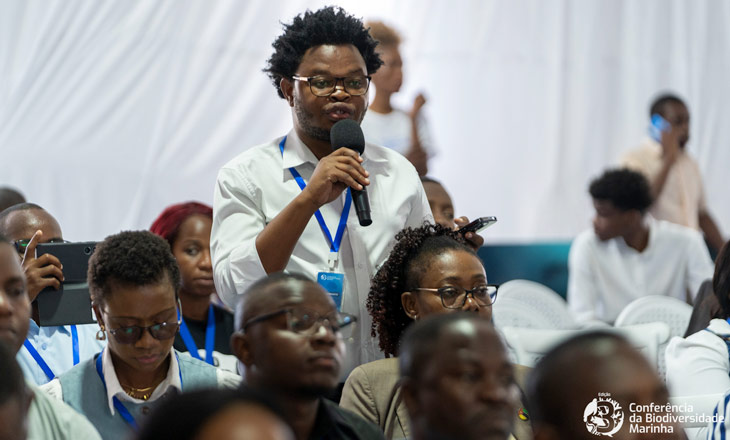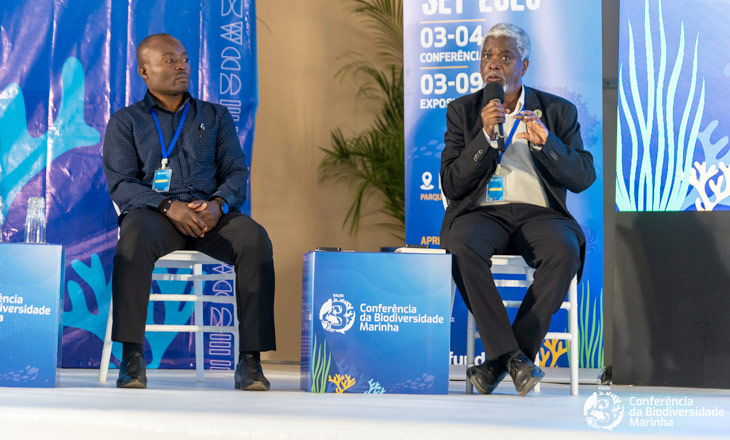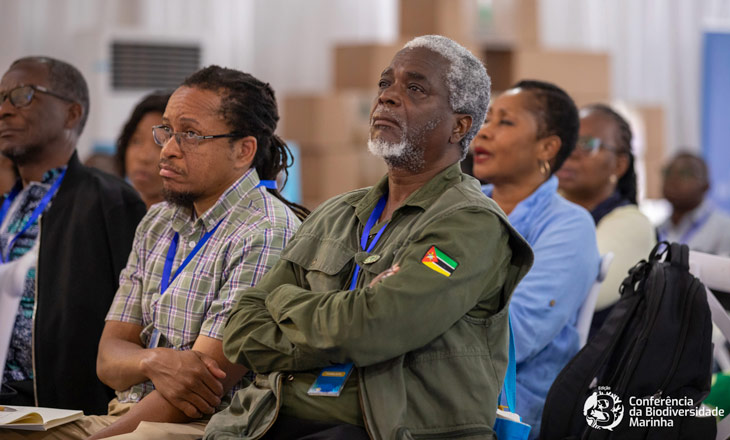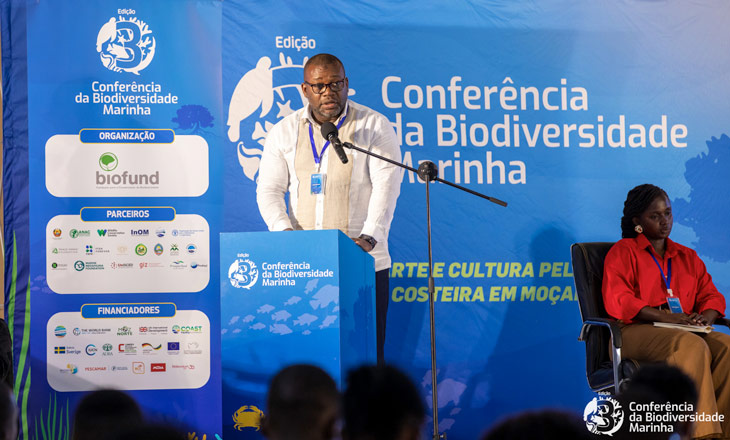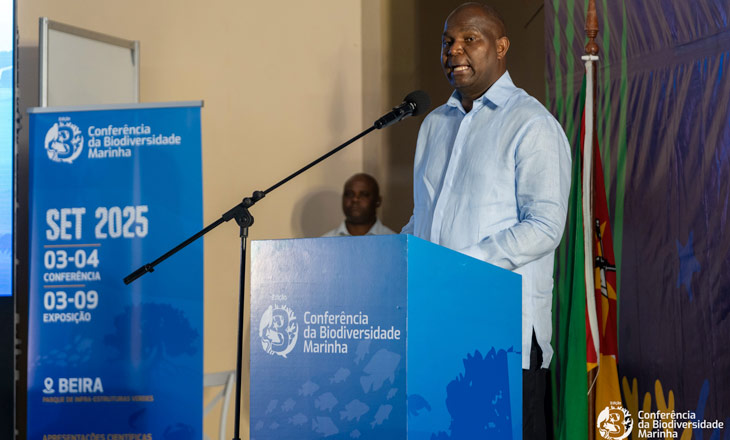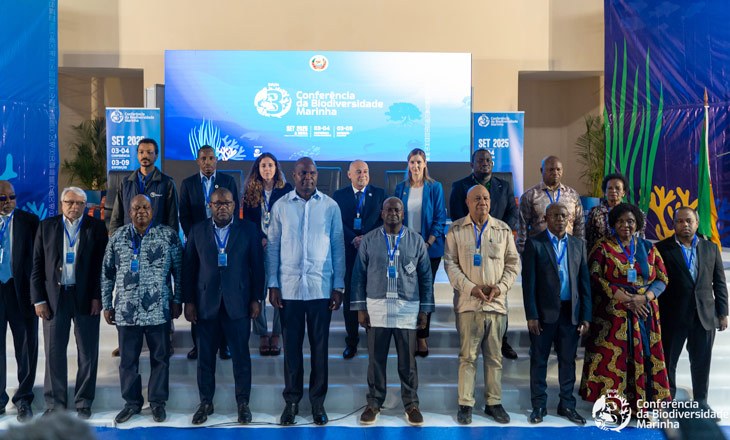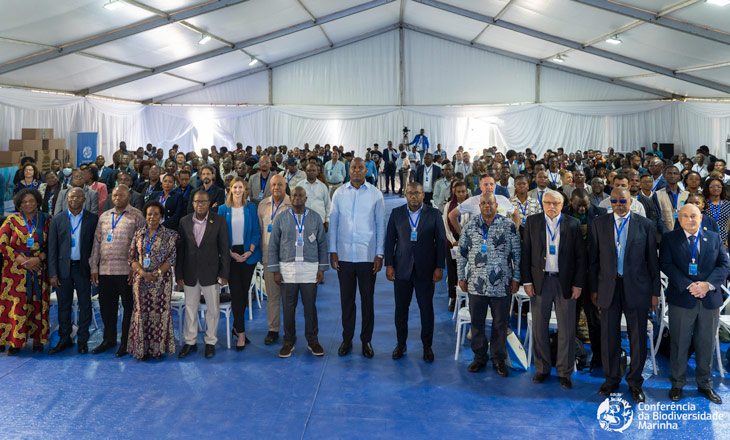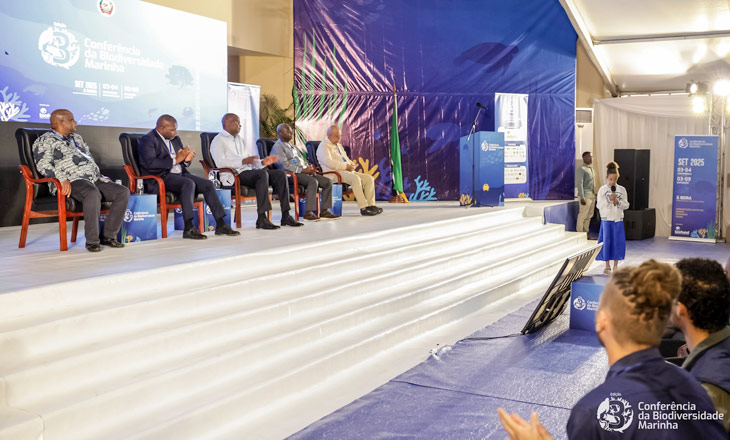In the second week of February 2026, BIOFUND met with the European Union Ambassador to Mozambique, Antonino Maggio, to take stock of the final phase of PROMOVE Biodiversity and align potential areas of cooperation for 2026, strengthening institutional dialogue between the two parties.
BIOFUND welcomes visit by the European Union Ambassador and strengthens synergies for 2026
BIOFUND, represented by its Chair of the Board of Directors, Carlos dos Santos, its Executive Director, Luís Honwana, and their team, hosted the visit of the European Union (EU) Ambassador to Mozambique, Antonino Maggio, accompanied by Anne-Ael Pohu (Head of the Resilience and Climate Change Team) and Aude Guignard (Environment and Climate Change Programme Officer).
The meeting focused on presenting BIOFUND since its establishment, including its main strategic objectives, key activities, organisational structure, and mechanisms for managing both its own funds and third-party funds, while also reinforcing dialogue with the EU Delegation in Mozambique.
One of the highlights was the completion, this year, of the EU-funded PROMOVE Biodiversity programme (2019–2026). Within this support framework, results and relevant actions were shared, with a focus on three main areas:
1. Strengthening management in Gilé National Park
- Opening 65 km of boundary demarcation tracks within the park;
- Reintroduction of wildlife, including the translocation of 200 buffalo;
- Introduction of real-time communication and ecological monitoring technologies.
2. Transformative investments in APAIPS
- Installation of offices;
- Recruitment of staff;
- Acquisition of maritime and land transport assets.
3. Progress in the process to declare Mount Mabu as a Community Conservation Area
- Outreach and engagement with communities, with a focus on community-based organisation for conservation.
The programme’s contribution to applied research and the development of community management tools was also emphasised, including economic feasibility analyses of value chains and mechanisms to strengthen financial sustainability.
Beyond the programme review, the meeting explored potential areas for synergy and cooperation, including initiatives such as Green Value for Growth, focused on export-oriented value chains (coffee, soybeans, and cashew nuts) in Manica and Zambézia, as well as activities in Transboundary Conservation Areas based on a landscape approach.
The parties also discussed opportunities for greater private-sector engagement, including payments for ecosystem services and biodiversity offsets, as well as the need to promote and deepen policy and technical dialogues—nationally and internationally—on the importance of biodiversity and its complementarity with priority agendas such as energy, digitalisation, education, tourism, and innovative investments.
The meeting helped strengthen institutional ties between BIOFUND and the European Union Delegation in Mozambique, share information and ideas, identify synergies, and align perspectives for planning joint activities throughout 2026.
BIOFUND convenes strategic reflection on approaches for 2026, reinforcing institutional alignment, evidence-based advocacy and new financing pathways
The Foundation for the Conservation of Biodiversity (BIOFUND) held a strategic reflection meeting focused on “Challenges 2026”, bringing together contributions from members of its Board of Directors, the institution’s team and sector stakeholders to discuss ways to strengthen the impact of conservation in Mozambique. The session centred on updating approaches – including sustainable financing, evidence-based advocacy and collaboration – in a context shaped by both national and global processes affecting the sector.
One of the most emphasised points was the need for advocacy grounded in knowledge and data. During the meeting, Professor Narciso Matos noted: “Good advocacy only works if it is based on scientific evidence,” calling for consistent investment in information, analysis and technical capacity to support public positions and strategic decision-making.
The meeting also highlighted the institutional dimension of BIOFUND’s work, including coordination with the State and responsiveness to national conservation priorities. Executive Director Luís Honwana stated: “We seek to be aligned with the government; we seek to respond to what we understand to be the conservation challenge in our country.” Programmes Director Alexandra Jorge added that “the government’s expectations, with whom we work most directly, are very high regarding us,” framing this alignment as part of BIOFUND’s role in mobilizing and allocating resources for biodiversity conservation, in coordination with public institutions and partners.
On financial sustainability, the centrality of the endowment fund and the importance of diversifying resource mobilization approaches were reaffirmed. Madyo Couto (Board member) recalled: “Our goal is to reach 100 million in the endowment fund by 2027.” In parallel, ongoing measures to strengthen more active resource mobilization were shared: “we are already implementing the measures of a new fundraising strategy – more proactive, less reactive, less about waiting for donors to come with programmes and more about going after them, approaching them.” (Sean Nazerali – Director of Innovative Financing). The exploration of solutions within the national context was also advocated: “There is now a need to communicate the focus – to look a bit more at the domestic environment and, from it, seek solutions that can promote self-financing capacity, including innovative financing.” (Afonso Madope – member of the Fiscal Council).
The community dimension emerged as a central element of the discussion. Adamo Valy (Vice-Chair of the Board) stressed: “Those on the ground know that conservation cannot be done without communities,” underlining that lasting results depend on models that consistently integrate people, benefits and local governance.
The session concluded with recognition that this was a first moment of discussion, alongside a call to systematize the contributions and to hold further working sessions to deepen priorities and operational pathways for 2026.
Workshop launches process to select an APAIPS co-manager and strengthen sustainable management of the Primeiras e Segundas Islands
The National Administration of Conservation Areas (ANAC) held, on 12 February 2026, in Maputo, the Workshop to Identify a Co-Manager for the First and Second Islands Environmental Protection Area (APAIPS).. The meeting was supported by WWF Mozambique, under the PROMOVE Biodiversity project, financed by the European Union and implemented through the Foundation for the Conservation of Biodiversity (BIOFUND).
The workshop marked the start of a competitive, structured and transparent process to select a co-managing entity, with the aim of strengthening management effectiveness, financial sustainability, and conservation in one of the country’s most significant marine protected areas. During the sessions, eligible entities were invited to submit their expression of interest, paving the way for the next phases of the selection process.
As Mozambique’s environmental fund dedicated to mobilising, allocating and managing financial resources for biodiversity conservation, BIOFUND highlighted the strategic importance of APAIPS and the value of consolidating investments already made in the area through a robust and sustainable co-management model.
“APAIPS has a very special meaning for BIOFUND, as it was one of the Foundation’s first projects… Through this workshop, we intend to work together with ANAC and WWF to promote the identification of a co-manager who can help maximise the value of what these projects have already invested in APAIPS,” said Alexandra Jorge, BIOFUND’s Programmes Director.
According to Alexandra, BIOFUND’s support to APAIPS combines returns from an endowment window (investment capital whose annual returns are channelled to conservation) and project funds, including PROMOVE Biodiversity and MozNorte, both expected to end in 2026. From this endowment, USD 1 million was donated by the Salle family, specifically to support APAIPS operational costs—an outstanding philanthropic contribution linked to the family’s support for global conservation initiatives through Conservation International. The expectation is that selecting a co-manager will help catalyse additional funding and ensure sustained technical support for APAIPS management, also exploring innovative financing mechanisms such as biodiversity offsets and exclusive tourism, among other options.
The identification of a co-manager aligns with the intended results for APAIPS under PROMOVE Biodiversity, which foresees creating conditions for effective management and administration, with technical and financial support to the area’s administration in the medium and long term.
Sobre a APAIPS
A Área de Protecção Ambiental das Ilhas Primeiras e Segundas foi criada em 2012, por instrumento legal específico, e abrange cerca de 1.040.926 hectares, ao longo de uma faixa costeira que se estende por aproximadamente 205 km, atravessando distritos costeiros do norte e centro do país. A APAIPS representa um mosaico de habitats costeiros e marinhos com elevada importância para a biodiversidade, e a sua consolidação institucional é determinante para garantir protecção efectiva, benefícios para as comunidades e sustentabilidade no longo prazo.
BIOFUND mobilizes support for flood victims in southern Mozambique
On February 6, 2026, the staff of the Foundation for the Conservation of Biodiversity (BIOFUND) promoted a solidarity action to support families affected by the floods and inundations that hit southern Mozambique in January of this year.
The heavy rains recorded at the beginning of the year caused flooding in several areas of the southern region, resulting in significant material damage, displacement of families, and worsening vulnerability conditions for numerous households.
In light of this scenario, BIOFUND (its staff and members) joined the collective humanitarian assistance effort, channeling its support through the Volunteers Anónimos de Moçambique (VAMOZ).
VAMOZ is a civil society volunteer movement that operates in emergency situations, delivering essential goods to affected populations, thanks to the solidarity mobilization of citizens and institutions. Based on the principle that “we do not receive money, but we build bridges,” the organization has played a relevant role in responding to humanitarian crises.
Within the framework of this initiative, essential food items, hygiene and cleaning products, drinking water, clothing, and footwear were delivered, contributing to alleviating the immediate needs of the affected families.
The company Mozsecurity, Lda., a service provider to BIOFUND, also joined the cause, donating nine basic food baskets, demonstrating its commitment to social responsibility. The initiative demonstrates the strength of a network of staff, volunteers, and partners who unite when communities need it most.
With this action, BIOFUND staff reaffirm that biodiversity conservation goes hand in hand with social commitment, especially in moments when communities face emergency situations and greater fragility.
Entities interested in supporting solidarity actions and biodiversity protection may contact BIOFUND to join future initiatives
Mozambique begins the development of a new biodiversity metric to measure development impacts on the African elephant
On 29 January 2026, the COMBO+ Programme – a partnership between the Wildlife Conservation Society (WCS), BIOFUND, and the Ministry of Agriculture, Environment and Fisheries (MAAP), through the National Directorate for Environment and Climate Change (DINAMC) – held the first Validation Workshop for the African Elephant Biodiversity Metric in Mozambique. The event marked an important step in strengthening technical tools to assess biodiversity losses and gains associated with development projects in the country.
This initiative is part of national efforts to reconcile economic development with biodiversity conservation, in line with the mitigation hierarchy and Ministerial Diploma No. 55/2022 of 19 May, which regulates the implementation of biodiversity offsets in Mozambique. The workshop brought together around 45 participants, including academics, national and international elephant conservation specialists, members of the IUCN African Elephant Specialist Group, environmental consultants, development project proponents, and other stakeholders.
The main objective was to present and discuss the conceptual and methodological framework of the metric developed for the African elephant, a priority species for conservation in Mozambique, classified as Endangered on the IUCN Red List and protected under the Convention on International Trade in Endangered Species of Wild Fauna and Flora (CITES). In the face of increasing development pressures, habitat loss and fragmentation, and human–wildlife conflict, the metric aims to support impact assessment and the definition of more effective biodiversity offset measures.
This is the fifth biodiversity metric developed under the COMBO+ Programme, following metrics for coral reefs, miombo forests, mangroves, and seagrass, and it aims to ensure the effective application of the principles of No Net Loss or Net Gain of biodiversity. The process is led by Dr. Valério Macandza, a specialist in wildlife ecology and conservation, who presented the scientific basis, methodology, and criteria for calculating biodiversity losses and gains.
Through this initiative, the Government of Mozambique and its partners reaffirm their commitment to innovative technical solutions that promote more balanced development and the conservation of one of the country’s most emblematic species.
Chingonguene now has clean energy and safe water with an OffGridBox system supported by the Cartão bio
Partnership between BIOFUND, BCI and the Santuário Bravio de Vilanculos has brought an innovative solution to more than 100 households and dozens of school-aged children.
At the end of 2025, the Santuário Bravio de Vilanculos (SBV) hosted the inauguration of the OffGridBox system installed at the Chingongoene Primary School and Community Centre, an initiative financed by the Cartão bio, a partnership between the Foundation for the Conservation of Biodiversity (BIOFUND) and Banco Comercial e de Investimentos (BCI).
Located inside a conservation area in Cabo São Sebastião, Queuene, in Vilanculos district, the community of Chingongoene is deeply rural and depends almost entirely on natural resources for survival. The village is not connected to the national electricity grid and has only one communal water borehole, which makes access to basic services a major challenge for around 100 households (480 people, including 240 women and 215 school-aged children).
The project “Community Development Initiative for the Chingongoene Primary School and Community Centre”, implemented by the Santuário Bravio de Vilanculos, was designed to respond to these challenges by using the primary school as a true community hub. Through the installation of a containerised solution known as OffGridBox, the project aims to:
- provide sustainable electrical power,
- make treated drinking water available,
- create income-generation opportunities for the community.
The OffGridBox operates using renewable energy sources and makes it possible to replace kerosene lamps and firewood used for cooking, thereby reducing pressure on natural resources and lowering CO₂ emissions. In addition to supporting the health and well-being of families, this change contributes to biodiversity conservation within the protected area.
One of the innovative elements of the initiative is the creation of a community cooperative, ideally led by women, which will manage the energy and water kiosk using an affordable Pay-As-You-Go model. In this way, the community gains a new stream of collective income to fund small local projects that directly benefit women, youth and other vulnerable groups.
The primary school will be one of the main beneficiaries. The new electricity connection will allow teachers and environmental education partners, such as the Marine Megafauna Foundation, to use computers, printers, projectors, video and even Virtual Reality tools, significantly improving the quality of classes and conservation education. School attendance is also expected to increase, thanks to the role of the school as a centre for gathering, learning and services for the whole community.
Through the Cartão bio and its partnership with BCI, BIOFUND is thus reinforcing its commitment to promoting innovative solutions that bring together biodiversity conservation, social inclusion and sustainable community development in and around conservation areas.
Click on the link to learn more about the Cartão bio: https://www.biofund.org.mz/en/projects/bio-card-2/
Twelve APAIPS youth complete technical and vocational training at IP-ADPP Nacala with MozNorth scholarships
Twelve young people from Angoche, Larde and Moma completed, on 19 December 2025, a cycle of mid-level professional technical training at the ADPP Polytechnic Institute – Nacala (Muzuane), supported by scholarships financed by MozNorth Project and monitored by the Foundation for the Conservation of Biodiversity (BIOFUND) through the Leadership Program for the Conservation of Mozambique (PLCM).
After three years, the group graduated 10 Agricultural technicians and 2 Civil Construction technicians, a milestone that combines discipline, persistence and a concrete opportunity to enter the job market, pursue entrepreneurship, or continue their studies.
From “yes” in 2023 to completion in 2025
The programme began in January 2023 with 15 young people selected for the Agricultural and Civil Construction courses, through a process conducted by ADPP with the support of local leadership from the three districts covered by the Primeiras e Segundas Islands Environmental Protection Area (APAIPS).
How the support was structured
Between January 2023 and mid-2024, the direct management of the scholarship recipients was under the responsibility of the ADPP Polytechnic Institute – Nacala, under a Memorandum of Understanding (MoU) between ADPP and BIOFUND.
BIOFUND, through PLCM, was responsible for ensuring monitoring and supervision.With the start of the collaboration with WWF for the operationalization of MozNorth’s activities at APAIPS, in mid-2024, the scholarship program came under the direct management of this partner, while the MoU (Movement of Trust) remained in effect to cover part of the expenses associated with the training process.
A closing ceremony with stage, merit and recognition
The ceremony was presided over by the Institute’s Director, with the presence of local representatives and partners, including the Muzuane police station, SDJET, the Health Post, the School of Teachers of the Future – ADPP, partners such as Vet Service, as well as WWF and BIOFUND.
In total, 54 young people who completed the courses were recognised: 39 in Agriculture and 15 in Civil Construction. The programme included a message from the finalists, delivery of completion statements and sash placement, remarks from the head table, awards for top students and trainers, cultural activities, the launch of the 8th edition of the PLCM Internship Programme, and a convivial gathering.
The finalists’ message: collective effort and doors opening
The graduates’ message was read by Ahamada Muluco, a MozNorte scholarship recipient, on behalf of the 54 finalists, highlighting the students’ effort and the support provided by the institute, practical training and internship partners, guardians, and trainers.
In the interventions, there were also direct calls for responsibility and focus: the local police commander warned about risks affecting youth in the region, while SDJET underlined that the level achieved opens pathways to employment, entrepreneurship and higher education, with an impact that can inspire other young people in their communities.
What remains after the event
For the 12 APAIPS scholarship recipients, the ceremony was not only an “ending”: it confirmed that, with the right support and persistence, technical and vocational training creates real pathways—and places more local capacity at the service of development and the sustainable management of conservation landscapes.
BIOFUND activates BIO-CERP in under 48 hours to support Banhine and Limpopo amid severe flooding
Under BIOFUND’s Climate Emergency Response Program (BIO-CERP), created to support Conservation Areas in preparedness for and response to extreme weather events, BIOFUND mobilised program funds in under 48 hours to support Banhine and Limpopo National Parks.
This intervention takes place in the context of extreme weather events characterised by intense rainfall, which has caused severe flooding in several regions of the country, resulting in damage to infrastructure, access constraints, risks to the safety of field teams, and increased pressure on natural resources.
The support provided aims to ensure immediate preparedness and response actions, including safeguarding the lives of rangers and staff, strengthening operational logistics, maintaining mobility, and mitigating additional impacts in the affected areas. These actions are essential to prevent further damage, ensure the continuity of management and enforcement operations, and protect biodiversity.
The program is funded through returns from BIOFUND’s endowment, reinforced by a contribution from the French Development Agency (AFD) of EUR 2 million in 2023, with estimated annual returns intended to cover BIO-CERP’s expenses from 2024 onwards.
With this rapid response, BIOFUND reaffirms its commitment to strengthening the resilience of Conservation Areas and its capacity for swift response to climate emergencies, contributing to the protection of ecosystems and the communities that depend on them.
BIOFUND and IUCN sign memorandum to strengthen biodiversity conservation in Mozambique
The Foundation for the Conservation of Biodiversity (BIOFUND) and the International Union for Conservation of Nature (IUCN) have formalised a Memorandum of Understanding (MoU) establishing a cooperation framework to identify and implement joint projects on conservation and the sustainable use of natural resources in Mozambique, through specific agreements to be defined between the parties.
The memorandum was signed by Luther Bois Anukur, IUCN Regional Director for Eastern and Southern Africa (ESARO), and Carlos dos Santos, Chair of the Board of Directors of BIOFUND.
On the occasion, the IUCN Regional Director for Eastern and Southern Africa (ESARO), Dr. Luther Bois Anukur, highlighted BIOFUND as one of Africa’s successful environmental funds. In turn, the Chair of the Board of Directors of BIOFUND, Carlos dos Santos, emphasised BIOFUND’s engagement to work with IUCN and explore synergies.
What the memorandum provides for
The document highlights the complementarity between the two institutions: IUCN brings experience and regional reach, while BIOFUND is described as one of Mozambique’s leading long-term funders of biodiversity conservation, supporting most national parks and reserves through multi-donor financing.
Among the areas of collaboration, the memorandum includes:
- Sustainable conservation financing, including mobilisation of innovative, long-term resources and the promotion of Nature-based Solutions across terrestrial, coastal and marine landscapes, with benefits for community livelihoods.
- Biodiversity and conservation areas, including the exchange of good practices and methodologies to strengthen effective management, participatory governance (with emphasis on local communities), and buffer zone management.
- Institutional strengthening and capacity development, including training, tools for sustainable management, and support for integrating young graduates into the sector.
- Scientific research and knowledge sharing, including dissemination of scientific results, methodologies and applied research initiatives, as well as data sharing and strengthening local capacity.
- Private sector engagement and advocacy/environmental policy, promoting sustainable business practices, voluntary commitments, and greater presence of Mozambican organisations in global platforms.
- Environmental education and awareness, including campaigns and community actions, with the involvement of youth and vulnerable groups.
- Strengthening the IUCN National Committee in Mozambique and integrating safeguards, gender equality and inclusion across all joint initiatives.
How the partnership will work
The memorandum states that cooperation will be implemented through Supplementary Agreements, which will specify responsibilities, results and financing for each initiative.
Annual senior management-level meetings are also foreseen, along with the designation of focal points to coordinate collaboration.
The MoU enters into force on the date of signature and has a duration of five years, renewable.
About BIOFUND and IUCN
BIOFUND is a Mozambican environmental fund—private, non-profit and with public utility status—whose mission is to support the conservation of terrestrial, coastal, aquatic and marine biodiversity, the sustainable use of natural resources, and the consolidation of the national system of conservation areas.
IUCN is a global union of governments and civil society organisations whose mission is to influence, encourage and assist societies to conserve the integrity and diversity of nature and to ensure that any use of natural resources is equitable and ecologically sustainable.
Chimanimani: 5 years of concrete results in biodiversity conservation and community development
Chimanimani National Park, located in Sussundenga district, Manica province, concluded on 10 December a five-year cycle (2021–2025) of implementation of the Biodiversity Conservation and Community Development Project (CBDC), financed by the French Development Agency (AFD), the French Global Environment Facility (FFEM) and Fauna & Flora (FF), with a total budget of 4.8 million Euros. The final results workshop brought together implementing partners, local government, communities and specialists to validate achievements that include the documentation of 1,365 biodiversity species, the enhancement of 9 tourism sites with historical and cultural potential, and the design of innovative financing mechanisms based on ecosystem services.
Chimanimani is one of Mozambique’s 57 Important Plant Areas and one of the main water providers in the region, feeding the Buzi river basin, which supplies more than one million people in three districts of Manica province and provides around 70% of the water that reaches the Chicamba dam. Before the project, knowledge about biodiversity was fragmented, cultural heritage was poorly documented, and local communities lacked development models compatible with conservation. The CBDC was designed to respond to these gaps through an integrated approach that combines conservation, community livelihoods and territorial governance.
The main tangible result of Component 1 was the creation of a consolidated database with 1,365 flora and fauna species recorded in Chimanimani National Park and its buffer zone. This scientific advance was articulated with local community knowledge, through an ethnobotanical study conducted by IIAM that highlighted traditional uses of medicinal, food, spiritual and artisanal species.
Component 1 also included a biodiversity and cultural-heritage inventory, which led to the identification of 33 sites: 8 mountains, 4 sacred forests, 16 waterfalls/lagoons/springs and 5 archaeological sites. This process resulted in inventory and cultural-heritage management manuals, a code of conduct for visitors in three languages, and a 10-year marketing plan. Based on this work, 9 sites were selected for tourism development, creating new opportunities for income generation linked to culture and nature.
In Component 2, the focus was on clarifying land rights and strengthening community inclusion. Community lands were demarcated, community Land Use Plans were developed, 20 community associations and 20 management units were formally established, and more than 5,000 household plots were demarcated. According to Clara Levy, from AFD,
“land and community governance has been considerably strengthened, more than 5,000 plots have been demarcated, 20 associations have been legally established, and we were pleased to see greater participation of women and young people in the processes,” adding that “this dynamic is important or even essential to ensure sustainable management of resources and a real and inclusive ownership of new opportunities.”
Component 3 consolidated the honey value chain and other natural products, transforming a traditional activity into an organised economic opportunity. Lead beekeepers were trained, the processing facility was rehabilitated, and a new range of products under a local brand was created, strengthening the link between forest conservation and increased household income.
Finally, Component 4 addressed the major challenge of financial sustainability. BIOFUND led Payment for Environmental Services (PES) studies that estimate the value of water-related ecosystem services provided by Chimanimani National Park at around 4 billion meticais per year (about 63 million USD), equivalent to several decades of the park’s operational costs. As highlighted by Vanda Machava, from BIOFUND,
“Chimanimani National Park provides different services. For example, we know that part of the population depends on agriculture. They obtain water from the different rivers that originate in Chimanimani National Park. This water is also used for domestic consumption, for fisheries and mini-hydropower plants also produce energy using this water,” reinforcing that water is a direct link between conservation and human well-being.
Within this component, the project also emphasised capacity building in the Park for the implementation of restoration projects aimed at achieving net biodiversity gains. It restored 240 hectares, created 78 temporary jobs for community members living in the buffer zone, and trained 3 park technicians in degraded-area restoration.
The end of the project was not presented as a final point, but as a transition. In the words of Clara Levy, “As we reach the formal end of the project, I would like to remind everyone that this does not mean the end of our collective commitment. On the contrary, this closure marks the beginning of a new dynamic.” The call was echoed by Contardo Muarramuassa, who stated: “Chimanimane is our hope. All of us must, with one voice, conserve this heritage, because we depend on it for our very existence,” capturing the essence of the CBDC: conservation as a shared responsibility and a condition for the future of communities and of the country.
Steering Committee of the Biodiversity Conservation Programme meets for the first time in Maputo
In the first week of December, in the city of Maputo, the Steering Committee of the Biodiversity Conservation Programme (BCP) held its first session. The programme is funded by the Embassy of Sweden and coordinated by the Foundation for the Conservation of Biodiversity (BIOFUND), in partnership with the National Administration of Conservation Areas (ANAC). The meeting brought together representatives of beneficiary Conservation Areas, members of the Steering Committee and institutional partners, with the aim of ensuring strategic alignment and close follow-up of ongoing activities under the Programme.
At the opening of the session, ANAC’s Director-General and Chair of the Steering Committee, Pejul Calenga, highlighted the importance of the meeting to strengthen coordination and clarify conservation priorities. As he noted, “This meeting is highly relevant because it allows us to align previously defined priorities with the Government’s new strategy for biodiversity management. This is a milestone that opens a new path for us to clarify our main focus even before moving forward with the mid-term review.”
Representatives of the beneficiary Conservation Areas, in turn, reinforced the need to consolidate mechanisms for continuous dialogue and for sharing good practices, to ensure greater effectiveness in BCP implementation. The Administrator of the Maputo Environmental Protection Area, Luís Buchir, stressed the importance of institutionalising regular meetings, stating that “This is the Committee’s first formal meeting, but for some time we have sought to establish more regular meetings. We hope this process results in the development of a guide to good practices and the creation of a flexible adjustment mechanism, operationalised through mid-term evaluations.”
Throughout the session, participants reviewed the status of implemented activities, the challenges faced in the Conservation Areas, and strategic priorities for the next implementation period. Key points included the need to strengthen inter-institutional coordination, improve information flows, reinforce technical supervision mechanisms, and ensure greater effectiveness in implementing initiatives financed by the Programme.
With this first session, the Biodiversity Conservation Programme strengthens the consolidation of a strategic platform for coordination, dialogue and decision-making, ensuring that funded interventions contribute effectively to strengthening the National System of Conservation Areas. Through this mechanism, the Programme aims to ensure greater coherence in implementing activities, improve results monitoring, and promote more integrated, transparent and impact-oriented management across the beneficiary Conservation Areas.
Young Mozambican author launches bilingual book on the future of sharks
Written between the ages of 10 and 11 by Diego Branco, “O Futuro dos Tubarões / The Future of Sharks” explains the history, diversity and threats faced by these animals, which are essential for the health of the oceans.
Between the ages of 10 and 11, young Mozambican Diego Branco turned his curiosity about the sea into a true research project. The result is the bilingual book “O Futuro dos Tubarões / The Future of Sharks”, published by Ethale Publishing and sponsored by the association NATURA Moçambique, which is now available in digital format for schools, educators and the general public.
With a clear and visually very appealing approach, the book presents the world of sharks in an accessible way, from the prehistoric species that have swum in the oceans for hundreds of millions of years to the modern sharks that still inhabit the planet’s seas today. Readers will find explanations about the group’s taxonomy, anatomy, life cycle, the role of these animals as top predators and the main threats they face, such as overfishing and finning.
The book’s table of contents reveals the ambition and rigour of the work: in addition to the introduction and the summary, there are chapters dedicated to prehistoric sharks, various modern species (such as hammerhead shark, basking shark, tiger shark, great white shark, whale shark or lemon shark), as well as entire sections on the skeleton, skin, teeth, fins, sensory organs and life cycle of these animals. The book closes with a reflection on “The Future of Sharks”, curiosities (fun facts) and a bibliography that encourages readers to continue exploring the topic.
A scientific book born from a child’s curiosity
In the Author’s Note, illustrated with a photograph of Diego, the young author explains that the idea for the book was born from his interest in understanding which were the first sharks to populate the oceans and how they evolved into current species. This interest grew stronger during the isolation period caused by Covid-19, when he spent more than a year in Ponta do Ouro with his grandparents. It was in this context that he received encouragement to deepen his research, read books and online resources, and organise the knowledge in the form of a book.
Over many months, Diego read various scientific sources, consulted images, selected illustrations and structured the text with the support of his grandfather in guiding the research. Editorial coordination was led by Carlos Botomane, with text revision by António Branco and Augusto Nhampossa, and graphic design by Jonas Terceiro and the editor himself. The result is a work that combines scientific rigour, accessible language and attractive design, suitable for children, young people and families.
Sharks: far beyond the myths
Right in the introduction, Diego recalls that sharks have inhabited the oceans for more than 400 million years, long before the appearance of dinosaurs. Although they are sometimes seen as dangerous, the book stresses that attacks on people are rare and that the greatest threat does not come from sharks, but from human activities. Today, many species face the risk of extinction due to intensive commercial fishing, bycatch and the demand for fins.
In the scientific summary, the book shows how these animals help maintain the balance of marine ecosystems by controlling populations of other species and contributing to the health of coral reefs and seagrass meadows. The text also explains that there are around 500 known shark species, distributed across different orders and families, with very distinct shapes, sizes and ways of life – from giant filter-feeders, such as the whale shark, to small coastal predators.
A tool for environmental education in Mozambique
The final notes of the book indicate that the Portuguese and English versions will be distributed free of charge to schools and other institutions, and used in environmental education programmes developed by the association NATURA Moçambique. By making the content available in two languages, Diego and the project partners strengthen their ability to reach students, teachers and communities in different contexts, inside and outside Mozambique.
In a country with an extensive coastline and very rich marine ecosystems, the publication of a book of this kind by such a young author is an important contribution to forming new generations who are better informed and more committed to conservation. “O Futuro dos Tubarões” shows that a child’s curiosity, when supported by family, school and partner institutions, can become a powerful awareness-raising tool.
Access the full book in digital format: https://biofundorg.sharepoint.com/:b:/s/comunicacao/IQDTbqaWizTFTqSVwlFXZVafAXv-f-_9sPRVSg_zWx2Nf8w?e=pskiob
Marromeu Complex: In Coutada 14, Youth Strengthens Science and Conservation
To the south of Coutada 14, in an ecological transition zone that opens into the Marromeu National Reserve, lies one of the most biologically rich areas of the entire Complex. It is in this dynamic environment that Nyati Safris, with three decades of experience, leads a management approach that combines traditional knowledge, strategic vision and a strong commitment to conservation.
In recent years, the coutada has gained renewed energy with the integration of interns from the Mozambique Conservation Leadership Programme (PLCM). Two young professionals, Elton Nhatsoho, trained in Forestry Engineering, and Massambo Batalhão, trained in Wildlife and Forestry, have been strengthening the technical and community work by bringing modern methodologies, scientific rigour and contagious enthusiasm.
Their contribution has transformed the dynamics of the coutada. Ecological monitoring has become more precise, allowing for better mapping of wildlife movements and habitat changes. At the same time, relationships with neighbouring communities have gained new vitality through more frequent dialogue and awareness activities that help reduce poaching and strengthen local engagement. The adoption of new technologies and innovative approaches further enhances the longstanding work of Nyati Safaris.
The result is an inspiring model: a coutada where science advances, youth leads and conservation is carried out in an integrated way, producing tangible benefits for both biodiversity and local communities.
BIOFUND’s recent visit to the Marromeu Complex reinforces this vision. The activities observed in Coutada 14, as in other areas of the complex, will be further strengthened by the Coastal Livelihoods and Climate Resilience Project (CLCR), financed by the Millennium Challenge Corporation (MCC), and beginning in 2026. This new phase marks the deepening of strategic partnerships that value the role of youth, elevate scientific rigour and consolidate the shared commitment to conserving the Marromeu landscape and improving the well-being of local communities.
Coutada 10 of the Marromeu Complex: Community Development that Strengthens Conservation
Across the vast landscape of Coutada 10, located along the southwestern boundary of the Marromeu National Reserve in Sofala Province, conservation is driven not only by rangers and patrols. It is carried out by ordinary people: mothers, young people and community leaders who help protect the land that has sustained them for generations.
Marromeu Safaris, the concession holder that has managed the coutada for more than a decade, has played a central role in transforming this relationship. The company introduced a participatory management model that places communities at the heart of conservation. One of the most impactful elements of this collaboration is the regular distribution of meat from controlled hunting. In addition to strengthening household food security, this practice significantly reduces pressure on wildlife by decreasing the need for illegal hunting. Communities recognise these direct benefits and respond with increased commitment to protecting wildlife that contributes to their well-being.
Marromeu Safaris has also invested in social initiatives that build local resilience. With support from partners such as the Associação Portuguesa de Apoio à África (APOIAR), school kitchens have been established to provide two daily meals to children in local schools, particularly at Bichote Primary School. These meals have improved child nutrition, reduced school absenteeism and created better learning conditions, further reinforcing the positive impact of conservation on future generations.
Additional community actions include support for environmental education, small-scale economic initiatives and infrastructure improvements, all of which strengthen the capacity of local communities to manage their territory and participate actively in local development.
Today, Coutada 10 shows that conservation and human well-being are deeply interconnected. When communities are valued, involved and directly benefit from natural resources, they become natural stewards of the landscape, ensuring the continuity of biodiversity and the sustainability of economic activities.
BIOFUND’s recent visit to the Marromeu Complex reinforced this shared commitment. The initiatives currently underway in Coutada 10 will gain new momentum with the upcoming Coastal Livelihoods and Climate Resilience Project (CLCR), financed by the Millennium Challenge Corporation (MCC), and set to begin in 2026. This project will provide an even stronger foundation for strengthening conservation, supporting communities and promoting truly sustainable development across the Marromeu landscape.
Wildlife Economy and Community Benefits: From Honey that Sustains Families to the Ecosystem that Sustains Life
Across the vast and humid landscape of Coutada 11, in the Marromeu Complex, conservation is measured not only by the recovery of wildlife populations and species. It is also reflected in the direct impact that wildlife has on the lives of the people living around the Conservation Area.
Zambeze Delta Safaris (ZDS), which has managed the coutada for more than three decades, understands that biodiversity conservation is only sustainable when communities are active participants and beneficiaries. This insight led to the creation of several community-based economic initiatives designed to strengthen the positive link between conservation and quality of life.
Among these initiatives, honey production and marketing stand out. The programme has transformed beekeeping into a reliable source of income for many families. A well-protected forest, rich in flora and fauna, provides ideal conditions for producing high-quality honey that now reaches both local and national markets.
At the centre of this story is Mrs. Custeja Joaquim, a household head and beekeeper. With determination and discipline, she masters the entire honey production process, from caring for the hives to extraction and sales. For Custeja, honey is more than a product; it is her family’s livelihood, the guarantee of education for her children and grandchildren, and a pathway to a more dignified and stable economy. Her example has inspired other women in the region to take up beekeeping.
The beekeeping initiative clearly demonstrates that conservation can generate income, autonomy and economic security. The better protected the coutada is, the more productive the bees become; the more stable the ecosystem is, the greater the income for local families.
Beyond honey, ZDS invests in community development through the construction of schools, support for community health, agricultural activities and the creation of local jobs, reinforcing the idea that conservation is also a driver of social progress.
In Coutada 11, the wildlife economy is not an abstract concept; it is a reality built daily by people like Custeja Joaquim, whose story shows that protecting nature can also mean building a more prosperous future for communities.
This integrated vision will be further strengthened with the Coastal Livelihoods and Climate Resilience Project (CLCR), financed by the Millennium Challenge Corporation (MCC), which BIOFUND will begin implementing in 2026. The project will reinforce existing community initiatives, expand sustainable livelihood activities and deepen the positive relationship between families and the conservation of the Marromeu landscape.
MozNorte Project Monitoring Mission to Niassa Special Reserve Reinforces Commitment to Local Communities
Between 25 and 30 November 2025, a technical team comprising representatives from BIOFUND, ANAC (National Administration of Conservation Areas), and WCS (Wildlife Conservation Society) travelled to the Niassa Special Reserve to conduct a monitoring mission within the framework of the MozNorte Project – the Rural Resilience Project for Northern Mozambique, financed by the World Bank.
The visit enabled verification in the field of significant advances in biodiversity conservation activities and community development implemented in Block L4 East, an area encompassing 11 communities in Mecula district, in Niassa province.
Strategic Partnership for Sustainable Development
BIOFUND works in close coordination with ANAC and WCS to ensure that resources reach the populations living within and around the reserve, integrating biodiversity conservation with the wellbeing of local communities.
During the courtesy meeting, José Sulmide – Administrator of Mecula District – expressed the importance of working hand in hand with communities, stating he is “always on the side of the population” in decisions affecting the territory.
Governance Unit: Communities at the Centre of Natural Resource Management
One of the programme’s main outcomes is the establishment of the Governance Unit of Block L4 East, a community structure composed of 22 members (including 4 women) representing the 11 communities in the area. This unit was established from the Natural Resource Management Committees previously constituted in each community, paving the way for local populations to participate actively in the sustainable management of their territory.
Neto Agostinho, member of the General Assembly of the Management Unit, explained the importance of this structure:
“The unit serves so that we can conserve the biodiversity of Block L4-East. It is important for our nature conservation and humanity in general. Our work is to raise awareness in the communities that we must conserve our biodiversity and prevent uncontrolled wildfires.“
The mission visited the communities of Cuchiranga and Lisongole, where meetings were held with members of management committees, focal points of the Dialogue and Complaint Mechanism (DCM), and beneficiaries of training in GALS (Gender Action Learning System).
Community Health: Technicians Serving the Most Remote Populations
One of the most significant impacts of the programme is in the health sector. Under a memorandum signed between the Niassa Special Reserve and District Health Services, MozNorte financed the recruitment of five health technicians who are providing essential services at an equal number of health facilities.
Eugénio Carlos Fazenda, Director of Health Services for Mecula District, expressed gratitude for the support:
“We received this support with great satisfaction, because the technicians end up fulfilling what are the demands and needs of activities at the peripheral health facilities. We had a shortage of human resources and with this support we have improved the provision of services to the general population.“
The Director further highlighted the importance of the ambulance acquired by the programme, which facilitates the transfer of patients with complications to the reference health facility in Marrupa, preventing potential complications that could occur in the district.
Ângela João András, Maternal and Child Health nurse placed at Ntimbo 1 Health Centre through the programme, reported on the impact of her work: “The community did not know about family planning, did not know that children have to be monitored monthly. Having a hospital and nurses here, I think they feel better.“
Since the five health professionals started working in May at four health facilities, they have already provided services related to malaria for more than 1,050 patients, diarrhoea for more than 115 patients, dysentery for more than 20 patients, over 3,860 outpatient consultations, over 80 institutional births, over 110 prenatal consultations, and over 80 postnatal consultations.
Human-Wildlife Conflict Mitigation: Protection for the Fields
Coexistence with wild fauna represents a constant challenge for communities living within the reserve. To respond to this reality, the programme acquired five mobile electric fencing kits that will protect the “machambas” (fields) against invasion by elephants, buffalo, and other animals during harvest seasons.
Gil da Vasco, member of the Cuchiranga community, explained how the system works:
“The solar panels function with solar energy to power the fencing. The fencing serves so that the machambas are not attacked by animals. If there is no fencing, we won’t gain anything. With the animals, if we just leave it without fencing they destroy everything. But with the fencing, animals like buffalo and elephants don’t enter.“
The programme has also trained Rapid Response Units to act in human-wildlife conflict situations, having acquired equipment such as flares and sound devices to chase animals away from inhabited areas.
Vocational Training: Young People Building Their Future
The MozNorte Project has invested in vocational training for young people from the communities, offering scholarships and self-employment kits so they can develop economic activities.
Sadamo Casembe, a young man from Mecula who received tailoring training through the programme, shared his experience: “The Niassa Special Reserve announced openings and we competed and passed. The course changed my life – I can already buy goods for my house and my food. Now I depend on myself.“
Sadamo received a complete kit with a sewing machine and materials as part of the training, and today he serves clients daily doing sewing and tailoring work at the Mecula district seat.
Dialogue and Complaint Mechanism: Voice to Communities
To ensure that community concerns are heard and addressed, the programme established a Dialogue and Complaint Mechanism (DCM) in all communities of Block L4 East. Focal points were trained, received phones and dissemination materials, and in each community complaint boxes were installed where members can deposit their concerns.
The DCM allows community members to report emergency situations, such as wild animal attacks, and receive timely support from the reserve.
Investments in Infrastructure and Equipment
The mission verified a series of equipment and infrastructure acquired with MozNorte funds to support both conservation and community development:
- Vehicles: 5 Land Cruisers, 1 John Deere tractor, 1 TLB machine, 1 Isuzu tipper truck
- Community transport means: 2 motorcycles and 25 bicycles
- Health equipment: 1 ambulance for Mecula district
- Water infrastructure: rehabilitation in process of 3 boreholes (Guebuza, Ntimbo 2, and Cuchiranga) and construction of 1 new borehole in Mucória
Looking to the Future: Consolidation and Sustainability
The MozNorte project represents an example of how biodiversity conservation and community development can walk side by side, demonstrating that it is possible to protect the natural resources of the Niassa Special Reserve while improving the quality of life of populations who for generations have coexisted with the rich fauna and flora of this unique area of Mozambique.
The Niassa Special Reserve, with more than 42,000 km, is one of Africa’s largest conservation areas and represents an invaluable natural heritage for Mozambique and the world. The MozNorte project, through the partnership between ANAC, BIOFUND, WCS, the Mecula District Government, and local communities, is building a future in which people and nature thrive together.
Mount Mabu Highlighted as a Strategic Ecosystem for Sustainable Development
Under the theme “Conservation of Mount Mabu: More Water and Sustainable Development”, the Foundation for the Conservation of Biodiversity (BIOFUND), in coordination with the World Wildlife Fund (WWF) and the European Union, held an event on December 11 at the BCI Headquarters Auditorium dedicated to presenting the latest scientific and socio-economic findings on Mount Mabu, one of the most important mid-altitude tropical forests in Southern Africa.
The meeting highlighted groundbreaking scientific discoveries, the hydrological potential of the region, and opportunities for sustainable businesses, including clean energy, responsible water bottling, irrigation, and nature-based tourism.
In the opening remarks, Hélder Muteia, representative of the Chairman of BIOFUND’s Board of Directors, stated: “Mount Mabu is more than a place of extraordinary beauty; it is a source of life, a reservoir of knowledge, and a symbol of the opportunities that arise when science, conservation, and development unite for the common good.” Meanwhile, Aude Guignard, representative of the European Union, emphasized the ecological qualities of Mount Mabu and the need to protect it: “Protecting this ecosystem is not just an environmental necessity; it is a sound investment,” she said.
Known as the “Sky Island”, Mount Mabu rises to 1,700 meters in the heart of Zambézia, encompassing about 9,000 hectares of the largest preserved mid-altitude tropical forest in Southern Africa. Through the support of the PROMOVE Biodiversity program, funded by the European Union, two scientific expeditions conducted between 2023 and 2024 identified more than a dozen endemic species, some completely new to science, revealing that Mabu still holds untold chapters of natural history.
The WWF-ReGeCom-RADEZA consortium presented a video on Mabu and relevant results, such as the creation of 11 community committees that led to the formation of CONSERVAMABU, responsible for managing Mount Mabu’s natural resources with community involvement. Other achievements included the demarcation of the proposed area for the creation of a community conservation area, submission of the proposal for its declaration, two scientific expeditions, and the implementation of value chains such as sustainable agriculture and beekeeping.
Communities are part of the decisions: The Administrator of Lugela District highlighted the desire of the communities and the district to declare Mount Mabu as a Community Conservation Area and launched the slogan: “If we take care of Mabu, Mabu will take care of us.” Success stories presented by CONSERVAMABU demonstrated strong community engagement in conservation and sustainable financing, with the commitment: “We are ready to work by mobilizing communities not to hunt, not to carry out uncontrolled burning, and to conserve our forest.”
During the event, the National Irrigation Institute, in collaboration with Eduardo Mondlane University (UEM), presented findings on the region’s hydrological potential. A panel discussion on financing opportunities was held, and the feasibility analysis of value chains implemented in Mabu was presented, highlighting that the combination of agricultural by-products and beekeeping is the most promising. Experiences from value chains implemented in Gorongosa and OWAMI’s activities promoting sustainable agriculture were shared. Among the limitations, the difficulty of accessing Mount Mabu was noted, which may restrict ecotourism activities and the flow of agricultural products.
Held on December 11, a date that marks International Mountain Day, the event brought together 96 participants in person and 17 online, representing institutions such as the European Union, World Bank, IUCN, UEM, INIR, FUNAE, Maliasili, Água Vumba, Greenlight, Ara-Sul, Red Cross, German Embassy, KFW, FCDO-UK, WWF, ReGeCom, RADEZA, WCS, Enabel, FNDS, Gorongosa National Park, ABIODES, BCI, MozaBanco, OWAMI, Marmo, FAO, among others. The initiative aimed to draw the attention of various stakeholders to ensure the continuity of activities carried out in Mabu under the PROMOVE Biodiversity program, funded by the European Union and managed by BIOFUND and the National Administration of Conservation Areas (ANAC).
This program includes different project implementers in the provinces of Zambezia and Nampula, among which the WWF-ReGeCom-RADEZA consortium stands out, responsible for implementing the Mount Mabu Conservation Support Project.
National Evaluation of COMBO+ Phase 2 Highlights Progress in Implementation in Mozambique
From 1 to 5 December 2025, the national evaluation of the COMBO+ Program took place in Maputo, the exercise brought together representatives from Government, the private sector, civil society organizations, academia, and cooperation partners with the objective of analyzing the main progress achieved, challenges encountered, and lessons learned throughout the Program’s implementation in Mozambique.
Throughout the week, several technical and bilateral meetings were held with the Program team — WCS, BIOFUND and DINAMC — as well as with other strategic institutions, including the National Administration for Conservation Areas (ANAC), Maputo National Park, the National Directorate of Geology and Mines (DNGM), Eduardo Mondlane University (UEM), Kenmare, Portucel-Mozambique and Fundação Likhulu. The process culminated in a final workshop, which provided a space for joint reflection on the results achieved and the next steps for the Program.
An interactive approach was adopted, allowing participants to share their perspectives on the level of progress across the different areas of intervention, the results obtained, and the aspects that still require further consolidation.
The evaluation focused on the four core components of the COMBO+ Program, namely:
- support for strengthening the national policy and legal framework;
- development of technical tools and guidelines;
- multisectoral capacity building; and
- mechanisms for the implementation of Biodiversity Offsets.
Overall, Mozambique demonstrated notable progress compared to other COMBO+ implementing countries recently assessed — namely Laos, Myanmar, Madagascar, Guinea, and Uganda — particularly in strengthening its legal framework, advancing the development of biodiversity tools, enhancing institutional capacity, and mobilizing financing for biodiversity conservation.
The discussion also highlighted the importance of continued technical support to public institutions. One key strategic reflection was the growing need to identify and strengthen “institutional champions” at both central and provincial levels — individuals capable of increasingly leading processes autonomously, thus ensuring greater national ownership and long-term sustainability of activities.
Among the challenges identified, it was noted that the implementation of Biodiversity Offsets still requires an ongoing process of dialogue and awareness-raising with project proponents, as well as deeper alignment among different planning, conservation, and development instruments, to ensure greater predictability in identifying suitable offset-receiving areas.
The evaluation week reaffirmed the centrality of interinstitutional coordination as a fundamental pillar for the Program’s success, with notable progress already achieved in the collaboration between the environment, land-use planning, conservation, private sector, academia, and civil society sectors.
The strategic contribution of BIOFUND was also widely recognized, particularly its role in strengthening COMBO+ financing in Mozambique through the significant increase in resources mobilized for the implementation of the Program’s components, consolidating BIOFUND’s position as a key institution within the country’s biodiversity finance architecture.
“The COMBO+ programme has greatly supported us in the implementation of matters related to the Mitigation Hierarchy and Biodiversity Offsets. The Technical Assistant assigned to our institution supports us on technical issues, particularly those related to the geospatial aspects of projects, so that we can have more detailed information about the areas to be assessed.”
states Josefa Jussar, Head of the Environmental Licensing Department at DINAMC
The evaluation concluded that the COMBO+ Program continues to play a strategic role in reinforcing the application of the mitigation hierarchy and the implementation of Biodiversity Offsets in Mozambique. It also confirmed the substantial progress made in recent years, as well as the remaining challenges that require coordinated, realistic and sustainable responses in a context of increasing pressure on natural resources and strengthened national and international conservation commitments.
Acácio Chechene: From Internship to Regional Action in Biodiversity Conservation
Acácio Chechene was an intern in the 3rd edition of the Internship Program of the Leadership Program for Conservation of Mozambique (PLCM), implemented by the Foundation for the Conservation of Biodiversity (BIOFUND) in collaboration with the National Administration of Conservation Areas (ANAC), and funded by the Embassy of Sweden and the World Bank.
During the internship, Acácio joined the COMBO+ program, an initiative implemented by BIOFUND in partnership with the Wildlife Conservation Society (WCS), focused on applying biodiversity offsets in Mozambique.
Throughout the internship, Acácio had the opportunity to apply the mitigation hierarchy directive in a practical and structured way, which allowed him to better understand the real challenges of conservation on the ground. More than just a technical experience, the internship represented a true immersion into the professional world, where he faced challenges that required communication skills, self-confidence, critical thinking, and adaptability to the program’s dynamic activities.
With a Master degree in Biology of conservation, Acácio already had a solid knowledge, but it was in the field that he consolidated his knowledge. Thanks to his outstanding performance, BIOFUND had plans to integrate him into the team, but his talent caught the attention of WCS, which hired him for a major international project. Currently, Acácio is involved in the project “Building Biodiversity Knowledge for Action in Southern Africa: Assessment, Prioritization and Spatial Planning of Biodiversity in South Africa, Malawi, Mozambique and Namibia” (SBAPP), led by WCS. This project aims to monitor threats and protection levels of ecosystems and species, identifying priority areas for biodiversity conservation.
The internship experience further strengthened his passion for conservation, reinforced by his background as a marine biologist and conservation biologist. He aspires to actively contribute to Mozambique’s sustainable development, promoting alignment between biodiversity conservation and economic growth.
As a message to young people, Acácio leaves an inspiring appeal:
“See biodiversity as an integral part of ourselves, because it is essential for our future. If ecosystems collapse and species go extinct, we and future generations could face severe consequences.”
Two agricultural areas with electrified fencing in Mágoè National Park to mitigate Human–Wildlife Conflict
Mágoè National Park (PNM) now has two agricultural areas protected by electrified fencing, a measure that marks a significant step forward in mitigating human–elephant conflict within and around this Conservation Area.
Within the framework of the Sustainable Rural Economy Programme (MozRural), financed by the World Bank, the Foundation for the Conservation of Biodiversity (BIOFUND) and the National Administration for Conservation Areas (ANAC) established a partnership with the Mozambique Wildlife Alliance (MWA) to respond to the rising cases of conflict inside and around PNM.
In this context, in the first week of December 2025, the first electrified fence was completed in the agricultural area of the Daque community. The structure, designed to keep elephants away from cultivation zones, covers 26.4 hectares and directly benefits 45 families. The second fence was completed in the Macacate community, covering 31.6 hectares and benefiting 23 families. These are the first of 24 fences planned for this area, which are expected to benefit more than 500 families.
In addition, 12 elephants have already been collared and are now being monitored in real time through the EarthRanger platform, contributing to conflict prevention and improving the effectiveness of responses to incidents.
These interventions, besides reducing conflicts between communities and elephants, will strengthen farming communities, enhance food security, and promote an environment conducive to dialogue on conservation.
Click here to watch the video highlighting MWA’s initiatives within the communities.
From the Marine Biodiversity Conference to International Stages: The Scientific Journey of Tomás Tito
The Marine Biodiversity Conference (CBM), led by the Foundation for the Conservation of Biodiversity (BIOFUND), has established itself as a platform for promoting scientific research and youth participation in the conservation of marine resources. One inspiring example of this impact is the story of Tomás Tito, a student of Agroeconomics and Rural Extension at Eduardo Mondlane University, who transformed a simple classroom idea into internationally recognized research.
His journey began at the 2nd edition of the CBM, organized by BIOFUND in collaboration with several partners, where he presented a study on “Environmental Education in Marine Ecosystems: Artisanal Fishing.” The research, still in its early stages, analyzed fishing practices in Costa do Sol Bay, Maputo, and revealed that artisanal fishing grew until 2018, followed by a sharp decline and moderate recovery up to 2022. Despite these fluctuations, there was a continuous increase in catch volumes for most species, with emphasis on more sustainable methods such as gillnets and handlines.
The presentation attracted the interest of the Museum of the Sea and the National Fisheries Administration, which promptly offered technical and logistical support to continue and deepen the research. With this collaboration, Tomás restructured the study and submitted a new version to the 3rd edition of the Marine Biodiversity Conference held in Beira City in September 2025, this time focusing on the fishing centers of Costa do Sol (Maputo) and Macaneta (Marracuene). The work was once again approved and presented, now with more robust results and concrete data on the influence of environmental education on the adoption of sustainable practices.
The research revealed that the most commonly used fishing gears in both centers are trawl nets and gillnets. Regarding fishers’ perception of sustainable practices, 25% identified the use of appropriate mesh sizes as a positive measure, while 17% pointed to reducing the frequency of fishing trips and 11% highlighted compliance with closed seasons. Information sharing within fishing communities proved to be predominantly horizontal, with the president of the Fisheries Co-management Committee (CCP) being the main source of information for fishers, followed by fellow fishers (13%) and the maritime administration (10%). Statistical analysis indicated that fishing experience and active participation in CCPs significantly influence the adoption of sustainable practices.
Recognition of Tomás’s work crossed borders. His research was selected for the WIOMSA Symposium, the largest marine science forum in Western Indian Ocean Africa, held in Mombasa, Kenya. There, the young researcher presented his study in the poster session, gaining international visibility and establishing connections with specialists from across the region.
This is an inspiring story that demonstrates how the Marine Biodiversity Conference stands as a true launchpad for young researchers, connecting local ideas to global opportunities. Tomás Tito’s journey is a testament to the transformative power of youth and science in building a more sustainable future for our oceans.
Integrated Conservation, Community Development, and Preparation for a Resilient Future
Coutada 11 of the Marromeu Complex: Where Lions Roar Again
Three decades ago, the landscape of Coutada 11 faced a critical turning point. Poaching, collapsing wildlife populations and habitat degradation threatened to turn this unique ecosystem of the Zambezi Delta into a silent and fragile territory. Today, that silence has been broken. Lions are roaring once again.
Zambeze Delta Safaris (ZDS), which has managed the area for more than three decades, leads one of Mozambique’s most successful wildlife recovery stories. The 2024 aerial wildlife census confirmed what was already visible on the ground: growing populations of large mammals, revitalised habitats and an ecological system steadily regaining its natural balance.
But the resurgence of wildlife was not achieved by science and strategy alone; it was also driven by people. ZDS invested in building schools, established a health centre and supported local economic activities, including agriculture and honey production, which now generate real income for neighbouring communities.
The return of lions and cheetahs, reintroduced through rigorous scientific processes, is only the most visible chapter of a broader story: that of a coutada transformed into a beacon of hope for conservation in Africa, where nature, science and communities advance side by side.
Coutada 11 has become a powerful example of how science, responsible management and community engagement can turn a threatened area into a continental success. This integrated vision will be further strengthened in the coming years with the launch of the Coastal Livelihoods and Climate Resilience Project (CLCR), financed by the Millennium Challenge Corporation (MCC) and is managed by the Foundation for the Conservation of Biodiversity – BIOFUND, set to begin in 2026, which will support social and ecological initiatives across the entire Marromeu landscape.
PLCM Prepares New Phase to Drive Transformation of the Conservation Sector in Mozambique
More opportunities for young Mozambicans to build skills in nature conservation and a stronger focus on Environmental Education mark the new phase of the Leadership Program for Conservation in Mozambique (PLCM), presented at the 9th Steering Committee session held on November 27 in Maputo.
Promoted by the Foundation for the Conservation of Biodiversity (BIOFUND), the meeting brought together about 21 participants, including representatives from the National Administration of Conservation Areas (ANAC), Maputo Environmental Protection Area (APA-Maputo), UNIZAMBEZE, Gorongosa National Park, the World Bank, the Swedish Embassy, and other strategic partners. The main objective was to discuss the results achieved over the past 11 months and align the new PLCM approach for the 2026–2030 period.
Presenting the program’s progress, Luís Bernardo Honwana highlighted the positive evaluation of PLCM, particularly in the pre-professional internship component, and stressed the importance of treating the program as one of BIOFUND’s structural initiatives to ensure its long-term sustainability.
Since the last Steering Committee meeting in September 2024, the program has made substantial progress. Under Component I, professional exchanges were carried out between different Conservation Areas, promoting experience sharing among field teams. Under Component II, about 56 new interns were placed in various internship centers, focusing on Conservation Areas, and 19 young people who completed internships in previous years were hired by teams in various conservation institutions and beyond.
One of the issues discussed was the need to improve information dissemination and sharing mechanisms, as nearly 50% of applications to the program continue to come from Maputo Province and City, while Niassa Province shows a very low number of candidates. On the other hand, in the Niassa Special Reserve (REN), about 45 young people from local communities participated in short courses and received entrepreneurship kits, opening new income-generating opportunities linked to conservation.
The new PLCM approach will maintain the three existing components, but Component I will now be implemented directly by ANAC. Among the improvements already underway is the 100% in-person immersive induction model, held at Maputo National Park in April 2025, which offered interns their first practical experience in Conservation Areas. A specific induction for supervisors was also created, strengthening technical, pedagogical, and logistical support in the field.
This new phase will be more focused on Environmental Education and Environmental Citizenship, with goals such as creating a National Conservation Academy, energizing the Alumni network of young conservationists, reinforcing post-internship support, and consolidating education initiatives for environmental citizenship among different audiences. One of the major challenges discussed is the need for greater government commitment to ensure the employability of professionals trained through this and other conservation programs, so that this investment is fully leveraged.
According to Alexandra Jorge, BIOFUND’s Program Director,
“This committee was a fundamental space to bring together contributions from different stakeholders to improve the structuring of this new concept, capitalizing on strengths and addressing weaknesses.”
The Steering Committee’s recommendations will now guide the next steps for implementing the new PLCM phase, with the ambition of reaching more young people and more Conservation Areas across the country.
Turning Challenges into Solutions: A Journey of Innovation and Hope
Osbone Maquival, a young graduate in mathematical sciences and an intern in the 7th edition of the Leadership Program for Conservation of Mozambique (PLCM), is an inspiring example of how Mozambican youth are transforming challenges into concrete solutions for climate action. Funded by the Embassy of Sweden and the World Bank and implemented by the Foundation for the Conservation of Biodiversity (BIOFUND), PLCM offers recent graduates an immersive experience in the conservation sector, promoting technical skills, community leadership, and environmental innovation.
Assigned to Chimanimani National Park (PNC), Osbone was placed in the monitoring and evaluation department. Despite limitations in the sector, instead of stepping back, he went beyond his duties: he brought conservation to Sussundenga Secondary School, mobilizing students for recycling, biodiversity awareness, and community action. From the conservation office to the community, change began to take shape.
His dedication culminated in his participation in the Climate Action Innovation Hub during the African Climate Summit 2 (ACS2) in Addis Ababa, Ethiopia. There, Osbone presented an innovative solution based on artificial intelligence and Sentinel-1 satellite imagery, using Deep Learning to map floods and develop early warning systems. This technology aims to mitigate the impacts of cyclones in Mozambique, protecting vulnerable communities and supporting integrated water resource management policies.
This journey reflects the principles of PLCM: youth leadership, resilience, environmental citizenship education, and commitment to climate adaptation. His story is a powerful testimony that even in challenging contexts, it is possible to innovate, inspire, and contribute to regional goals for climate change mitigation and adaptation. PLCM continues to be an essential platform for revealing and strengthening talents like Osbone, who are building bridges between science, community, and climate action.
If this story inspires you, share it and follow PLCM/BIOFUND for more bridges between science, community, and climate action.
From ‘Spoiler’ to Game Changer: Sofia’s Journey with PLCM
When looking back on her journey, Sofia Nhalungo is categorical: “I have the privilege of currently working and feeling like a conservation biologist… and it’s all partly thanks to PLCM, which was the starting point of my career.” This statement sums up the impact of a program that transforms young graduates and mid-level technicians into professionals with a voice and a place in the most relevant conservation institutions in Mozambique.
In 2019, still searching for a real opportunity, Sofia received a message that sounded like a promise: “It was kind of a spoiler… soon we’ll launch applications, opportunities for internships. Go home, keep an eye on our platforms.” She didn’t yet know it would be called the Leadership Program for Conservation in Mozambique (PLCM), but she sensed it could be a turning point. She applied, was selected, and shortly after was placed at the National Administration of Conservation Areas (ANAC): theory turned into practice with clear direction.
At ANAC, it became clear this wouldn’t be a passive internship: “We were welcomed as workforce, not as those typical interns who just come to observe.” Sofia dove into the licensing of sport hunting and had the chance to be part of the pioneering group using the new digital system. “I had the opportunity to be among the first to use this electronic licensing system…” Modernization made the process faster and more reliable, and Sofia’s performance earned her an extension of the internship to twelve months. What began as something temporary became a solid foundation for the future.
Next, she went to Niassa, while she grew professionally and enrolled in a master’s degree also supported by PLCM, investigating the impact of sport hunting on impala behavior. “I found that sport hunting has an effect: in hunting areas, animals show more fear reactions to human presence… I measured this fear based on flight distance.” This pioneering research translates into useful data for management decisions. Sofia sums it up: “PLCM was the game changer for me in my professional career.”
The PLCM network and connections opened doors. Today, she is part of the Gorongosa National Park team, monitoring camera traps and deepening her connection to nature. “It’s a more dynamic job. I’m more connected with nature and will also have more opportunities to develop research…” The thread that began with the 2019 spoiler turned into a story of consolidated competence.
This effect multiplies: Sofia advises young applicants, answers questions, and inspires confidence. “It’s worth betting on PLCM… the most important thing is networking and showing your value.” The program is a springboard linking universities, conservation areas, and public and private entities, creating real opportunities for the first research, the first contract, and the first mentor. It’s also a structural mechanism: by training professionals and supporting institutions, PLCM directly strengthens the country’s capacity to protect ecosystems, manage species, and implement conservation policies.
And the numbers confirm it: between 2019 and 2025, PLCM funded research grants, integrated hundreds of young people into internships, and brought environmental education to tens of thousands of people. For 2025–2030, PLCM aims to scale up: create a National Conservation Academy, train 500 technicians, integrate at least 500 young people (40% women), energize 300 environmental clubs, and carry out at least 6 national communication campaigns.
Sofia’s story shows what PLCM represents: a spoiler turned into a career, an internship turned into public service, a scientific question turned into a management tool. For young people, the message is clear: apply, prepare, and show your value. For funders, the equation is simple: investing in PLCM means betting on concrete results in local talent inclusion, institutional effectiveness, and above all, the living protection of Mozambique’s biodiversity.
PLCM is a joint program of BIOFUND and ANAC. BIOFUND, as program leader, is responsible for mobilizing, training, and inspiring young people through scholarships, internships, and environmental citizenship programs. ANAC, as the national authority, ensures these young people are integrated into conservation areas, provides technical supervision, and transforms their contribution into real value management. This collaboration creates the program’s strength: a bond of trust that unites civil society and government, with direct impact on biodiversity conservation.
The program started in 2019 with exclusive funding from the World Bank and, since 2023, also with additional financial support from the Embassy of Sweden in Mozambique, through the Swedish International Development Cooperation Agency (SIDA).
Conservation and Development: BIOFUND strengthens strategic alliances for conservation in the Marromeu Complex
The Foundation for the Conservation of Biodiversity – BIOFUND carried out a strategic mission to the Marromeu Complex (comprising the Marromeu Reserve and Coutadas 10, 11, 12 and 14), led by Executive Director Luís Bernardo Honwana. The mission aimed to strengthen coordination with local government, the private sector and community stakeholders in support of biodiversity conservation and sustainable development.
During the mission, held from 11 to 13 November 2025, the team visited Coutadas 10, 11 and 14, as well as the Marromeu National Reserve, where they observed first-hand the realities of each area, their management practices, key challenges and constraints, as well as the community development initiatives currently underway.
Strategic contribution of the Coutadas to conservation and local development
These controlled hunting areas, known for their remarkable natural beauty, receive nearly half of the sport hunters who visit Mozambique each year. They are internationally recognised enterprises, each serving specific market niches within the sector. Beyond generating significant revenue for both the State and local communities, they provide essential protection and maintain a strategic presence around the Marromeu National Reserve. Their work helps reduce poaching, creates employment opportunities, supports community livelihoods, and delivers broad social assistance to neighbouring populations.
Coutada 11 – Zambeze Delta Safaris: a model of wildlife recovery
Coutada 11 is managed by Zambeze Delta Safaris (ZDS), which has operated in the area for more than 30 years and has achieved remarkable results in wildlife recovery, evidenced by the significant increase in most wildlife populations, as confirmed by the latest aerial census conducted in 2024.
ZDS has also expanded its felid conservation programme, including the reintroduction of lions and cheetahs, and strengthened its scientific capacity through dedicated ecological monitoring teams. In addition to its conservation achievements, ZDS consistently invests in social initiatives, such as building schools, establishing a health centre, and supporting local economic activities, including agriculture and the production and marketing of honey.
Coutada 10 – Marromeu Safaris: communities as partners in conservation
Coutada 10 is managed by Marromeu Safaris, which has operated in the area for more than a decade and is distinguished by its strong engagement with local communities in combating poaching and supporting community development initiatives. The company has also established key partnerships, most notably with the Associação Portuguesa de Apoio à África (APOIAR), to promote education and strengthen school kitchens that provide two daily meals to all students.
Coutada 14 – Nyati Safaris: biodiversity and the empowerment of young professionals
Coutada 14 has been managed by Nyati Safaris for nearly 30 years, maintaining its main camp in the southern part of the area, near the border with the Marromeu Reserve, a zone particularly rich in biodiversity within the complex.
During the visit, special emphasis was placed on the added value brought by the PLCM interns, whose technical expertise, dedication and strong engagement in community support efforts have had a highly positive impact on the region and on reducing poaching.
Institutional meetings for strategic alignment
The mission included institutional meetings with the Administrator of Marromeu District, Maria Waite Juliasse, and the Administrator of the Marromeu National Reserve, Benjamin Luís Garrife Massangaisse, along with representatives from the Frankfurt Zoological Society (FZS), an ANAC partner providing technical and financial support to the reserve.
The parties discussed the alignment of efforts for the implementation of the Coastal Livelihoods and Climate Resilience Project (CLCR), funded by the Millennium Challenge Corporation (MCC).
District Administrator Maria Waite Juliasse expressed satisfaction with the visit and emphasised the desire to see BIOFUND strengthen its presence in promoting conservation initiatives and mitigating human–wildlife conflict.
An ecosystem of International significance
The Marromeu Complex, located in the Zambezi Delta, is recognised as one of the richest and most emblematic ecosystems in Southern Africa. Since 2004, it has been internationally acknowledged as a Ramsar Site, designating it as a Wetland of International Importance protected under the Ramsar Convention.
BIOFUND has supported several transformational initiatives in the Marromeu landscape, including the World Bank funded MozBio 2 Project, implemented in the Marromeu Reserve and completed in 2024.
Strategic partnerships: a decisive step forward for conservation in Mozambique
Since 2025, BIOFUND has established a long-term grant to support the recurrent operational costs of the Marromeu National Reserve, implemented through joint planning with FZS.
Notably, the Emergency BioFund also provided crucial support during the COVID-19 pandemic, enabling Coutadas 11 and 14, as well as the Marromeu National Reserve, to cover the salaries of rangers and local staff. This intervention helped secure the jobs of more than 1,000 people over an 18-month period.
This mission, with logistics and accommodation generously facilitated by the various operators, highlights the essential commercial, conservation, development, and philanthropic roles that private operators play in this landscape. It also represents a significant step in consolidating strategic partnerships and preparing for Phase 1 of the CLCR Project, scheduled to begin in 2026, further reinforcing BIOFUND’s central role in conservation financing and in promoting initiatives that support the sustainable development of local communities.
Multisectoral team assesses impacts of the MozNorte Project between 3 and 14 November
Between 03 and 14 November, a supervision and monitoring mission of the Northern Mozambique Rural Resilience Project (MozNorte) took place, with the objective of assessing the progress of the activities implemented, ensuring compliance with work plans, and strengthening coordination among the partners involved in its execution. The mission included the participation of representatives from the World Bank, the Ministry of Agriculture, Environment and Fisheries (MAAP), the National Sustainable Development Fund (FNDS), the Blue Economy Development Fund–FP (ProAzul), the United Nations Office for Project Services (UNOPS), the National Administration of Conservation Areas (ANAC) and the Foundation for the Conservation of Biodiversity (BIOFUND), who throughout two phases closely followed the evolution of the initiatives developed under the project.
In this first phase, carried out between 03 and 07 November, the teams presented the set of interventions carried out since the last mission in May of the current year, allowing a detailed analysis of the progress recorded in the components related to improving the management of targeted Conservation Areas, community governance, institutional capacity-building, and strengthening mechanisms for natural resource management. Progress was also discussed in the actions for mitigating and responding to human–wildlife conflict and in the preparation of land-use management instruments. This phase made it possible to identify consistent improvements in community organisation, the involvement of local leadership, and the consolidation of structures that support the implementation of activities on the ground, also highlighting the need to accelerate the finalisation of some essential technical instruments.
The second phase of the mission corresponded to the field visit carried out on 12 November, in Niassa province, Sanga district, where teams from the World Bank, BIOFUND, ANAC, and Helvetas Mozambique, the project’s implementing partner in Chipanje Chetu, were present. The visit to the communities of Macaloge, Maumbica and Nova Madeira enabled the direct observation of the impact of the project’s actions and the collection of perceptions from families, local committees and beneficiaries of the different initiatives.
In Macaloge, the vocational training programme in carpentry was visited, which functions as a true incubator of technical skills. Five (05) young apprentices, many of them with no prior experience, benefit from six months of supervised practical training, with recognised certification and preparation to receive tools and initial equipment for generating self-employment. The beneficiaries demonstrated the transformation brought about by the training, not only in creating self-employment opportunities but also in valuing local work and improving the quality of services available in the community.
In Maumbica, the mission followed the work developed in the context of environmental education at the Primary School, where environmental clubs, girls’ clubs, and an organised system of assistant teachers and mentors promote awareness-raising, conservation and environmental citizenship activities with children. The initiatives include practical classes in environmental workshops, singing, dancing, specific sessions for girls on topics related to sexual and reproductive health, hygiene, early unions, school dropout, and support for students continuing their secondary studies through boarding assistance. The visit highlighted the role of this component in shaping future community leaders and creating a solid base of local knowledge on the importance of conservation.
In the Nova Madeira community, the team met with the COGECO, natural resource management committees, and community rangers, who presented the results achieved in managing concession and trophy fees and promoting participatory and transparent management. The mission also had the opportunity to learn about livelihood diversification projects, particularly the fish farming initiative. A fishpond built in June received around 2,000 fingerlings, which are expected to become an important source of food and income for local families, strengthening food security and the community’s economic resilience.
The mission made it possible to record solid progress in the implementation of the MozNorte Project, revealing growing community ownership, greater local organisation, and clear improvements in how communities understand and manage the natural resources that sustain them. The partners reaffirmed their commitment to continuing to support institutional strengthening, the generation of sustainable incomes, and the promotion of an integrated approach between conservation and socioeconomic development, contributing to building more resilient communities in Niassa.
Transparent Financial Management for More Sustainable Conservation: BIOFUND Concludes Training for Technicians of the National Conservation Areas System
The closing session of the training on Planning and Financial Management, directed at technicians from Conservation Areas and the National Administration of Conservation Areas (ANAC), promoted by the Foundation for the Conservation of Biodiversity – BIOFUND, took place today, 07 November 2025, in the City of Maputo.
The capacity-building programme, which began on 3 November, brought together 31 technicians from 14 Conservation Areas. Over five days, it covered topics such as financial planning, procurement procedures, budget execution, internal control, expense reconciliation, accountability, and administrative compliance.
Conducted by BIOFUND technicians Fenias Nhari and Celina Sitole, the training focused on practical and interactive approaches, allowing participants to apply concepts through simulations and group exercises.
“This training made it possible to strengthen the technicians’ confidence and improve their understanding of the financial processes that support proper project implementation. It was essential for each technician to understand the direct impact of their actions on institutional credibility and on the sound management of resources allocated to biodiversity,” highlighted the trainers.
During the closing session, BIOFUND’s Programmes Director, Alexandra Jorge, emphasised the importance of continuous training for the sustainability of conservation efforts.
“This continuous training is important for disseminating and socialising our financial procedures and for sharing experiences among the technicians of the National Conservation Areas System. We thank you for your participation and count on you to turn this knowledge into consistent and transparent practices in your daily work,” she said.
Participants also expressed satisfaction with the results of the training. For Maria Bernardo, Financial Technician at ANAC, “with this training it will be easier to reconcile daily activities and improve financial procedures, enabling more efficient execution of conservation actions.”
António Domingos, Technician from Chimanimani National Park, stated that “budget execution has been a major challenge due to shortcomings in procurement and financial procedures, and this training has clarified the processes for more effective and transparent implementation.”
This initiative is part of the ongoing efforts of BIOFUND and ANAC to strengthen the institutional capacity of the National Conservation Areas System, ensuring that funds allocated to biodiversity conservation are managed responsibly, transparently, and with technical rigour. The training is held annually to reinforce the capacities of the beneficiaries and implementers who work directly in the field on projects and activities supported by BIOFUND funds (originating from endowment income), as well as funds from donors such as the World Bank, the Swedish Government, the European Union, and the French Development Agency (AFD).
UTC strengthens the implementation of Ministerial Diploma No. 55/2022 of 19 May on Biodiversity Offsets
The National Directorate for Environment and Climate Change (DINAMC), with the support of the COMBO+ Program partners – the Wildlife Conservation Society (WCS) and the Foundation for the Conservation of Biodiversity (BIOFUND)- held on 29 October 2025, in Maputo, the third operational meeting of the Technical-Scientific Unit (UTC) for Biodiversity Offsets.
The meeting brought together 16 representatives from government institutions, academia, civil society, and the private sector to strengthen coordination and implementation of biodiversity offset processes. The UTC is a multisectoral body established in 2023 to support the Government of Mozambique in implementing Ministerial Diploma n.º 55/2022 of 19 May, which establishes the rules and procedures requiring Category A+ and A development projects, those with significant residual negative impacts on biodiversity, to prepare Biodiversity Offset Management Plans (BOMP) in Mozambique.
During the meeting, the latest tools and actions developed under the COMBO+ Program to support the implementation of the Biodiversity Offset Directive (Ministerial Diploma No. 55/2022) were presented, including:
- The Environmental Guide for Project Proponents in Mozambique, a practical brochure in Portuguese, English, and Mandarin, that guides project developers on environmental requirements to be met before submitting their projects to the Ministry of Agriculture, Environment and Fisheries (MAAP). The guide is under approval by MAAP and will soon be disseminated to various stakeholders.
- The progress in developing a metric for the African Elephant, designed to quantify biodiversity losses and gains associated with Category A+ and A development projects. This metric will be an essential tool to guide projects that may affect elephant populations or their habitats, ensuring effective offset measures.
- The monitoring of first Biodiversity Offset Management Plan (BOMP) in the country, developed by Kenmare Resources PLC, a mining company operating the Moma Titanium Minerals Mine since 2007. Kenmare is the first project developer in Mozambique to prepare a BOMP, marking a pioneering milestone in the practical application of national legislation on biodiversity offsets.
The COMBO+ Program (2021 – 2025) is a partnership between WCS, BIOFUND and the Government of Mozambique, aiming to help the country develop and implement policies that align economic development with biodiversity conservation. The program works across four key areas: i) policies, legislation, and sectorial engagement; ii) technical tools, guidelines, and data production; iii) capacity building; and iv) establishing implementation mechanisms for mitigating development impacts on biodiversity and offsetting residual impacts.
Since the creation of the UTC, training sessions and experience-sharing activities have strengthened national teams in identifying sensitive biodiversity areas and using ecological metrics to assess biodiversity losses caused by development projects in ecosystems and species, as well as potential gains resulting from offset actions.
It was agreed that the next ordinary meeting of the UTC will be held in the first quarter of 2026, in Maputo, to review the ongoing BOMP implementation and to map new potential areas to receive biodiversity offsets.
This initiative is supported by the COMBO+ Program, funded by the Agence Française de Développement (AFD), the Fonds Français pour l’Environnement Mondial (FFEM), and the Government of Sweden, through the Biodiversity Conservation Program. These partners support Mozambique in aligning economic development with biodiversity conservation, contributing to the global goals of “No Net Loss” and “Net Gain of Biodiversity.”
BIOFUND Reinforces Commitment to Mozambique’s Biodiversity Conservation at the IUCN World Conservation Congress 2025
Foundation highlights sustainable financing solutions, local governance, and regional partnerships in Abu Dhabi (9–15 October)
The Foundation for the Conservation of Biodiversity (BIOFUND) made a strong appearance at the IUCN World Conservation Congress 2025, held from 9 to 15 October in Abu Dhabi, where it reinforced its institutional commitment to nature conservation and sustainable development in Mozambique.
The event, which brought together decision-makers, scientists, representatives of civil society organizations, and leaders of indigenous peoples from more than 140 countries, served as a strategic platform for sharing experiences, innovation, and defining global priorities for biodiversity protection.
BIOFUND presented a technical and interactive exhibition dedicated to Mozambique’s biodiversity, organized in partnership with the National Administration of Conservation Areas (ANAC). The space showcased the country’s natural richness and the complementary role of various stakeholders in promoting the sustainability of Conservation Areas. It featured materials on flagship initiatives such as the Endowment Fund, the bio Card, the MozNorte Project (funded by the World Bank), the Biodiversity Conservation Programme (funded by Sweden), the Biodiversity Offsets Programme (funded by the French Development Agency – AFD and the French Facility for Global Environment – FFEM), and the PROMOVE Biodiversity Project (funded by the European Union), in addition to community financing mechanisms and environmental education programmes supported by BIOFUND.
The exhibition attracted great interest, particularly for its innovative sustainable financing models and public-private partnerships promoted by the Foundation, becoming a reference point for networking and exchange of experiences, and strengthening the international visibility of the institution and Mozambique.
In parallel, BIOFUND participated in seven thematic sessions, sharing experiences and strategic solutions in sustainable financing, community conservation, biodiversity offsets, financial innovation, and the mitigation hierarchy. BIOFUND and its partners highlighted the effectiveness of the COMBO+ programme in reconciling economic development and conservation, with Mozambique standing out as a successful case in biodiversity pilots and technical capacity strengthening.
The presence of young BIOFUND professionals also stood out at the Congress, notably Humaira Badrú, Kevin Correia, and Moisés Mutevuie, all former beneficiaries of the Mozambique Leadership Program for Conservation (PLCM). While Humaira Badrú and Kevin Correia actively participated in the sessions Youth on the Frontlines of Nature Conservation and Blue Nature – From Conservation to Sustainable Financing for Improved Livelihoods, illustrating the impact of BIOFUND’s continued investment in empowering young leaders, Moisés Mutevuie, currently a professional in the Foundation’s finance area, demonstrates how the program also contributes to the development of specialized careers in the conservation sector.
Under the Africa Keystone Partnership, the Foundation stood out as a model of a Conservation Trust Fund (CTF), demonstrating how stable financial mechanisms generate concrete impacts on conservation and community development, reinforcing the importance of institutional governance and cross-border cooperation. In panels on ecological restoration and scaling up financing through CTFs, BIOFUND discussed the application of science to integrate conservation, development, and community benefits, exemplifying instruments such as the Endowment Fund and the bio Card. BIOFUND also emphasized the role of collaborative regional platforms, such as the Sustainable Finance Coalition, in mobilizing environmental capital and replicating best practices, as well as emerging instruments such as blue bonds, blended finance, and nature credits. Finally, it reinforced the relevance of local governance structures for credibility and impact, noting that the future of conservation will depend on the mobilization of hybrid instruments and the strengthening of international partnerships.
BIOFUND’s participation also extended to the IUCN Members’ Assembly—the Union’s highest decision-making body—further reinforcing the Foundation’s international recognition as an active member and its alignment with global conservation values and principles. The Foundation promoted collaboration among governments, non-governmental organizations, the private sector, academia, research institutions, civil society, indigenous peoples, and trust funds, consolidating the importance of collective action to achieve international targets such as the Global Biodiversity Framework and the Paris Agreement.
Meeting with the Minister of Agriculture, Environment and Fisheries highlights strategic partnership for a ten-year action plan and quality interventions for Mozambique
13 October 2025, Maputo — BIOFUND was received by the Minister of Agriculture, Environment and Fisheries (MAAP), Roberto Mito Albino, in a high-level meeting that underscored the need to balance biodiversity conservation and development. The challenge launched by the Minister, welcomed by BIOFUND with a sense of mission, focuses on building a unified national message and an action plan for the next 10 years, based on quality interventions and measurable results.
Key points of the meeting
Conservation–development equation: Aligning investments and public policies to generate positive environmental and economic impact.
Sustainable use: Defining sustainable use modules in conservation areas and a possible review of game reserve boundaries to regulate resource use and minimize human–wildlife conflicts.
Review of political and strategic instruments: Updating reference frameworks to respond to internal and external demands.
Quality and financing: Focusing on the quality of interventions and mobilizing funding and projects with national and international partners.
Minister Roberto Albino acknowledged BIOFUND’s technical expertise and credibility, stating that the Foundation “has sufficient technical capacity and respectability to attract funding and projects that ensure the balance between conservation and development.”
In response, BIOFUND’s Chairperson, Ambassador Carlos dos Santos, emphasized that “BIOFUND has technical capacity to contribute to sustainable development, finding the right balance between conservation and development, in line with the global commitments undertaken by Mozambique.” The meeting was also attended by the Executive Director, Luís Bernardo Honwana, and senior BIOFUND staff, as well as members of MAAP’s Advisory Council.
Strengthened partnership with MAAP
For BIOFUND this meeting was as an opportunity to strengthen institutional collaboration with MAAP, aiming at biodiversity conservation and national development. This shared vision and common objectives will guide the joint design of solutions, knowledge sharing, and coordination of field actions.
Read also MAAP’s note on the meeting — https://www.facebook.com/share/p/14KNBnst9Xs/
From a beneficiary of the Mozambique Conservation Leadership Programme (PLCM) to the IUCN International Congress
Kevin Correia’s story is an inspiring example of professional growth and dedication to the cause of conservation. A beneficiary of the 5th edition of the Pre-Professional Internship Programme under the Mozambique Conservation Leadership Programme (PLCM), an initiative initially funded by the World Bank through the MozBio 2 project, and currently supported by the Government of Sweden and implemented by the Foundation for the Conservation of Biodiversity (BIOFUND) through the PLCM, Kevin began his journey by actively contributing to the design of the Coastal Livelihoods and Climate Resilience (CLCR) Project, funded by the Millennium Challenge Corporation (MCC), one of the largest conservation projects.
His performance and commitment to nature conservation opened new opportunities, leading him to join BIOFUND as a Junior Project Officer.
Currently, Kevin is one of the representants of Mozambique and of BIOFUND at the IUCN World Conservation Congress in Abu Dhabi, where he participated as a speaker in the session “Blue Nature – From Conservation to Sustainable Financing for Improved Livelihoods”, organized at the IUCN Africa Pavilion.
He shared the panel with renowned international experts, including Dr. Arthur Tuda, Executive Secretary of WIOMSA (Zanzibar); Sadok Debbabi, from Notre Grand Bleu (Tunisia); Dr. Nirmal Shah, Chief Executive Officer of Nature Seychelles; Abdelmenam Mohamed, Coordinator of the CMS Dugong MoU Secretariat; Loulsa Chinyavu, Regional Programme Manager of Wetlands International for Eastern Africa; and Jacqueline Mbawine, Monitoring and Evaluation Manager at A Rocha Ghana.
In his presentation, Kevin emphasized that the main challenge in financing marine and coastal ecosystems is not only the scarcity of resources, but also the current structure of fund allocation. He highlighted the importance of long-term financing mechanisms, such as BIOFUND’s Endowment Fund, which ensures sustainability beyond short project cycles.
He also presented innovative financing mechanisms, such as blended finance, blue bonds, and biodiversity credits, which enable the mobilization of private and international capital for local initiatives, generating a direct impact on both ecosystems and the coastal communities that depend on them.
His participation alongside international experts reinforces the impact of the PLCM in training young Mozambican professionals and demonstrates how investment in capacity building and opportunities can transform emerging talents into active agents of conservation, both nationally and internationally.
BIOFUND participates in the IUCN World Conservation Congress 2025 in Abu Dhabi
From October 9th to 15th, the Foundation for the Conservation of Biodiversity (BIOFUND) is participating in Abu Dhabi in the IUCN World Conservation Congress 2025, one of the largest global gatherings dedicated to the protection of nature. The event brings together decision-makers, scientists, civil society organizations, and representatives of indigenous peoples from more than 140 countries to define priorities and drive conservation actions on a global scale.
Held every four years, the IUCN Congress takes place at the Abu Dhabi National Exhibition Centre (ADNEC) and aims to guide international policies and programmes in response to environmental and climate challenges. The 2025 edition foresees more than 500 sessions and over 70 interactive exhibitions/pavilions, involving more than 1,400 IUCN members.
Under the theme “Powering Transformative Conservation,” the programme is organized around five pillars: 1) resilient conservation actions; 2) reduction of climate overheating risks; 3) promotion of equity; 4) transition to nature-positive economies and societies; and 5) disruptive innovation and leadership for conservation.
Admitted as an IUCN member in August 2024, BIOFUND thus marks its first presence at the Congress as a member organization, strengthening Mozambique’s representation on the global conservation stage. The Foundation is at Stand 325 (Mozambique), an exhibition in collaboration with the National Administration for Conservation Areas (ANAC), presenting terrestrial, aquatic, and marine conservation initiatives and results.
In addition to the exhibition, BIOFUND will participate in panels and technical forums on sustainable financing, innovative conservation mechanisms, the role of youth and nature-based solutions. The delegation will also follow the work of the IUCN Members’ Assembly, a space where eligible members exercise statutory rights and define directions for the Union.
The participation of BIOFUND in the Congress is supported by the Northern Mozambique Rural Resilience Project (MozNorte), funded by the World Bank, the Biodiversity Conservation Programme through the Government of Sweden, PROMOVE Biodiversity funded by the European Union, and BIOFUND through the Bio Card.
Throughout the Congress, BIOFUND will share updates on meetings, collaborations, and highlights of its participation.
BIOFUND reinforces commitment to Marine Conservation at the 13th WIOMSA symposium
The Biodiversity Conservation Foundation (BIOFUND) participated in the 13th Scientific Symposium of WIOMSA (Western Indian Ocean Marine Science Association), held from September 28 to October 3, 2025, in Mombasa, Kenya, reaffirming its role in promoting marine and coastal conservation in the Western Indian Ocean region. The event, recognized as one of the leading forums for dialogue and knowledge sharing on the region’s marine and coastal ecosystems, had as its theme “ One Ocean, One Future: Connecting People, Policy and Science for a Resilient Western Indian Ocean,” inspired by the Kunming-Montreal Global Biodiversity Targets (2022), the United Nations Decade of Ocean Science for Sustainable Development (2021–2030), and the Ocean Decade Africa Roadmap.
The symposium brought together more than 1,200 participants from countries in the Western Indian Ocean region and international cooperation partners, including Sweden, Germany, the United States of America, and others. The 13th Symposium provided a unique platform for dialogue and cooperation, where science represented the basis for decision-making, policy design served as a catalyst for regional collaboration with a focus on the Nairobi Convention, and communities were recognized as protagonists in building a sustainable future. The Mozambican delegation included more than 50 representatives from national institutions, including Eduardo Mondlane University (UEM), the Natural History Museum (MHN), the Wildlife Conservation Society (WCS) , the World Wildlife Fund (WWF) , IUCN Mozambique , the Likhulu Foundation , InOM , Ocean Revolution , Maputo National Park (through the PPF ), ADRA , RARE, and others. Mozambique’s participation reinforces the national marine conservation agenda, highlighted during the 3rd Edition of the Marine Biodiversity Conference, held from September 3 to 4, 2025, in the city of Beira Mozambique. On this occasion, the President of the Republic of Mozambique emphasized the importance of coastal and marine ecosystems as pillars of the blue economy and climate resilience a vision that also resonated in the discussions at the WIOMSA symposium.
For five days, scientists, policymakers, local communities, and other stakeholders discussed crucial topics for the future of the Western Indian Ocean, such as the blue economy and sustainable development, governance and policy, ecosystem-based adaptation (EbA), fisheries management, marine pollution, technological innovation, sustainable finance, education, and ocean literacy. The scientific papers and discussions resulted in practical recommendations for strengthening governance and regional collaboration, cementing a shared vision for marine and coastal conservation in the region.
Under the theme “From Land to Sea: Building Bridges Between Ecosystems ” the BIOFUND stand highlighted innovative integrated conservation initiatives that connect terrestrial and marine ecosystems, simultaneously promoting community development and the sustainable use of natural resources in Mozambique. Through information panels and various materials, visitors were able to learn firsthand about innovative financing mechanisms, such as biodiversity offsets, initiatives like the Bio Card, the Biodiversity Conservation Program, the Mozambique Conservation Leadership Program, MozNorte and PROMOVE Biodiversidade, which integrate biodiversity conservation, sustainable development, and climate adaptation. This diversity of initiatives practically translates the spirit of the theme “From Land to Sea” highlighting how BIOFUND connects science, policy, sustainable finance, and local communities to build a shared vision for a more sustainable and resilient Western Indian Ocean.
Mozambique actively participated in the scientific sessions, with oral and poster presentations. The poster produced by Dr. Vilma Machava (UEM) stood out, winning the award for best poster of the event. This recognition symbolizes the growth and excellence of the new generation of national scientists committed to conservation.
BIOFUND’s presence at this meeting, through the support of the Government of Sweden through the Swedish International Development Cooperation Agency (SIDA-Sweden), reinforces its role as a catalyst for partnerships and sustainable solutions for biodiversity conservation, in a context of growing environmental and climate challenges.
COMBO+ 2021–2025: Mozambique closes the cycle in Madagascar and aligns next steps for biodiversity
From September 23–26, 2025, the final meeting of the second phase of the COMBO+ Program (“Conservation, Mitigation and Biodiversity Offsets”) was held in Nosy Be, Madagascar. The event brought together more than 41 participants from different countries, including donors, implementing entities, government partners, and consultants, to evaluate the results achieved between 2021–2025 and define the future of the initiative.
Mozambique participated with a delegation of seven representatives from the Ministry of Agriculture, Environment and Fisheries (MAAP), the Wildlife Conservation Society (WCS), and the Foundation for the Conservation of Biodiversity (BIOFUND).
The implementing countries of the COMBO+ Program (Mozambique, Madagascar, Uganda, Guinea, Laos, and Myanmar) presented the main achievements and lessons learned during this phase.
Mozambique consolidated significant advances for biodiversity conservation. Among the results, the following stand out:
- Legal milestone: Approval of the Biodiversity Offsets Directive – Ministerial Diploma No. 55/2022, of May 19, which establishes clear rules for applying the mitigation hierarchy and biodiversity offsets.
- Program reference: The approval and implementation of this legal instrument consolidate national legislation on Environmental Impact Assessment and reinforce Mozambique’s commitment to conservation.
- Innovative technical tools: Development of 5 ecosystem and species metrics, namely Miombo ecosystems, Mangroves, Coral reefs, Seagrasses, and African Elephant.
- National capacity building: Delivery of 26 training sessions, involving more than 1,100 technicians and decision-makers across the country.
- Field testing: Implementation of 4 pilot habitat improvement projects in 2 Conservation Areas (CAs) and 2 Key Biodiversity Areas (KBAs), which validated the Ministerial Diploma in practice and strengthened conservation areas’ capacity for future biodiversity offset projects, aligned with local management plans.
- National impact: Consolidation of environmental legislation and regional leadership in conservation innovation.
The progress achieved places Mozambique in a position of regional leadership, with the Ministerial Diploma on Offsets already recognized as a reference at the international level.
“With the support of COMBO+, the Government of Mozambique was able to accelerate these advances, achieving results that would have taken much longer if carried out in isolation.” highlighted Rosalina Niquice, MAAP representative at the meeting.
Donors and program evaluators also acknowledged the results, highlighting the contribution of COMBO+ in reconciling economic development with biodiversity conservation.
The donors, working team, and program evaluators are now developing solutions to ensure its continuity, both in the countries already involved and in its possible expansion to other regions, using the lessons learned to accelerate implementation.
Niassa advances with GALS: 40 participants initiate change for gender equity in Sanga
Between 22 and 26 September, the community of 2º Congresso in the Sanga district, Niassa province, hosted the 1st GALS (Gender Action Learning System) Seminar, bringing together 40 participants (15 women → 37.5%) in a practical training focused on behavioral change and shared decision-making at home and in the community. The initiative was promoted by the Foundation for the Conservation of Biodiversity (BIOFUND), in partnership with the National Administration of Conservation Areas (ANAC) and Helvetas Mozambique, with funding from the World Bank, under the MozNorte Project.
- 40 participants (15 women; 25 men)
- 5 GALS tools applied
- 8 households visited in the field
- 1 follow-up plan agreed with the community
GALS is a participatory methodology that encourages men and women to dream together, plan collectively, and take shared responsibility in family and community decisions, ensuring that development benefits everyone.
During the seminar, teams worked with tools such as the Identity Diamond (deconstructing stereotypes), the Gender Justice Diamond (equity and shared responsibility), the Poverty and Wealth Diamond (levels of vulnerability and improvement goals), the Vision Journey (step-by-step planning), and the Gender Balance Tree at Home (fair distribution of roles and tasks).
The training also included fieldwork in eight households, where participants applied the tools, facilitated dialogues, and encouraged immediate changes (such as reorganising household chores and committing to short-term family plans for income, food, and children’s education).
The participants’ testimonies revealed significant shifts in perception. One participant stated: “I realized that my wife does almost all the household chores on her own. From now on, we will share the tasks, and this will bring more harmony to our family.”
Another participant highlighted: “I learned that I also have a voice in decisions about income and our children’s education. I feel more confident in sharing my ideas.”
Other testimonies reinforced the notion that, beyond biological differences, men and women have equal abilities to make decisions and manage resources.
The project’s Dialogue and Complaints Mechanisms (DCM) were also presented, reinforcing the prevention of gender-based violence, safe reporting, and conflict resolution as part of a coexistence grounded in social justice.
As next steps, community teams will conduct follow-up sessions to monitor the implementation of the action plans defined with families and replicate the methodology in other Sanga communities. The experience will also be extended to the MozRural programme, maintaining the same participatory approaches.
The Northern Mozambique Rural Resilience Project supports access to livelihoods and sustainable natural resource management in vulnerable communities in the northern part of the country, strengthening local capacities and social cohesion.
2nd Congresso Hosts 1st GALS Seminar to Promote Gender Equity in Communities
The community of 2nd Congresso, located in Sanga district, Niassa province, has been hosting since September 22nd the 1st GALS Seminar (Gender Action Learning System), bringing together 40 participants (15 women and 25 men). The initiative is promoted by the Foundation for the Conservation of Biodiversity (BIOFUND), in partnership with the National Administration of Conservation Areas (ANAC) and Helvetas Mozambique, with funding from the World Bank. Its main goal is to strengthen gender equity and transform social norms within local communities.
On the first day, participants engaged in socialization and trust-building dynamics, followed by an introduction to GALS tools such as the Identity Diamond and the Gender Justice Diamond.
- The Identity Diamond encouraged reflection on perceptions and expectations associated with men and women, helping to deconstruct limiting social norms.
- The Gender Justice Diamond promoted debate on equality and equity, highlighting that non-biological inequalities are the result of social constructions that affect community harmony and well-being.
These activities helped identify everyday gender barriers and define behavioral changes that strengthen social justice.
The GALS methodology is applied to reinforce family and community capacities, transform social norms, and promote gender equity, drawing on experiences already implemented in Mozambique by several institutions.
The seminar is part of the actions of the Mozambique North Rural Resilience Project (MozNorte), which aims to improve access to livelihood opportunities for vulnerable communities and promote the sustainable management of natural resources in rural areas of northern Mozambique.
COMBO+ program trains the financial sector on environmental risks and biodiversity
Maputo, September 16, 2025 – The Ministry of Agriculture, Environment, and Fisheries (MAAP), through the National Directorate for Environment and Climate Change (DINAMAC), in partnership with the Wildlife Conservation Society (WCS) and the Foundation for the Conservation of Biodiversity (BIOFUND), within the scope of the COMBO+ Program, held a Financial Sector Training Workshop on environmental risks, licensing processes, and biodiversity offsets.
Since 2016, Mozambique has been consolidating legal and technical instruments to promote sustainable growth, notably through collaboration with the COMBO+ Program in creating procedures that enable the proper application of the Mitigation Hierarchy (MH) and Biodiversity Offsets. This joint work resulted in the approval of the Biodiversity Offsets Directive (Ministerial Decree No. 55/2022, of May 19), in accordance with Decree No. 54/2015, which regulates the Environmental Impact Assessment process.
The workshop was attended by 28 representatives from various sectors, including members of the government, the private sector, banks, and insurance companies. Among the institutions present were the Absa Bank, Millennium BIM, Standard Bank, BIG Bank, Moza Banco, Letshego, Arko Seguros, Holland Seguros, Horizonte Seguros, Metropolitano, Fidelidade, BNI, FUNAE, Britam, as well as representatives from MAAP, IFC, and partners such as BIOFUND.
During the event, participants attended a presentation by the Taskforce on Nature-related Financial Disclosures (TNFD), led by Alan Marini, who explained how to assess and integrate nature-related risks and opportunities, promoting financial flows aligned with positive outcomes for biodiversity.
This was followed by a presentation by Philisiwe Sibeko from the IFC, who addressed the integration of environmental and social standards in private investments, highlighting the importance of the financial sector in promoting responsible and sustainable investments.
The workshop aimed to reinforce the importance of environmental licensing, particularly biodiversity offset management plans, as an essential legal safeguard for compliance with national standards. By applying these requirements to its clients when granting credit, the financial sector plays a decisive role in ensuring that the country’s economic growth does not result in irreversible biodiversity losses.
Mozambique Begins Preparations for the National Elephant and Large Mammal Census
A Planning Seminar for the National Elephant and Large Mammal Census was held yesterday in Maputo City. The hybrid meeting brought together 86 participants, 51 attending in person and 35 virtually. The National Elephant Census will take place from September 20 to October 30 of this year, covering the entire national territory. It will be conducted by the Center for Agricultural and Natural Resource Management Studies (CEAGRE) in partnership with BassAir Aviation. The initiative is led by the National Administration of Conservation Areas (ANAC), in collaboration with the Foundation for the Conservation of Biodiversity (BIOFUND), and funded by the Government of Sweden. The effort also counts on support from several institutions, notably the International Union for Conservation of Nature (IUCN).
During the opening, ANAC’s Deputy Director-General, Severiano Khoy, highlighted the importance of this exercise for assessing the current status of elephant and large mammal populations in the country. He further emphasized that “Mozambique has been striving to consolidate innovative mechanisms for biodiversity conservation, and this census is a unique opportunity to obtain robust data that will guide effective policies and measures to conserve, promote, and ensure the sustainable use of wildlife.”
BIOFUND, represented by the Coordinator of the Biodiversity Conservation Program, Samiro Magane, expressed gratitude for the involvement of partners and emphasized the relevance of the support received:
“BIOFUND’s experience shows that with predictable and structured financing, it is possible to build stronger foundations for biodiversity conservation. Donor support has been essential to enable large-scale initiatives, such as the inventory of natural resources and the capacity building of technicians from the National Conservation Areas System for the management and protection of biodiversity.”
The methodology presented foresees coverage of 90 to 95% of the area where elephants normally roam, totaling 171,763 km², and has as its main objectives:
- Estimating the abundance and distribution of elephant populations and carcasses;
- Calculating carcass ratios as an indicator of mortality;
- Spatially documenting the areas of species occurrence.
CEAGRE emphasized that the census will provide essential data for managing elephant populations, including estimates of abundance, spatial distribution, and carcass mortality indices. In addition, it will generate valuable information on other wildlife species that share the same habitats, contributing to analyses of ecological interactions, spatial use patterns, and integrated conservation strategies.
The Planning Seminar featured technical discussions on the methodology and operational safety, underscoring the importance of ensuring scientifically robust results recognized by the IUCN African Elephant Specialist Group (AFESG/IUCN–SSC).
Through this exercise, BIOFUND reaffirms its commitment to biodiversity conservation, mitigation of human-wildlife conflict, and the fight against poaching, ensuring updated and reliable information for the sustainable management of natural resources.
3rd Marine Biodiversity Conference: Government leadership, presidential inspiration, and a coalition that makes it possible
The 3rd Marine Biodiversity Conference (CBM) closed in Beira with a clear and mobilising message: Mozambique is an ocean nation that turns ambition into action. At the opening, presided over by His Excellency Daniel Francisco Chapo, President of the Republic, the Government reaffirmed commitments to biodiversity and the blue economy. “Unite public policy, science and civil society to turn strategic vision into tangible results,” the Head of State stressed.
At the Chiveve Park, chosen for its symbolism, “well-planned nature-based solutions […] protect lives and boost the local economy.” The President underlined the centrality of education: “environmental education is one of the cornerstones for ensuring the effective protection of marine ecosystems,” and “We want schools, universities and communities close to the sea to be a living laboratory.”
Government in full force, at the highest level
Beyond His Excellency the President of the Republic, those present included the Secretary of State for the Sea; the Governor and Secretary of State of Sofala; the President of Beira Municipal Council; teams from the Ministry of Agriculture, Environment and Fisheries (MAAP) (including InOM – Mozambique Oceanographic Institute, Museus do Mar, ADNAP – National Fisheries Administration), ANAC – National Administration for the Conservation Areas, ProAzul – Blue Economy Development Fund, INIP – National Institute for Fish Inspection, and the National Directorate of Fisheries and Aquaculture; as well as MIREME – Ministry of Mineral Resources and Energy (via the National Directorate of Geology and Mines). This active presence was decisive for aligning themes, facilitating sessions, and mobilising the fair and exhibition.
Four pillars – what is underway, what science showed, and what is recommended
1) Coastal and marine biodiversity
Underway: strengthening integrated management of critical ecosystems (mangroves, seagrasses, reefs, dunes); strengthening Community Fisheries Councils (CCPs); applied research on beneficial use of dredging residues.
Findings/alerts: records of the invasive species Metapenaeus dobsoni; detection of WSSV (white spot syndrome virus) in wild shrimp; development of a LAMP assay (rapid, low-cost) for field diagnostics; description of a new parasitic species associated with Inhaca’s mangroves. These results call for continuous monitoring and adaptive management.
Recommendations/decisions: deepen cumulative impact assessment (extractive industry, fisheries, tourism, transport) and strengthen CCPs as instruments of local governance and dissemination of good practices.
2) Marine Protected Areas (MPAs)
Underway: consolidation of existing MPAs (ecological monitoring, enforcement, adaptive management) and use of tools such as METT and national databases; advancing debates on legal expansion and co-management with communities.
Findings/alerts: gaps in human and financial resources and the need for consistent datasets to inform decisions.
Recommendations/decisions: prioritise consolidation before new expansions, while aligning with the 30×30 target; diversify finance (blue bonds, debt-for-nature swaps, blue carbon, payments for ecosystem services (PES), conservation trust funds).
3) Ecosystem-based Adaptation (EbA)
Underway: alternative livelihoods (honey, seaweed) to ease pressure on fisheries; mangrove restoration with fair benefit-sharing and blue-carbon opportunities; effective co-management in Maputo National Park; pilots for mangrove crab aquaculture (Metuge); circular economy converting marine plastic into 3D-printing filament.
Findings/alerts: informed community participation and transparent agreements are decisive for lasting benefits.
Recommendations/decisions: explicitly integrate EbA into the Blue Economy Strategy and coastal planning to reduce risks, create decent jobs, and scale solutions with the private sector.
4) Environmental education
Underway: early introduction in schools and communities; youth clubs, diving and ocean literacy; creative initiatives (music, theatre, games) adapted to local context; circular-economy cases such as “Moeda Azul” (AMOR).
Findings/alerts: documenting and integrating traditional knowledge into management instruments makes solutions both scientifically grounded and socially legitimate.
Recommendations/decisions: climate-friendly municipal policies (e.g., extended producer responsibility for plastics), aligned with community participation and technical support, especially in vulnerable coastal cities such as Beira.
A “sustainable, inclusive, job-creating blue economy,” the President emphasised, calling on Government, academia, civil society, the private sector, partners and communities to act in synergy.
A platform that links science, communities and the State – and at scale
There were 694 in-person participants and 20,059 online over the two days of the conference (20,753 in total), plus 1,011 in the environmental-education and exhibition activities – reaching 21,764 people throughout the programme.
Acknowledgements – funders
BIOFUND expresses its deep gratitude to the funders of this 3rd edition: Blue Action Fund (BAF); World Bank – MozNorte; Government of Sweden; COAST Facility – DAI; IUCN; ADRA; Portuguese Cooperation; GIZ; Peace Parks Foundation (PPF); WIOMSA; UK Blue Planet Fund – JNCC; AICS; BIOFUND – Cartão BIO; Pescamar; BCI; VISTA; BIM; MOZA. Our sincere thanks to all.
Acknowledgements – collaborators and partners
BIOFUND likewise expresses deep gratitude to the Government of Mozambique and to institutional collaborators and partners for their decisive role in this 3rd edition – in particular for the presence and leadership of His Excellency the President of the Republic – for political leadership, technical coordination and active participation as facilitators, speakers and panellists, as well as support to the fair, exhibition and field visits around the city of Beira (insert the specific locations): Government of Mozambique (Presidency of the Republic; MAAP and tutelary institutions – InOM, Museus do Mar, ADNAP; ANAC; ProAzul; INIP; National Directorate of Fisheries and Aquaculture); Provincial Government of Sofala; Beira Municipal Council; MIREME (via the National Directorate of Geology and Mines); WCS; academia and research networks; civil-society organisations; private sector; youth and coastal communities. Our heartfelt thanks for your commitment, availability and joint work.
The legacy ahead
An immediate roadmap was set out: consolidate co-management with communities; scale up mangrove and reef restoration; strengthen monitoring and data; secure long-term finance; and embed environmental education as a structuring pillar. BIOFUND will continue its mission to mobilise resources, fund what works and share evidence, in partnership with the State and communities. “This conference creates the right platform to consolidate alliances, accelerate learning and scale solutions,” the President underlined.
The 4th Marine Biodiversity Conference will take place in Inhambane province next year (2026).

